#the third is 'i mained you for the entirety of early game and i know your voice by heart now'
Text
I was already familiar with being able to identify some Japanese VAs due to them having a very distinct tone, but I'll say I wasn't expecting to manage to identify Chinese ones for a mix of that reason and also having heard them a lot. But since I play both Genshin and HSR in CN, it's been very fun hearing a HSR character and going "I KNOW WHO YOU ARE" after barely a couple lines.
I successfully clocked Welt (Zhongli's VA), Jing Yuan (Kaeya's VA) and Fu Xuan (Nahida's VA). I didn't spot Kafka sharing Yelan's VA though and I am very ashamed of myself.
#two of these are 'you have a very distinct voice'#the third is 'i mained you for the entirety of early game and i know your voice by heart now'#i like that the two games share voice actors!#it's very apparent to me in cn because it's the dub i use#but i know of a shared va in en: alejandro saab voices both cyno and jing yuan#which is HYSTERICAL to me#two roles and both are very specifically of a general with white hair#alejandro my boy they're typecasting you#hsr#genshin#ray's records
6 notes
·
View notes
Text
Thess vs An Unfortunate Tuesday
There are no words for how fed up I am with today.
Started poorly in that “I woke up too early and couldn’t get back to sleep” way, but I thought, hey, I can check the bus routes and go pick up some mallet meds before I start work, since I am currently out. Except that according to the route finder on my phone, all the nearest bus stops are shut. I found out why when I went out to the corner shop - I’d forgotten they were resurfacing one of the main roads in the area. So every bus in my area that doesn’t require climbing a massive hill is diverted away for basically the whole week, and trying to cross said road is an absolute nightmare because, again, resurfacing the entire road.
(Though I have to say, while I can get away with forgetting about the signs that have been all over the place for a month talking about it because I don’t even drive or live on that road at all, I don’t understand the people who actually park their cars there. One of the things that was going on when I went to find a place to cross the road was somebody’s car getting towed. Oopsie.)
So, yeah, it’s going to be a hellish walk however I do it because such hill, and also raining. I swear, since I’m not crossing the entirety of London, I’m about half-tempted to get a taxi. Okay, more than half-tempted to get a taxi. We’ll see after my grocery order arrives, since I have to be here to pick it up. Might end up having to take a taxi anyway to get to any pharmacy that’s open. Not a problem if I go to a supermarket pharmacy counter; I kind of wanted to go to the big Tesco anyway because they have a better range of gluten-free stuff and there are some things I missed on the big shop.
Anyway, then there was the work itself, which was its usual blend of manageable and really fucking annoying. First thing I got was "Hey, send all these reports to this person, please; the hospital numbers probably won’t be right so use the NHS numbers”. Some of them weren’t registered under NHS numbers either so I had to go by names and wanted to kick the individuals responsible for not providing dates of birth. At least none of the names I was looking for were particularly common. Anyway, point is that there were a lot of names on that list and only about two-thirds of them actually had reports on the system anywhere, so I sent what I had with an apology and effectively, “There’s this one we have no record of at all from January and the rest of them only underwent surgery on Friday so their reports might not have gone through the system yet”. The email I got back was, “Oh, yeah, I guess if you only got the samples yesterday afternoon we can’t expect an authorised report; and that other guy in January was a no-show so you won’t have his reports because there aren’t any”.
THEN WHY WAS HE ON THE LIST?!?
Anyway, after that, my laptop demanded rebooting twice in quick succession, but in between times I found that Temp was playing her usual game of leaving all the long bullshit to me. She was really blatant about it today, too. I mean, fuck’s sake. So I got a significant portion of the long and aggravating bullshit. I don’t know who got the rest but I had a look and it was not her. I swear, I’m going to have to ask Scruffman to really take a look at what she’s doing because none of this is fair, to any of us that do any typing.
Somewhere in the middle of all that, my Stuff What I Ordered arrived. So I have a new egg slicer (tougher than the last one, thank the gods), a proper salt shaker, two new window boxes, and a bunch of seeds. Hey, @fauxfire76 - I’m planting petunias! I mean, also cornflower and hollyhock and zinnia and forget-me-not and a bunch of other bee-friendly flowers, but you know. Also need to start the basil, coriander, tomatoes and probably the dill (I know I’ve still got the rescue dill but I cannot have too much dill; it is impossible). And obviously the soil to make the planting happen. I am alternately amused and bewildered at the fact that I quasi-regularly buy dirt.
So, yeah, today’s been unfortunate on a number of levels and it’s not even really over yet. Hence the wanting to go to the big Tesco for some gluten-free treat or other.
5 notes
·
View notes
Text
Mission Debrief: Chapter Forty-two
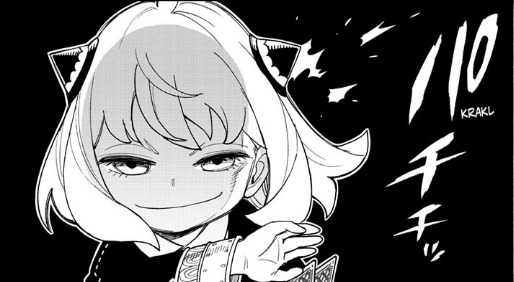
...It's all coming together.
I'm just going to come outright and say it; I had no idea what to write for this review- not because there wasn't anything to discuss, but rather this chapter gave us so much that I didn't know what to focus on first. Chapter forty-two has single-handedly thrown open the doors to a hundred different theories, and believe me when I say that after a whole night of redbull and theorizing I couldn't come up with any clear answers (the folks over at the Strix discord group can attest to that).
So here's what we're gonna do; I'm not going to focus on the chapter itself.
It was cute. Cardshark Anya is hilariously awesome. Damian is a little shit (whom I adore), and the chapters where the kids can just be kids are- in my opinion- the best.
That's all I'm going to say on the matter. For the rest of this review, I want to go over all the facts we know so far about the story and setting. All of the things Endo has been slowly building up in the background and the pieces that we can stitch together from them, starting with this chapter. Two key things stuck out to me.
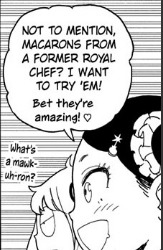
In the entirety of the story up till this point, this is the first time we have heard mention of a royal anything- and not only that, but this chef is a former royal chef. This of course implies that a) said chef was fired (not likely given that Eden wouldn't likely associate with someone who was disgraced like that) or retired, or b) that there is no royalty anymore. Ostania is a totalitarian state and the main power of the government- from what we've seen- lies with the ruling political party, i.e the National Unity Party, a.k.a Desmond's party. Such a political structure would have no room for royalty in a governing capacity, and therein begs the question; is there still a royal/noble class- albeit in a non-governing sense- or was it abolished sometime in the recent past?
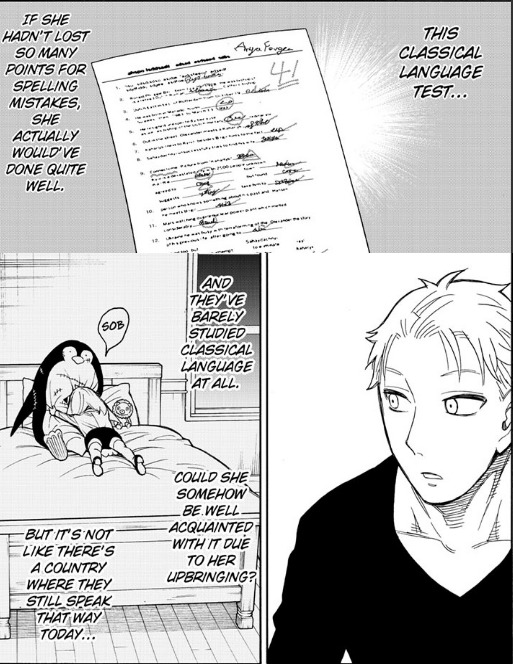
Classical language is not proper speaking and diction like I had originally thought. Classical language is a specific term typically used to describe a dead language or dialect (think Latin, or Hebrew before it was revived). I find this particularly interesting because under no circumstance would a child as young as Anya know anything about a dead language unless- as Loid points out- she was exposed to it as a toddler. It would have had to have been when she was very young, as she herself doesn't realize she knows this information. This would mean she likely learned it from her birth family; Anya was old enough to remember the lab and scientists, meaning she became Subject 007 later on in life- otherwise she would have remembered knowing classical language.
These two concepts are incredibly important to keep in mind, both now and later on as the story progresses. We now know that a royal class plays a factor in the political game that Twilight and everyone else is playing, and we know that Anya knows information that she shouldn't know otherwise (even with her mind-reading powers). So where does that leave us?
Honestly, for the first time...I'm kind of stumped?
Let's look back at the story and see what else we can piece together- maybe there's something in there we can extrapolate for our purposes. Another clue to point us in the direction that Endo is seemingly funneling us towards.
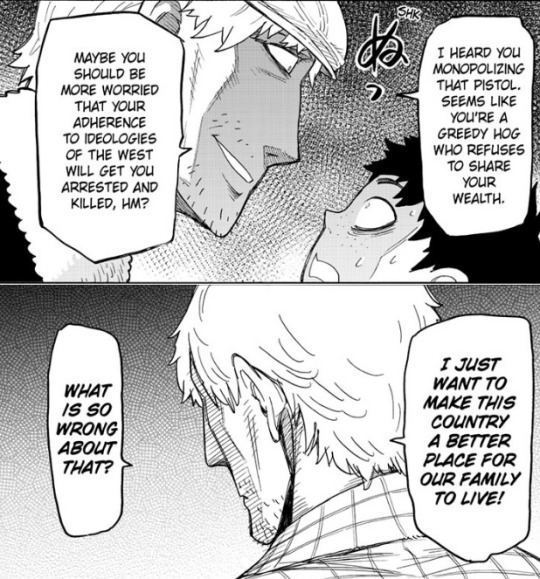
From chapter forty-one
Franklin Perkins was a man who believed in making his country a better place to live. In his eyes and from what he saw, Ostania wasn't going in the right direction- but why? He blames his lack of money for his mother's death, and we see him hold resentment towards the government over socialistic policies. Wealth is something to be shared with others, not hoarded for ones self. That seems to be where Ostania's moral compass is pointing towards, but is that really the case?

From chapter 39
Mr. Green mentions that people have been fleeing to Westalis; from the way he says this it sounds like this is happening currently- not in the past- and people are going so far as to travel through a third country just to get to Westalis. Such a journey isn't without its perils, so anyone attempting to crossover from Ostania would likely be taking a huge risk in doing so. Not only that, but most of what we've seen in the story is Ostanians loathing Westalins...so what would compel people to do this in the first place?
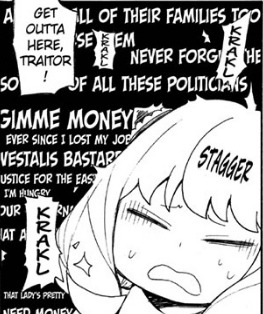
From chapter three
As Anya reads the minds of people gathered at a politcal rally near the start of the manga, we see their disgruntled thoughts behind her. There's multiple mentions of losing jobs and not having enough money- some people are even hungry. Most of these people blame Westalis for their troubles, though not the leader of the rally, ironically.

Also from chapter 3
We find out (and often forget) early on that there are multiple political parties in Ostania. Donovan leads the National Unity Party, whereas the political rally we see here is hosted by the Nationalist Party. The latter preaches peace with the west, but many of the people gathered reject this outright. This is important; the N.U.P is the most successful political party in Ostania, which means a majority of the country's citizens approve of their platform. If we're to assume the Nationalist Party's platform is to advocate for peace with Westalis, then we must also assume that the N.U.P stands for the opposite; direct aggression with the west.
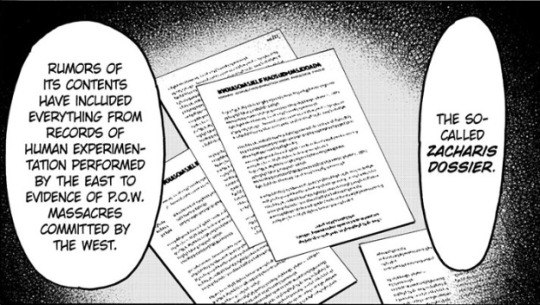
From chapter 31
The Zacharis Dossier, though ultimately a bust, hinted at rumors that have permeated East and West since the start of the cold war. We know for a fact that human experiments did indeed take place in Ostania, so it also stands to reason that there is at least a kernel of truth to the claims of P.O.W (prisoner of war) massacres conducted by the west. It's a heinous crime, and also one that leads to another question; why would any country go through with it in the first place? In addition, piggy-backing off the former point;

From chapter 19
While Loid details Project Apple, he uses the word 'regime' to describe the former Ostanian government. The literal definition of a regime is a government, especially an authoritarian one (Oxfrod Dictionary). I won't highlight all the specifics of what is and isn't authoritarianism, but essentially the point I'm trying to make here is that the current Ostanian administration is still very much a regime. Donovan acts as the authoritarian ruler (or would-be ruler; we don't know if he's actively in charge or is looking to usurp power for himself) and continues on the legacy of the former government.
We know for a fact that this is the case because Anya is only at most 6 years old, likely even younger. That would mean the experiments being run on her had to have been recent, which fits with the time frame that we established at the beginning of this rabbit hole- it also aligns with what we know about what Donovan has been doing on the back end of things. Those who have kept up with my reviews know what I'm talking about; gloom pharmaceuticals, the truth serum, OSO-R, etc. All of that, which then leads us to...

...right back where we started.
So...what then? What can we conclude from all this? At least a few things;
Anya is tied to Desmond- either directly or indirectly.
Anya's past is also Ostania's past; she's familiar with a dead language that's no longer spoken, and there's definitely a reason why no one speaks it anymore.
Ostania is in a period of political and economic turmoil. This also comes on the heels of a (possible) former monarchy, and the struggle of a country willing to embrace authoritarianism so long as it means staying alive.
WISE and Westalis are not innocent in this game of chess with Ostania and the SSS, and more than likely have committed atrocities that may or may not be directly tied to Ostania and- possibly- Anya's past.
And...this is as far as I can go. I've hit a wall, as have other people I've talked to. We're still missing pieces to the puzzle. Endo will of course provide us with more clues and theory fodder as the weeks and months progress, but for now this is as far as I can go on my own. On the one hand I feel defeated because I can't come up with a meaningful explanation for everything and present it in a neat little bundle for you all to read, but on the other hand I'm thoroughly enjoying this. I'm more engaged with this manga and story than any other I've read before; I'm at the edge of my seat every week, and I'm sure most of you are, too. For now, I'll leave the review here. I find it fitting to leave it open ended, just as Endo did with Loid's self-imposed question. Hopefully, like him, we can find answers in the near future.
Also, BONUS...
...No fun panel with a snappy comment this time. Instead, I’m going to humbly ask for your help.
If you have any ideas about where you think the story is going, theories as to how everything fits together, or just really want to discuss the manga with other fans- please check out our forum and share with us. We’d love to hear what you all think; not only that, but a lot more heads makes theorizing both more productive and a whole lot more fun. Check it out if you have the time, or- if you don’t feel like clicking on any links- you can always leave a comment either on this post or send us an ask or message. Anytime, any reason, we’d love to talk SxF.
Again, thanks for reading, and we’ll see you all next chapter!
199 notes
·
View notes
Text
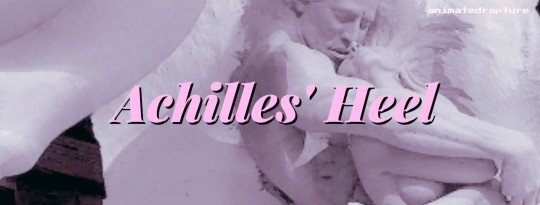

RINTOBER: [ Achilles' Heel ]
word count: 2,222
suna rintarō x reader
tags: ambiguous end, implied major character death, angst, implied sexual intercourse, toxic relationship, detailed pain(?)
song: achilles come down - gang of youths
a/n: HALLOWEEN SPECIAL because... death...?
a HUGE thank you, once again, to my wonderful wife, love of my life, bby @toffees-main 🥺 for proofreading the final piece and preventing me from sounding like a dumbass like, twice. also, thank you to @newfriendjen and @kaitycole for beta-reading the initial draft!

"Rin, Rintarō, I love you!" You shouted from the bleachers; a proud smile decorating your features as you cheered for him right after he'd hit the ball to the other side of the net, securing EJP Raijin another point—so close to winning.
His gaze and yours were two opposites of a pole with a pull unparalleled—a pull science can only wish to decipher. He finds you as he rotates through the set up and there's a beam in his eyes, making him break out into a grin you just know he couldn't find it in himself to reserve for later.
That day, that match—Suna Rintarō was named the MVP of the game. He owed it all to you and the swell of his heart with each cheer he heard from you; your voice distinct as if it were the only one that mattered in that whole gymnasium. Perhaps, at least that time, you truly were all that mattered to him.
But not anymore.
The first—the first was the lack of replies, the dryer replies. I love you's met with Love you's and very little effort to hide the lack of sincerity beneath. It began through texts until it was the quick, snipped tone laced with the parsimonious manner he answered you. The act of it was much like an attempt to deprive you of water until you're but withering rose in his grasp that he would rather replace than try to plant again and save.
Just how long were you willing to go without the water you needed to stay alive?
"Rin, love, I'll prepare dinner for us tonight, come home early, okay? I'm cooking your favorite!"
"I'll try," was his reply as you watched each of his hasty movements through your shared bedroom.
"I prepared you a bento, too. It's on the kitchen counter," you continued as he attempted to ignore the way you looked at him similar to the way you look when you're lost and searching for something. He hums in response, and just as he was about to reach for the door, you call out to him, "Rin, where's my goodbye kiss?" in the usual tone you would pull back then when he would forget and pepper you with kisses in retaliation, offering an apology before heading out.
He looks back at you with exasperation, "I'm late, Y/N." He doesn't wait for you to answer before he has the door shut close.
That's how you know he also forgot the food you prepared on the kitchen counter.
Foolishly, the answer to the question was that you were willing to wait until your next life for his love to drown you into bliss again. It's that answer that's disrespectful to the mystery of reincarnation—but you're everything Suna Rintarō wanted you to be; that is, if it was a fool he wanted you to be, you would play the part better than any award winning actor to have ever lived could. Even if it was a miscreant he wanted you to be, some sort of heretic to the laws of the world and the conditions of love. You'd be everything he asked of you. After all, who were you if not his other half?
Who were you if not water to shape into whatever container he put you in, right?
The second—the second was the lies that slipped past such sinful crimson lips. Oh, by the heavens, as if the lack of fondness in the timbre of his voice as he spoke to you wasn't enough to put cracks to the cemented foundation of you and him. Cruel, it's so cruel—you wonder if you're lacking somewhere, have you changed? Are you no longer diamond in the sea of glitter—? Worth not of his time nor the beating of the caged heart you thought you've acquired?
Now when he speaks, even the very sound of his voice reverberates like a sharp spear piercing through your chest without mercy—as if you're Spartan in the Battle of Thermopylae. The lies that come along with them about how training ended late again, or that he's travelling for a match again—Huh? No, you don't have to come, Y/N. I need to focus.
Did he have to lie about who he's with, what he's been doing? It's laughable. As if you wouldn't kiss away the taste of anything that lingered in his lips, if it was blood, alcohol or the lips of another girl. Rintarō, did he not know you enough to know you would surrender to his will no matter what mud followed his footsteps?
Ah, but, what would admitting such things do to his pride? Maybe it's that—or maybe he liked the way the lies were like lemon and salt to a fresh wound. You think, you never thought you could be so masochistic.
Third—the third is the sharpness of his gaze. It's the same gaze, same pair of eyes you've loved for such a long time and you fail not to love to this very moment. You're softer than clouds but now most hollow in comparison to the unacquirable stars among the cosmos—you think they're there but they're just a burst of light, something that has probably died lightyears ago.
It's like chokehold, the fourth—the fourth is like chokehold and he, the assassin. Ruthless—he's ruthless when he looks at you as you're not more than a tedious chore to him and the ring on your finger held no promise of relentless love greater than what a deity could offer.
Foolish—you're foolish. Delusion is a coping mechanism to the ones whose realities have been robbed in front of them—delusion is what you're supposed to call it when you fill your head with all the excuses and all the things you tell yourself have to change. You used to be a masterpiece. A masterpiece to him; as though you're Holy Grail found in a gallery of things that could never begin to hope they would ever amount to you.
Delusion is ignoring the liquor in his lips, the intoxicating smell of his cologne mixed with alcohol and cigarette smoke. You're confused and your reality that seems to have been distorting more often than usual. You question the strings that premeditate fate when it's you feeling the drunkenness and hangover the next day when it should be Suna and the tabloids of "Suna Rintarō spotted in yet another bar." You wonder if each sunset and sunrise you watched with Suna was a mere fever dream when it's you who vomits on the toilet. You, who sobs on the bathroom floor.
"Sfumato," your friend tells you, "The gentle blurring of edges to make rendered objects appear as one with their environment." The edges blur when you call that delusion as love—you only have to wait long enough before both are truly one and the same. The pain disguised as martyr sacrifice to the greatest allegory of love to exist. This is what you're told. They say, "Y/N, you've confused love with delusion," and yet you don't listen.
You don't listen most of all when you're back underneath him but you feel like you're being bloodied all over, stained like wine to a white dress. Yet you allow yourself to indulge in the kisses he's abated you of, you revel in each time you ask him to tell you he loves you and he finally does as he luxuriates you of your desires and of your whines for love—nevermind that he was doing it for himself. After all, it is as the word suggests, a luxury.
Suna Rintarō had become a luxury you couldn't afford, therefore, he did not have any business of giving himself to you. Not unless he wanted to.
Is there such thing as a free reign over the heart of someone? Hand it over as they will but how long would they truly allow you to borrow it—? Borrow it because one never truly surrenders such a vital thing to human functioning. Yes, you are and you have been delusional to believe so.
"You own the entirety of my heart, Y/N," you're unsure whenever it echoes in your head. He brings you enough torture, why must your own brain create such clamor in your head. Was such pain necessary? Is pain to love much like Adam's rib to Eve?
"It's a promise ring, bunny," he said as he tucked your hair behind your ears—his gaze is intense, almost like you would disappear from his sight if he looked at anywhere or anything but you.
You stared at the ring that shone under the light of the restaurant, your vision blurring at the tears welling from your eyes and you try your best to choke in the sob that involuntarily escapes you.
"Hey, Y/N, what are you cryin' for?" He questioned with a chuckle, looking at you with amusement dancing in his eyes while his thumbs reached out to wipe away each tear that betrayed you—falling down your cheeks as he cupped your face.
"I-it's nothing, I—I'm just happy, love," you answer him through your tears.
There's a smile playing across his lips, he tells you, "'m just making a promise that I'll marry you one day, bunny, is all."
You nodded eagerly with a wide smile even as the tears that left you continued to fall, "I'm making a promise to say yes, Rin. No matter what," you answered him through your sobs, wrapping your arms around his neck.
"Guess I should start practicing to get on one knee then, yeah?" He laughed as he pulled you closer, his arms around you, you giggled along with him—it felt like you were molded together to form one perfect piece, like the act of staying there for all of eternity, in each other's arms, would turn you into one. Entangled together in all the right ways—as if Rapture has befallen the Earth and that was your final state as did the universe.
The fifth—the fifth is the screaming, the fights. Who would have thought you would break like a mere twig stepped on in the darkest forest on this Earth? It was under his shoe did you break from; each word that left his mouth was scathing—they didn't feel like a stab or pins and needles to the human heart, they felt like burns of acid that slowly ate at your decaying soul, breaking heart, dwindling sanity.
"I don't get it, Rin! Why do you treat me like this?!" You screamed through your tears, your chest heaving as your lungs tried its best to support you, even when it's already been punctured by the shattered pieces of your heart that continued to beat in separate shards, digging further into your lungs, damaging your ribcage, piercing your throat.
"Please, God, just tell me what to do—Rintarō, tell me what I need to do to turn us back to the way we were, please," you begged, falling to your knees and you let the shattered items on the floor puncture your skin. You felt numb yet your whole body was buzzing. The pain from the pieces of glass from under you doesn't register in your brain because all you can feel is the pain that was spreading from your chest and out into your whole body.
Under his mercy had he turned you inside out and greedily taken every part of you—everything you surrendered on your own volition until you were nothing, not even a shell of yourself but more like a ghost floating through the air. It looked like a battlefield—and perhaps it was. Love was never something you come out alive from. Love was greedy, selfish, treacherous. Love is like an assailant you allowed to enter in the safety of your own home.
"Don't you get it? Y/N, I don't love you anymore!"
No. You think, no. No, it repeats in your head, over and over. Denial. You were in denial, at this conjecture, you were aware of even this.
"I stopped loving you long ago, Y/N. You were dumb enough to stay." Has he always been this truculent towards you? You wonder but you can't recall anything else but the echoing of his words. Words he used like a champion of the battlefield, liberating away the life of his enemies.
No. Don't say that. You don't mean it. No.
Suna thought you would be the arrow to his heel—the one to bring him to his knees in the most torturous of ways. In reality, maybe you were more his heel than the arrow. He was both Achilles and his actions, the arrow that brought him to his own demise.
Sixth—the sixth was sickening grief. You're so unfair. You're so selfish. How could you run away from him, only to scream his name and the tormenting shout of "I love you" that haunted him awake or in his slumber. How could you be so cruel? To let him fall to his knees in front you the way you made him to. Ruthless—you're so ruthless. The pain was the excruciating kind, crashing towards him like ocean waves bringing him farther from the shore and near to wherever you were now. How could you leave him like you did?
After all, what was he if there wasn't you?

📞 violet is calling... all content featured belongs to ©️ animatedrapture. do not plagiarize, repost, or modify.

#RINTOBER#suna rintarou#suna x reader#suna rintaro x reader#suna#rintarou suna#haikyuu x reader#haikyuu imagines#;cloud#haikyuu angst#suna angst#suna rintaro x you#suna rintaro x y/n#suna rintaro imagine#suna rintarou x reader
495 notes
·
View notes
Text
MORE FG Analysis....(I think I might have a problem)
I keep rewatching and rewatching the Clover and Qrow scenes we have so far and trying to see the bromance thing or the platonic buddies thing and I just... can’t?
Look, I don’t run around with shipping goggles on if that means anything to anyone. I got through the entirety of The Lord of the Rings and the first two Hobbit movies without shipping a single couple (Martin Freeman and Richard Armitage punched me in the heart in the third Hobbit film, but that’s another tangent for another time). I wasn’t even fully on Bumblby until volume 4.
There’s just no other way to view these scenes. Things keep escalating between these two. I don’t really have a good scale for measuring romantic/sexual tension, so I’ll just try to pinpoint the moments in which things tick up a notch or two. Starting with...
The Mine Scene
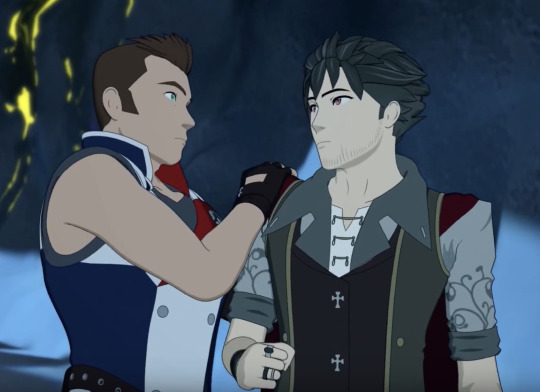
The baseline here is the casual conversation that Qrow initiates. From there, here are the beats:
Conversation turns personal very quickly, thanks to Qrow opening up
Clover catches Qrow
They engage the Grimm
Qrow warns Clover
Qrow shares his semblance (again... Qrow is the one to get personal, which I find extremely telling)
Clover shares his semblance (and puts Qrow at ease)
Clover flirts (look, I’m trying to be as objective atm as possible, but the wink, the smile, the eyebrow wiggle, the full-body lean, and the lingering stare as he turns around... I’m sorry, there’s no other word for that. I challenge anyone of you to replace Qrow with a woman, show it to someone who doesn’t watch RWBY, ask what the tone of this still-shot is, and find me a single person who will tell you it’s not romantically charged. I dare you.)
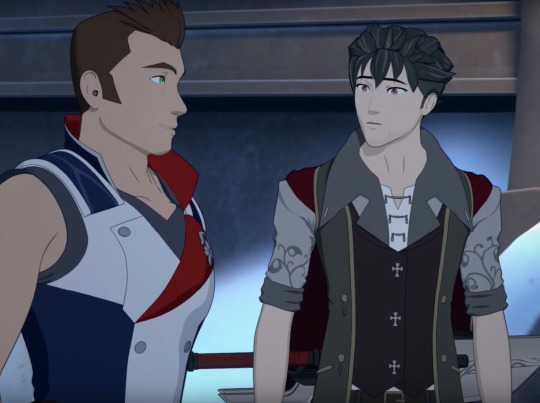
Qrow stares back (this is absolutely from a myriad of emotions running through him and I will not discount that, but can we all at least admit that he seems to come out of this shock in a pretty okay place?)
They reach the main cavern and... more flirting/showing off from Clover. (The toss, the smirk, the salute, and the fancy-ass backflip which, considering he hooks Kingfisher to the ceiling and goes zipping upwards directly after this (thank you @fairgame-is-endgame) was completely unnecessary.)
The joke! How did I miss this?? Qrow doesn’t joke about their semblances for the first time at Schnee manor. He does it here! (Sorry, I couldn’t get the dialogue in there with Qrow’s eyes open.)
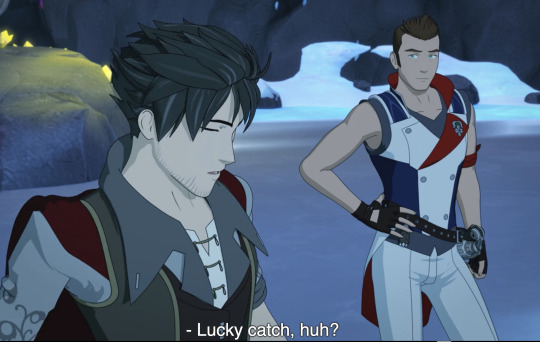
Clover counters with: “Hmm. No. I’d chalk that one up to talent.” (Already highlighting the difference between their attitudes regarding their semblances. For Qrow, everything bad that happens is his fault. For Clover, semblance isn’t everything. A very healthy person for Qrow to be around, no?)
The Truck Scene
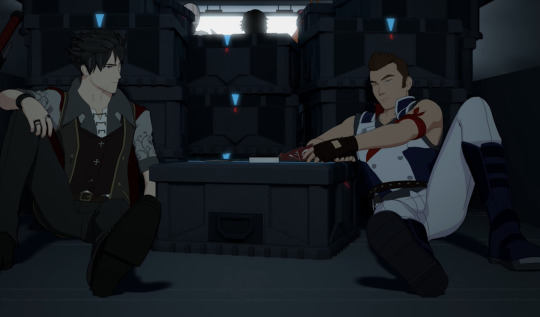
Now we shift to the truck scene. Again, trying to pinpoint the beats where the romantic tension clicks up or something significant happens:
Clover initiates conversation. (Apparently, him mentioning Ruby is enough to put people on edge, but might I point out a few things? (Jesus lord, this is turning into another essay.) He brings up Ruby as “[Qrow’s] niece”, first of all. And that’s it. You know where he shifts the focus from there? On to Qrow. This is Clover’s next line in this exchange: “It’s a good thing they had someone to look up to and get them through it. Not everyone is so lucky.” Real nefarious there, guys. Way to have Master Spy Clover probe for info. Oh, don’t get me wrong. Clover is absolutely probing here but it’s for another reason entirely.)
Qrow shifts from being closed off and a little taciturn to making sure the conversation doesn’t drop. (He thanks Clover in case anyone wants me to be specific about that).
Qrow gets personal. Again. He opens up about being an alcoholic.
And the peak of this scene? Clover calls Qrow on his self-deprecating habits and tries to offer him something solid and good to hold on to. Which I and others have written about ad nauseum, to the point where repeating myself is getting annoying, so have some visual aids instead:
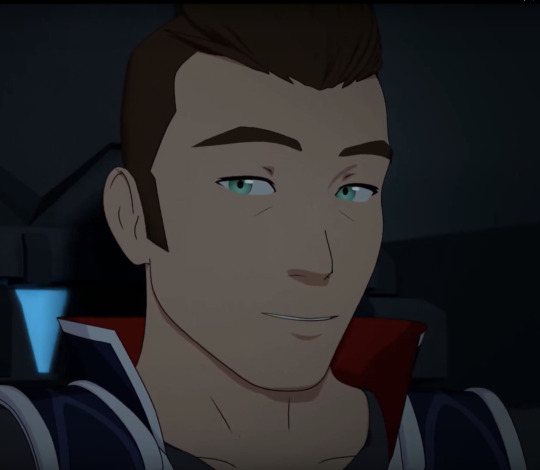
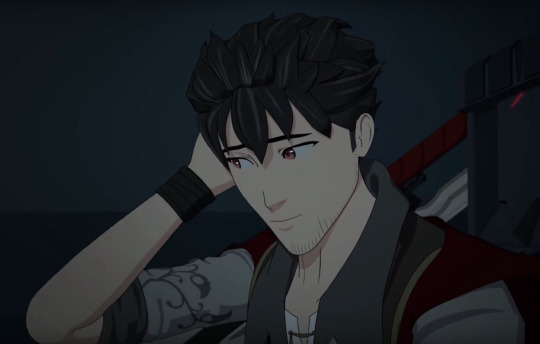
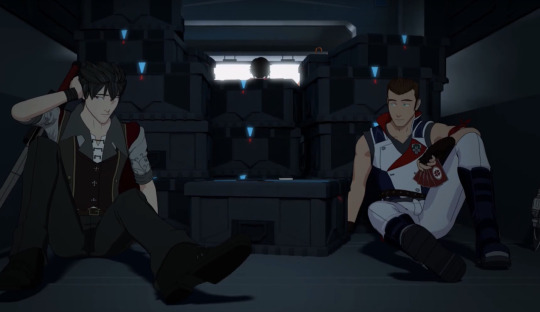
James’s Office
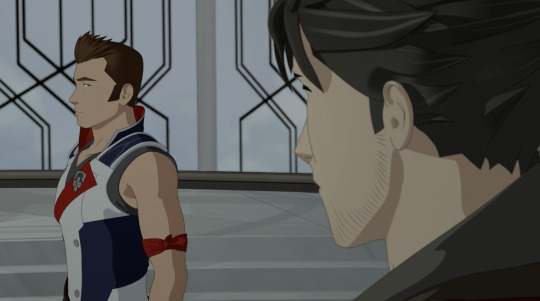
Non-verbal communication. Here, surrounded by people that both Clover and Qrow know better than they know each other at this point, and their first instinct in this moment is still to seek each other out. Enough said.
Schnee Manor
The second inside joke between them about their semblances.
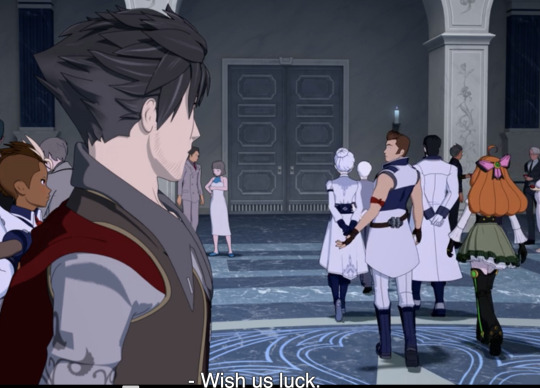
Qrow flirts openly. Similar to Clover’s “You’ve had more of an effect on them than you realize” line delivery here, Qrow’s “I mean, they already invited you, didn’t they?” carries a very specific and multilayered tone. He’s playful, he’s open, he’s relaxed, he’s enjoying himself, and yes, the man is flirting. It’s in the voice, it’s in the smile, it’s in the body language. And it is absolutely in the lingering stare as Clover walks through the door (a mirror of Clover’s lingering stare in the mines, btw).
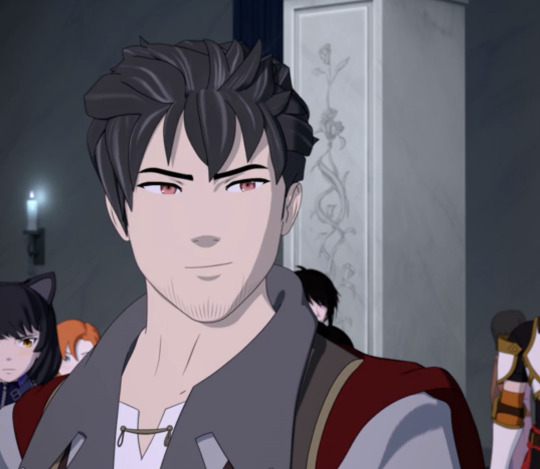
Final thoughts/speculation
Does anyone want them? You’re gonna get ‘em.
I think the fact that Qrow is the one who gets personal when he has every damn reason right now to be guarded is ridiculously significant. In the last two volumes before this, his sister tried to have him murdered, a long-trusted colleague (Lionheart) turned out to be a traitor, and Oz was revealed to be a massive liar (I love Oz, I really do, but the man screwed up). Qrow has no reason to drop his walls for just anyone so you know what this tells me? He’s interested in Clover from the beginning. Qrow’s early-stage flirting style isn’t to wink and show-off (at least not anymore), it’s to lower his guard and see how the other person responds. I think he’s gotten to the point of “if you can’t deal with my ugly shit, you won’t be getting the rest of me either”. Qrow Branwen is doing a little probing of his own and, in light of this, you could make the argument that he’s the one to open the door for their relationship to happen.
Clover’s early-stage flirting style, on the other hand, is very overt. He���s more guarded about himself personally (notice how he keeps the focus on Qrow quite a bit and even does a bit of deflecting of his own in the truck scene) but he is perfectly comfortable with making his interest known in a very straightforward and physical manner.
There are reasons for this!! Reasons deeply intertwined with character and who these men are.
Qrow sees himself as the eternal monkey wrench that no one wants. He’s finally starting to recover from this viewpoint, I think, but he’s also very aware that no matter how healthy he might get, he is always going to come with a little... extra. He has his semblance, he has his depression, and he has his alcoholism. He’s tired of secrets and he’s tired of games, and if he’s going to get involved with someone, they sure as hell better be ready to deal with all of that, because it’s not going anywhere. The solution? Put it all out there and see how the person responds. He gets the wrong response, he’s going to shut that down and move on. The right response?? He’s going to keep moving forward to see where it goes. Clover is giving him all the right responses.
As for Clover, he’s not only military but he’s also the leader of the elite Ace Ops and the man with the good-luck semblance. I know we don’t have a lot on him, but I suspect that the pressures of all that get to him quite a lot, to the point where he has major trouble being personally vulnerable for anyone. He’s probably used to having to keep it together at all times, to presenting that tightly controlled professionalism he displays with Robyn and even with Jacques Schnee to a degree. He’s used to everyone else relying on him, including James. This means that even in the presence of mutual interest, he’s going to flirt in ways that are emotionally safe, at least at first.
The balance inherent in this is so unbelievably beautiful. And, I’m starting to realize, a complete subversion of early expectations.
Qrow isn’t the one who has to learn to open up. He’s already doing that. What he will have to do is learn to accept someone (outside of his nieces) loving him without strings attached. He’ll have to learn to trust that Clover (and by extension their relationship) isn’t going anywhere, even if/when things get bad. Clover can be the one who stays.
Clover, on the other hand, is the one who is going to have to learn to open up. He’s going to have to learn how to return that emotional vulnerability that Qrow has already given him, and he’s going to have to learn that Qrow can be the safe place where all that confidence and self-control can finally drop. Clover might have to be the unshakeable support structure for everyone else in his life, but Qrow can be the one place where he can lean and just breathe.
#fair game#qrow branwen#clover ebi#fairgame#lucky charms#luckbirds#qrover#rwby#rwby7#if this doesn't happen it will be the missed opportunity of the millineum#let me tell you what#another essay#i can't help myself#i start with one thought and my brain tosses out fifty more that are relevant#probably the analysis i'm most proud of so far
561 notes
·
View notes
Text
i know their names, i carry their blood too
originally posted: august 13th, 2018
word count: 19,681 words
rated: teen
beatrice snicket, lemony snicket
family, angst with a happy ending, VFD, assorted original vfd characters, assorted canon characters repeatedly mentioned, one small girl going through a lot of unpleasantness, most of the time by herself, attempted kidnapping (legit vfd recruitment in action), also one small girl trying to avoid a decent amount of trauma and loss
summary: A man has come back to the city. Beatrice Baudelaire, eight years old and miles away, is trying to find him.
opening notes:
this fic relies pretty heavily on the beatrice letters, and there are a few references and one code that will make a lot more sense if you’ve read all the wrong questions and the unauthorized autobiography!
title from the crooked kind by radical face
.
Beatrice learns early on, at seven and with a bare ankle because they said they don’t require the tattoo anymore, that if she turns the doorknob slowly and lifts it up at the same time, her bedroom door doesn’t stick when it opens. At eight, she learns if she stays close to the hallway wall, avoids the places where the floor groans under her feet, especially in the spot in front of the chaperone’s room, then she can make it in absolute silence to the staircase. The stairs are trickier—most of the steps have warped over time—so she wraps her hands tight around the banister and inches along the edge until she stretches out a tentative foot and finds the smooth carpet of the ground floor rug under her socks.
At almost one in the morning, everything, every overstuffed armchair and faded green wall and well-stocked pantry, is smothered in black shadows. Beatrice doesn’t mind. She can still find her way around. She had walked around for a week with her eyes closed to prove a point a few months ago. (The point was that she could tell anyone by their footsteps, which she could. The result was that she could navigate the entirety of headquarters in the middle of the night. She knows every creak in every floorboard and what everyone’s shoes sound like now.)
A proper adult might ask her if she’d like a light on so she can see a little easier at one in the morning. A proper adult would probably think she’d be afraid of the dark, after everything that happened. Then again, a proper adult would probably not have put her in this situation to begin with. She’s not entirely sure. She’s only known a few proper adults in her life, or people older and taller than her to the point she considered them adults. She hopes she’ll know at least one more.
From the report a volunteer smuggled to her during dinner in the mashed potatoes—and from the confirmation from another volunteer during dessert, waving his spoon through the air at her—and from the further confirmation from the chaperones standing in a corner with their heads together and mumbling not very quietly at all—a man was seen. Far away, on the thirteenth floor of one of the nine dreariest buildings in the city. A man they tell stories about, a man no one seems to know for sure, a man who might be a detective, or has had that printed on an office door at one point or another. A man who hasn’t been seen in a long, long time.
“That’s him,” Beatrice had said.
“How do you know?” a volunteer had asked. “You’ve never seen him either.”
Beatrice hasn’t, but she thinks she’s allowed to make an educated guess here. A niece should know her own uncle, even by rumors. And she knows him like she knows the back of her hand, or the floorboard underneath her bed she stashes the picture and the ring under, or the books she’s read in the middle of the night when she was supposed to be asleep, the ones they tried to hide from her so she couldn’t read his name. She knows.
(One of the older chaperones told her—or muttered disparagingly in her direction after Beatrice asked the same question for a whole hour one day, because no one would give her a straight answer—that she has the analytical eyes of her mother and the stubborn streak of her namesake and the brazen attitude of her uncle. Another one told her later, a little more kindly, that she looks like her father when she reads, quiet and studious. So, she knows.)
Her backpack is a heavy weight on her back as she creeps through the downstairs rooms, her shoes gripped in one hand and a letter almost crumpled tight in the other. She’d written it after dinner, tucked away in a corner of a room that no one ever looked in (the bathroom closet, of course), the typewriter across her lap and the news still fresh in her mind. She tapped her fingers against the keys. How should she address the letter? Because she’d have to send a letter. It was only polite, after all. But calling him uncle outright might be a little too much, a little too soon. Dear, she typed, for a start. Dear—physically distant relative? Closest living relative? The person she had to find, because he could help her find the people most important to her? This had to be perfect, and Beatrice knew it would be, but she still had to think—
Dear Sir, she settled on, with a small, pleased smile.
That was when she’d heard the voices from outside in the hall, filtering through the bathroom door.
“This can’t be good news,” said a chaperone Beatrice never liked. “He’s a wanted criminal, isn’t he? And I heard he was responsible for that other fire a few years ago, too. What if he comes here?”
“How can we trust someone like him?” said another one that Beatrice had almost respected until that moment.
“It’s probably not even him,” said a third voice. “There’s been too many people with his initials showing up over the years. With any luck, he’s dead and gone.”
Beatrice frowned, mostly in anger, because that was such an awful, rude thing to say about someone. She knew it was him. There was no way it couldn’t be. But the chaperones had a point about the initials, and it made her think of something else. In case the letter went astray, because the mail could be so unreliable, especially so far from the city, she should preface it with something, shouldn’t she?
I have no way of knowing if this letter will reach you, as the distance between us is so very far and so very troublesome, she’d written, proud at how professional she sounded. And even if this letter does reach you, I am not sure it will reach the right person. Perhaps you are not who I think you are.
But she’d learned one important thing here, and that was that you had to be certain, because you might be wrong. So at the end of the day, it was merely a pretense, a formality. There was nothing she didn’t know for sure, because she was certain.
My name is Beatrice Baudelaire, she typed, with a fierce determination and her head held high. I am searching for my family. Then she’d known that she was going to leave.
Beatrice squints up at the grandfather clock in the corner of the main room, trying to see the time through the shadows. If she cuts it too close she’ll run into the chaperones doing their middle-of-the-night check on the neophytes. She has to be out of the building before it comes to that. The ground floor of headquarters is silent as a grave right now, as dark as one too, and she steps close to the couch where the floor won’t talk back to her as she makes her way to the heavy ivory front door, washed grey in the dark.
She knows from experience—from carefully watching and listening—that the door is locked (silver, outdated, the kind from the old hardware manuals Beatrice has extensively studied in the dead of night) from the outside, the volunteer who locks it then running up the fire escape and back inside through an upstairs window. But the quickest way out is always the easiest way in. She puts on her shoes and takes off her backpack, unzips the latter as slow as she can, and feels around for the thin red ribbon.
She shifts her hair, shoulder-length and blonde with a curl at the very end, away from her face, and ties it back securely with the ribbon.
An older volunteer had given her a lock pick the previous week after Beatrice helped her solve a word game—there’s no way she would’ve been able to get one otherwise. The chaperones almost always seem to know when someone’s doing something they shouldn’t, considering how much else they miss. Beatrice takes it out and gets to work, moving quickly and quietly, listening for the barely audible tick when one of the tumblers releases. One of the chaperones laughs upstairs, a disembodied thing in the darkness, and Beatrice grips the tools harder so she doesn’t jump and drop them.
The lock clicks sharply, the door easing open with a heavy creak. Beatrice freezes in place, straining her ears, her breath still in her throat. She’s sure someone had to hear that.
Something creaks upstairs.
The floorboard outside the chaperone’s door.
Beatrice snatches up her bag, squeezes herself through the gap and outside, and pulls the door shut behind her. She runs down the stone steps two at a time and doesn’t look back.
Ten blocks away, when she’s sure no one is looking, Beatrice drops the folded letter into a public mailbox.
The only train out of town leaves at five in the morning. Beatrice gets to the station with plenty of time to spare, and easily memorizes the route she’ll have to take to get to the city. It’s a long one, so she sits down on one of the benches and counts out her change. She digs the ring out of her bag, the heirloom from the island Sunny had given her that Beatrice had hid from the chaperones, and tries it on different fingers until it stays and doesn’t slide. Then she waits, tracing the low ceiling beams with her eyes, swinging her legs back and forth.
She knows just what he’ll be like. Not too tall, keeps to himself, intelligent. Sensible, maybe a little tentative, a little worried. His books made it sound like he’d been through a lot, after all. But she’s not too concerned about that. He’ll talk to her, because she’s his niece, and she’s read everything he’s written, and they have a good deal in common. They both like big words, long books, and could take or leave the sea.
She has one picture of him, of the side of his back and a corner of his face and one hand, or the side of the back and the corner of a face and the one hand of a man Violet and Klaus didn’t know, but a man Beatrice knew couldn’t be anyone else. There were three other people in the photograph—the uncle she’ll never meet, and the Baudelaire parents.
Beatrice hadn’t meant to take the photograph. It was their photograph, Violet and Klaus and Sunny’s, the last thing they had of their parents. But she thought it might be the only glimpse she’d get of her uncle, especially when she’d only known about Jacques, so she would sneak it out of Klaus’s commonplace book when he wasn’t looking. She’d wonder who the other man was, since that was before she knew. And she’d meant to put it back, but—but there hadn’t been time.
Violet and Klaus told her her mother had blue eyes, and so did Jacques, and she has them too, so she knows she’ll see the same shade of blue in his eyes, another link between the two of them. Excitement flutters around inside of her like a million wonderful butterflies, and she can’t help but smile. Not only is she going to find the family she lost, she’s going to find the family she didn’t even know she still had until a few months before. Beatrice can’t think of anything luckier.
There’s not too many people on the train when it comes into the station, so Beatrice picks a windowseat all to herself, pressing herself close so she can see everything passing by. She doesn’t want to miss a single thing. She swings her legs again, heels kicking the seat, and waits for the train to start moving.
“Aren’t you a little young to be traveling alone?” the woman across the aisle asks. She lowers yesterday’s evening edition newspaper and gives Beatrice a pointed stare behind her thick-framed glasses.
“No,” Beatrice says.
“You seem a little young,” the woman continues.
“I’m short for my age,” Beatrice says.
The woman gives her another look, specifically at her feet, and then looks back up at Beatrice with a raised eyebrow. She ruffles her newspaper imperiously and disappears behind it again.
Beatrice swallows, her shoulders pulling in. She makes a point to stop swinging her legs and sits up straighter. She keeps at it, even when the woman gets off at the next station and she’s by herself on the train.
She doesn’t remember falling asleep, but she jolts awake at a flash of light across her face. It flickers jagged on her hands, lighting up the seat beneath her, bright and blinding white. She looks around frantically, expecting to see rain and bending wood, to hear the roar of crashing waves, before she remembers she’s still on the train. There’s no lightning on a train. It’s just the sun streaming in from the window. She watches with wide eyes as it creates patterns on her arms and her dress, then tears her gaze away and stares hard at the faraway houses outside the window instead, clutching her bag in her lap. Beatrice thinks of big words (pietrisycamollaviadelrechiotemexity surely counts as a word, and she spends ten minutes testing out pronunciations), long books (Anna Karenina is long, and she can probably still read it even though she already knows the central theme), and anything but the sea, until her hands loosen and her shoulders drop and the sun is high enough that she can’t see it.
Beatrice had first found his name buried in old reports, in thirteen files jammed into the back of a drawer, down in the basement at headquarters when someone had asked her to find a flashlight. She found a bat instead, clinging to the rafters, and it blinked at her with big, black eyes. Beatrice blinked back, because she knew all about all kinds of animals, especially the ones the organization trained, and she didn’t mind bats. Then it fluttered down on top of an old filing cabinet in the corner.
Beatrice wandered over and picked out faded letters that spelled Baudelaire on the front. Eager, because no one at headquarters would talk to her about Violet or Klaus or Sunny, or answer her questions about where they might be, she yanked it open and found files and files with a distinct cursive signature ending each one—Lemony Snicket. And her stomach had twisted up tight, because she could hear Klaus like he was standing right behind her, telling her the name Kit Snicket.
Kit Snicket, Beatrice had echoed.
That’s right, Klaus had said, smiling. She was your mother.
Beatrice knew all about her mother. Violet and Klaus and Sunny had told her her mother was a good person, a volunteer, someone who had helped them, and they had helped her. That was how Beatrice was born. And she knew all about Jacques, because they’d said the same thing about him. But they’d never mentioned a Lemony. She knew better than to think he was her father, because she knew her father’s name, too. Dewey Denouement. They’d said his name only once, and she’d repeated it over and over again to herself. Beatrice didn’t know who this was.
She read through them all in the dead of night so no one would bother her, because Beatrice knew they were watching her, closer than they watched the other neophytes. She tried to find the four volumes she’d found hints at in other files, although she never managed to pin them down. But the thirteen files told her enough. They confirmed that Violet and Klaus and Sunny were still out there somewhere, just like she thought. They confirmed their stories, although with other details they hadn’t said or had relayed differently—but Beatrice had never doubted what they’d told her to begin with.
And they confirmed that Lemony Snicket was her uncle, and he was alive.
All of Beatrice’s hopes became real, became fact. There was someone else out there, someone who could help her. Someone who was family. Someone who could help her find Violet and Klaus and Sunny. Someone who knew the whole story too.
So then she just had to wait. She had to wait, and learn, and sit through someone telling her how to make a meringue when she knew full well how to make a meringue, and how to pick a lock and how to define a word and the right way to escape a burning building. She had to keep waiting until the right moment came and she could leave and try to find him, try to find them all. And Beatrice would know when it was. She was Beatrice Baudelaire, after all. She knew everything now.
Beatrice spends three weeks switching trains, eating greasy sandwiches from the vendors hanging around in the old, dingy train stations. Sunny wouldn’t like any of the sandwiches at all, but Beatrice has to make do with what she can. No one talks to her, so she doesn’t get a chance to try out any of the other things she’d thought to say after she spoke to that woman. I’m visiting a relative. I’m in a special program. Didn’t anyone ever tell you not to talk to strangers? She’s a little bummed about that, because she practiced the perfect eyebrow raise in the hand mirror she took from one of the chaperones, but it’s really for the best. She doesn’t need to be sidetracked.
Instead, she listens to how the trains sound smoother and sleeker closer to the city, watches how the stations get more impressive. She takes pamphlets from each station until she has a neat collection detailing train mechanics, local restaurants, and sometimes, if she finds one, the smallest books she’s ever seen. Beatrice sits in the hard station seats and flips through them while she waits for her train to come in. Mostly they’re books she’s read before, but she thinks they’re cute, being so tiny. She’ll show them to Violet and Klaus and Sunny, and her uncle, too. She knows they’ll enjoy them.
A voice mumbles indistinct static over the loudspeaker. Beatrice finishes her sandwich, puts the latest brochure in her bag, and gets on the next train.
The train station in the city is enormous, bigger than headquarters. It certainly looks as old as headquarters, but a little more distinguished, with a solid white floor and an endlessly high ceiling. Beatrice would be able to appreciate it more, she thinks, if there wasn’t so many people, all bustling past in a flurry of suitcases and elbows. None of them spare her a second glance, not even when she climbs up on top of one of the curved benches for a better view of the entire station.
Whenever Violet couldn’t figure out how to fix an invention, or Klaus couldn’t figure out the meaning of a sentence, or Sunny couldn’t figure out how to change a recipe, they would take it apart and look at each individual component before continuing. The same principle works for a city, Beatrice figures. A city is just a collection of streets, one right after the other, and all of them go somewhere. It’s not too hard to find out where, especially when you have the right map.
She finally spots the map display, drops back onto the floor, and goes and grabs every single map available. She squeezes her way through the crowd mobbing around the exit and emerges out on the city street into a sudden deluge of bright lights and noise. Beatrice blinks until it all evens out, all the traffic lights and towering buildings and the people, hundreds and hundreds more of them. She swallows, presses herself against the outside wall, and takes a moment to watch everything.
It’s strange. The ocean was vast, and they rarely ran into anyone out there, and headquarters, tucked away in a small town miles from the sea, had only about twenty neophytes and a handful of teachers and chaperones. But the city is full of jostling bodies and constant sound, like the whole world rushing around her, a storm that doesn’t stop. Beatrice thinks she might be scared, if she wasn’t so systematic about it. You can’t be scared if you know everything. It’s just different, is all it is. She reminds herself to breathe and thinks it’s just different.
Beatrice spreads the maps out in the park across the street, holding the edges down with rocks so they don’t blow away when the breeze kicks up. Everything is marked on the maps, every street and building and corner store, and even the best places to see certain birds. One map includes Nine Dreary Buildings to Avoid on Your Lunch Break, which is absurdly specific but exactly what she needs, and Beatrice hunts them all down with a careful eye and a black pen. All nine buildings are within a few blocks of each other, clustered in the center of the city. She’ll have to go through all of them, just to be sure. Klaus taught her it was good to be thorough. She puts the rest of the maps away and starts looking.
The first two buildings are too short to have a thirteenth floor. The third building looks like it was condemned years ago and no one bothered to do anything with it. The fourth building has so many floors that Beatrice loses track when she stands on the sidewalk and tilts her head back to try and count, and she looks through the directory inside the doors but doesn’t see any mention of her uncle’s name (or a pseudonym, or an anagram, or even just a suspicious blank space).
The walk to the fifth building takes the longest, because Beatrice has to find a path around the construction being done on seventh street, and takes ten minutes to wrestle with the map and figure out which street she’s on when she winds up in a dark alley with a lot of cigarette butts and one very noisy pigeon who tries to steal her map. The sixth building has the suspicious blank space on the directory, but it’s on the fifteenth floor. The seventh and eighth buildings, when she manages to find them, were mislabeled and wind up being two different diners, one of them even across from a completely different train station. Beatrice admits that they’re still pretty dreary-looking and uncomfortable, especially the latter one. She certainly wouldn’t want to eat at a place called The Hemlock Tearoom and Stationary Shop. That’s just tempting fate a little too much.
The ninth building proclaims itself to be the Rhetorical Building in faded but still distinct black print on an otherwise grey building, with a tattered brown awning over the glass double doors. It’s definitely tall enough to have thirteen floors—Beatrice counts twenty rows of windows going up the side. She bites her lip and scans the directory. Her heart leaps when she spots the little card for an office on the thirteenth floor. The name scribbled out, but whoever did it used a faded black pen and didn’t do that good a job, so she can still see the very clear L at the beginning and the S somewhere in the middle. She bites her lip around a smile.
This is it. This is her uncle’s office.
Beatrice pushes the doors open and takes a cursory glance around the lobby, and finds the inside lives up to the dreary reputation too. She wouldn’t have put so much sagging grey furniture and scuffed flooring and wilted potted plants in an office building. She ducks down as she hurries past the front desk so the bored receptionist doesn’t see her, vaguely wondering what it is about the building that her uncle likes so much to have an office here, and heads up the staircase. She can ask him when she sees him. She can ask him everything when she sees him, although everything is just one single question, but it’s everything to her.
The thirteen floors pass in what feels like a matter of moments, and Beatrice breaks into a run when she gets closer to his office, bursting through the doors onto the thirteenth floor. She darts from door to door, looking for the right number, wood creaking under her shoes, and almost barrels right into a panel of old, frosted glass on a door halfway down the hall. The only writing on it says DETECTIVE in peeling letters, which is exactly what she expected. Beatrice grins and knocks a few times, bouncing on the balls of her feet. When there’s no answer right away, she tries the doorknob.
The door is unlocked.
Beatrice tries with everything she has to contain her excitement, but it still comes through in her shaking hands as she turns the doorknob. “Hello?” she calls.
She comes face to face with a cloud of dust. Beatrice coughs into her fist, waving her other hand around to disperse it, and looks up to find a cluttered, but empty office.
Beatrice frowns and walks inside. The blinds are shut tight over the windows, so she eases them open carefully, letting in just enough light to see, and the office still doesn’t have anyone else in it. She checks under the desk, and out on the fire escape, and even under the papers on the walls, but there’s no reasonably tall man with her eyes waiting for her. She huffs out a sigh, her shoulders falling, but then the papers on the wall catch her attention. She looks closer.
They aren’t just papers—there are photographs mixed in, pictures of people she’s never seen before, and pictures of places, cities, hotel rooms, at least one rental car office, an all-you-can-eat buffet, and two separate theaters, and newspaper articles and pages ripped from books, all framing a humongous map of the city and surrounding areas, bigger than any she picked up at the train station. The papers are connected by a thin red string, wound around tacks and marking pins and what looks like an old bottle cap for a soda Beatrice doesn’t think sounds very pleasing. The middle of the map has more recent ones, polaroids dated a few months back of steep, rolling hills, a note paperclipped to one, neat typewriter type proclaiming it could be possible, underlined in a smooth, even blue pen. There’s a path marked beside them, curving through a wide and unlabeled space in the map.
That must be it, she thinks, nodding to herself. He’s not here, and she could be more upset about that, but she can’t be when now she knows exactly where he went. He’s pretty obvious for a detective, which makes her smile around a laugh.
She turns to the desk, which leans a little to one side, papers and a typewriter balanced precariously. A strangely-shaped paperweight sits on top of a stack of papers, and Beatrice mentally runs through every single animal she knows but can’t find a match. It looks like a snake or a worm or an eel, only with too many teeth.
Beatrice clambers up into the chair behind the desk, settles herself, and looks at the typewriter. It’s an old model, but well-cared-for, with shiny keys and a brand new ribbon, almost like it was waiting for her. Beatrice rolls in a sheet of paper, and then runs her fingers over the keys. She’s sure he won’t mind.
Dear Sir, she types. I am writing this on the typewriter in your small, dusty office, on the thirteenth floor of one of the nine dreariest buildings of the city.
I am leaving this city, only hours after seeing it for the first time, to follow your path of yarn and pins. I am heading for the hills…
When she leaves his office and starts hunting through the bus schedules for an idea of how she’s going to get to the hills, she realizes, with an exhilarated jump of her stomach, that it’s now March 1st. She’s been nine years old for a whole day.
On her last birthday on the boat, which Violet had radically modified before leaving the island and on the journey after, Sunny made her a cake. There were no candles, because none of them ever used a candle, at least when Beatrice was looking, and Violet and Klaus read her favorite story, and everyone got icing all over their hands and faces. Beatrice can just barely hear the way they all laughed. There’s a thin fog over the rest of the memory, one that strangles the excitement out of her. She can’t quite recall what the weather was like, or what she wore, or what flavor the cake was or even what the story was and especially how close it was to the day where—
Beatrice clears her throat and looks back at the bus schedules. She doesn’t think I have to find them. She thinks I will find them.
Beatrice takes one look at the sandwich counter in the bus station and resolutely decides she’s too hungry for another sad, uncomfortably greasy sandwich, and she needs a much better option. She takes out her map and backtracks to the Rhetorical Building, because the closest diner is on that street, right across from the office, between a tailor shop and a building shaped almost like a short, squat pen. For a city that on the whole is a lot more dreary than she thought it’d be, the diner looks bright and welcoming, with soft lights in the windows and cheerful blue curtains. Klaus taught her to be aware of her surroundings, so she makes sure she looks at everything when she steps inside.
The diner isn’t very big, but it’s clean and well-kept, with tan booths against either wall, a line of square tables right down the middle, and a counter blocking most of the kitchen from view. The pictures on the walls are all framed and organized in neat rows, and Beatrice’s gaze moves quickly from the few pictures of an ocean and a group of people in front of a boat to the other ones of cityscapes, and then to a completely blank piece of paper with #47! scribbled in the lower right corner. She looks to the other side of the room and finds a tightly-packed bookshelf near the counter. She thinks Klaus would definitely approve.
She climbs up on top of one of the counter stools and smooths out her skirt, and then sees a tall man standing behind the counter, flipping an oozing sandwich on the grill. He looks at her with wide eyes, surprise clear on his face, but then he smiles, so genuine she could’ve just imagined the shock. Beatrice thinks he looks a little like a movie star, with that thick red hair and easy stance.
“What can I get you?” he asks.
“I don’t have much money,” Beatrice says, because Violet always taught her to be honest. Sunny taught her to lie, but she thinks Sunny would like this man too, if she saw that sandwich.
“Not a problem,” the man says. “It’s on the house. What do you like?”
“What are you making?”
“The best grilled cheese you’ll ever eat in your life,” he says, and he slides the sandwich onto a plate and sets it in front of her. Then he puts a napkin and a glass of water beside it and smiles expectantly.
It is the best grilled cheese she’s ever eaten in her life. It puts the millions of sandwiches she ate at all those train stations to shame. When the cheese pulls when she takes a bite out of it, she knows that Sunny would love this sandwich. It seems almost unfair to get it for free. “Are you sure it’s okay?” she asks through a mouthful of toasted bread and mozzarella and a hint of pepper.
“Tell you what,” he says, wiping his hands on his apron. “Have you read anything good lately? My friends and I are always looking for book recommendations.”
She wishes she could get everything in life with a good book recommendation, because that sounds like a great system. The last book she’d read had been back at headquarters, so that she would understand a certain code, but Beatrice liked it a lot anyway. She was told it was a classic too, and she knows lots of adults like it when you read classics. “I read a book about a girl who goes out to dinner with her family,” she says, “and cracks an egg on her forehead. Not at the dinner, in a different chapter.”
He laughs. “A friend of mine liked that one when we were kids,” he says. “She went around trying to crack an egg on her forehead too, made me go through a whole carton of eggs.”
“Did she do it?”
“She sure did. Got egg all over my aunt’s diner in the process, but she looked me right in the eye and told me it was worth it.”
Someone else sits down farther down the counter, and the man walks off in their direction, leaving Beatrice alone with the grilled cheese. But he comes back, a curious look in his eyes. “So what brings you to the city?” he asks.
She thinks this is the question where she shouldn’t be entirely honest. Beatrice sits up straighter in her seat, trying to pull the sandwich apart into smaller, more dignified bites, the cheese oozing. “I’m visiting a relative,” she says.
“A relative?”
“A relative,” she says. “That’s all.”
“Do you need any help?” he asks. “I know this city like the back of my hand, and I’d be happy to—”
“No,” Beatrice says. “I know what I’m doing.” She finishes the last of the grilled cheese and wipes her hand on the napkin. “Thank you very much.”
He frowns a little, like he wants to ask her something else, but then he settles on another smile. “If you’re ever in the area,” he says, “or you need anything, even just some good food, stop on by.”
“What’s your name?” she asks.
“Jake Hix.”
“Beatrice Baudelaire.”
The only thing about the journey into the hills that Beatrice didn’t account for is all the open space.
The bus driver only takes her as far as a convenience store on the outskirts of the city, so Beatrice walks the nearby dirt roads out into the hills, stopping at the first sight of open, empty land. She grips the straps of her backpack, standing at the edge of the misty and faded earth spread out all around her, reaching on and on and on, sloping down at dangerous angles before disappearing completely in a thick haze. She swallows hard and stares even harder.
Beatrice focuses on the color. Even in late winter, it’s green, pale but distinctly green. They’re hills, not the ocean, with a horizon blurred white with fog and clouds. Nothing is a dangerous, roiling blue-black-grey, and the tall crests of the hills don’t move like waves, and nothing rushes through her ears like a scream, except the wind, which is much less thunderous than water. After all that, it’s almost silent, in the hills. It’s silent, and it’s not all that open, is it? There’s at least two scraggly little trees that she can see. Landmarks. Points of reference. She is not alone in the hills.
He’s out there, somewhere.
She starts walking.
Without the train schedules for something to keep track of, Beatrice isn’t sure how long she spends in the hills. Time passes in cool nights and cloudy days and an awful lot of grass with actually very few trees before, in a low valley in the hills, she reaches an encampment of about thirty shepherds. Beyond them, where she expects sheep, is an impressive collection of yaks. They might be the only people she runs into out here, and she’s starting to get worried, not so much that she won’t find her uncle, but that she’ll overlook him completely in all this space. The path on the map in his office was pretty vague. She’s going to have to ask them.
Beatrice approaches one of the shepherds. He looks like he’s the oldest, his wild and white beard tangling in the wind. He holds a thick, dark bell in one hand, his elbow propped against a sturdy walking stick, and watches Beatrice with startlingly cold eyes as she approaches.
“Excuse me,” Beatrice says. “Have you seen a man around here?”
“Depends,” he says. His voice rumbles like deep thunder, and it makes her flinch. “What’s he look like?”
Beatrice thinks about it. “Average height, not bald, fully clothed, answers to the initials L.S.”
“Oh,” the shepherd says, straightening up. “Him! He was here for a while. A strange one. Kept to himself most of the time. Stayed in that cave about two miles away.” He rings the bell, and the sound clunks and thunks against her ears. The yaks in the distance raise their heads and gaze in his direction. The shepherd, meanwhile, looks back at her with a raised eyebrow. “Seemed like he might have been waiting for someone, I thought.”
She feels a twinge of guilt and shifts her weight from one foot to the other. She should’ve gotten here faster. “Can you take me there, please?” she asks.
“I don’t do anything for free,” he says shortly.
“I don’t have much,” she says, frowning, and it’s more true now than it was when she told it to Jake Hix. Between all the train fare and the subpar sandwiches and then the cost of the bus, Beatrice figures she has maybe seventy-five cents.
The shepherd bends down, sweeping a critical eye over Beatrice. When his gaze finds her hands, he points at the little band around one of her fingers. “That,” he says. “That would do.”
“Oh,” Beatrice says. She looks down at the ring, dull in the lack of sunlight. She’s seen it sparkle beautiful gold and red, the carving of the initial in the stone glittering brighter than anything. Something lost, something that was found again after so much time. Beatrice likes wearing it, even though she doesn’t always think about it.
But it’s not like it is a family heirloom, for her mother or her father or for Violet and Klaus and Sunny. It belonged to the Duchess of Winnipeg, and although it found its way through her family anyway, it’s certainly never really been Beatrice’s. She just thought that she’d be able to give it back to the Duchess at some point.
She slides the ring off her finger and holds it up for the shepherd. His beard parts in a smile, revealing awfully shiny teeth, and he snatches the ring up and drops it into his pocket. The yaks are closer now, and he winds his hand into the rope around one of their necks and drags it over. He climbs up onto its back and stares at Beatrice. “It’s a ride. You’d best get on.”
Beatrice pulls herself up behind him. She tracks the sun this time, over the huge shoulders of the shepherd, watching it dip through the sky as they ride.
“Did he say anything?” Beatrice asks at one point. “The man.”
The shepherd scratches at his chin. His elbow swings back as he does, jostling into Beatrice’s ear. “Something about a root beer float,” he says. “I’m in the mood for a root beer float.”
“That seems a lot to ask, in the hills,” Beatrice says, tilting her head to the side to avoid the elbow. “The closest diner is back in the city.”
“No, that’s what he said. I’m in the mood for a root beer float.”
“Oh,” Beatrice says, feeling her face flush.
“Well, there you go,” the shepherd says, some time later when he stops in front of a low but deep cave jutting awkwardly out of the earth. Beatrice thanks him, slides down off the yak, and makes her way inside.
There’s nothing much in the cave—just a few sheets of loose, stained paper, and a whole lot of bats, almost indistinguishable from the shadows. They squeak when Beatrice gets too close, so she leaves them alone in the back and focuses on the rest of the cave. A few sheets of peeling and faded flower-patterned wallpaper cling to the curved walls. A collection of wires sits near the mouth of the cave, and a lone light bulb rolls by her feet. The wind collects in the hollow at the center, making it drafty and uncomfortable. She pulls her sweater tighter around her.
From the shepherd’s words, she knew he wouldn’t be here, but it still stings to get all the way here and then find out he’s gone again, to find out she just missed him. But that just means she has to try again, try harder. That’s not a problem for her. She’s been through worse.
Beatrice rifles through the sheets of paper left behind. She picks out the least ruined one, the only mark a K by a ripped corner. She pulls out a pen and sits down.
Dear Sir, she writes. I have found you at last—but you’re not here.
She finishes her letter and folds it neatly. She didn’t bring a single envelope, and she looks around in her bag to find something else she could possibly trade for the shepherd to send her letter. She doesn’t think he’ll care for a sweater or her lock pick, and she needs them. Beatrice walks out of the cave, staring into the direction of the city. She can’t quite see it, but she’s sure it’s there, just as sure as she is that she’ll find her uncle when she gets back.
She starts to figure out how she’ll get back, because she can worry about the letter when she finds the shepherd. How long it’ll take to get out of the hills, where to catch the right bus, how she can find the diner—when one of the younger shepherds, not much older than her, trots over, tugging a yak behind him.
“The city’s a long ways away,” he says when he stops beside her, panting a little. “I think your best bet is this yak here.”
Beatrice stares at him, and then the yak. The yak yawns at her.
“He’s pretty comfortable,” the boy says, smiling. “And he’s got a good sense of direction. The best yak this side of the hills, I guarantee it.”
“What about the other side?” Beatrice asks.
The boy laughs. “No comparison at all.”
“Don’t you need him?”
He shakes his head. “I can make do without him for a while.”
He tells her he’s heard about a shortcut back to the city, through a mountain rather than the miles of rolling hills. Beatrice has never been on a mountain. When he points it out to her, an enormous shimmering outline through the fog, it’s the most amazing thing she’s ever seen in her life. It looks nothing like the ocean.
The mountain is dangerously uneven, but Beatrice has never been so high up before, and that and the yak make up for all the sudden dips and drops in the path. The yak seems to know where he’s going—she never has to keep him on track or nudge him along, and he always stops around sunset and lets her curl up against his side. Sometimes he stops in front of the occasional bush, and Beatrice makes sure she can identify the berries on them with what Klaus wrote in his commonplace book, and the two of them snack to keep up their strength, Beatrice making sure not to stain the edges of the notebook with juice fingerprints.
Sometimes she flips back, back to when Klaus was a few years older than her, to the page where she’d taken the photograph. She’d replaced when both the objects became hers. She likes reading what he wrote, the little bits of her family’s story, like he’s right beside her on this mountain even as he was trying to get through the Mortmain Mountains. Recipes Sunny put together, things Violet said, pieces of codes and books and memories.
The notebook was the last thing he gave her. He’d thrown it at her during the shipwreck, and she can still see that, plain as anything. The black clouds and the thunder and the lightning, the wood splintering up in a roaring crash under her feet, everything slick with the endless rain and the thick, dark waves, including the edge of wood keeping Beatrice afloat. Then Violet’s voice, shouting we’ll find you, I promise—
Beatrice pages through the notebook, staring at Klaus’s immaculate handwriting. “How much more mountain do you think there is?” she asks the yak.
There’s a lot more mountain, days and days of mountain. Beatrice promises herself that if she ever has to do this again, she’s bringing a calendar.
When she gets to the bottom of the mountain, the ground covered in rocks and patchy grass, still a ways out from the city but definitely closer to it than the spot where the bus had dropped her off, Beatrice isn’t sure what to do with the yak. She climbs down, dusts him off, readjusts her bag, and then watches him. The yak watches her. Then he yawns, turns, and starts meandering back in the direction of the hills. She figures he probably wouldn’t be the best yak this side of the hills if he didn’t know how to get back to the shepherd.
“Bye,” Beatrice calls.
The city is uncomfortably close when she gets back, full of a heavy, simmering summer heat. She wipes the sweat off her face and thinks she could also go for a root beer float right about now. But there's probably a lot more diners than dreary office buildings in the city, ones that will be harder to eliminate than the offices were. She's not even sure if he'll be in his office now either, after he wasn’t where he was supposed to be in the hills. The thought sits in a knot inside her, twisting up the more she thinks. She of all people should know where he is. What sort of person is she, if she doesn't know the whereabouts of her own uncle?
Beatrice winds her way carefully through the masses of people still crowding the sidewalks, as if they never left, like the same people from months ago have been standing around here all this time. She could pull out the maps, but she doesn’t see a place to put them down and look at them again. Beatrice finally comes to a halt in front of a square, stocky building, old pillars framing the tinted glass doors.
Violet and Klaus and Sunny told her about libraries. She doesn’t remember the one on the island, or the island itself, although Violet told her both were massive, and they didn’t have much of one on the boat, just a collection of books Klaus brought from the island. But Beatrice knows that a library is a sanctuary, a calm place, where someone is supposed to feel safe. She knows that her uncle considers a library all of those things too. And even if she doesn’t find anything, at least it’s probably air conditioned.
Beatrice heads inside.
The first thing she notices is that everything is so quiet. But not an unnaturally still quiet, more of a gentle, unobtrusive one, interrupted only by the occasional shuffle of paper. Beatrice understands with a rush what Violet and Klaus and Sunny meant. It’s like stepping into a whole world, one she could spend hours and hours in just reading, among the bookshelves and pale cream carpet and broad windows letting in a sunlight so serene that for the first time it doesn’t make her hands clench in fear.
Beatrice takes her time going through the library, taking it all in. She makes her way through aisle after aisle, down a staircase to the lower level. A short wall separates the little lobby near the staircase and the rest of the floor, and she follows it around where it curves to look at the room.
Her breath catches in her throat. Ten feet ahead, there’s a man standing in front of a glass case, his hands deep in the pockets of his suit jacket. Beatrice walks a little closer, staying against the wall, until she can see the plaque near the case, describing something about poetry and actresses and dedication to the theater. She can see herself in the glass, a distorted short reflection in a pale pink dress, and she smooths her hair on instinct. Beatrice looks up, and up, until she can see the sharp reflection of the man, blue eyes and dark hair and a suitcase beside him that has seen better days but still clearly proclaims the owner to have the initials L.S.
Beatrice ducks back behind the wall in her surprise, her hands gripping each other. What are you doing, she thinks frantically, her heart pounding and pounding. There he is!
But when she pushes herself away from the wall, her mouth open to call out to him, he’s gone. Her heart drops, and she rushes towards the glass case. She skims through the poem for a hint about anything, as he seemed to look at it with a great deal of concentration, but she stops at the line a word which here means “person who trains bats” because who writes a second verse with such an uneven rhythm, and there’s no way baticeer is really a word—then she hears quick footsteps thudding in the hall behind her. She turns and runs towards then.
Beatrice follows him outside, barely keeping up. He runs incredibly fast for a man of his age in this heat, whatever that age is. Beatrice knows it’s certainly much older than she is. She sees the edge of his hat, the corner of his suitcase winging around another street, and she keeps running. It’s him. She’s going to catch up with him.
She follows him to a nearby park, where she finds him yards away of her, almost collapsed on a bench, leaning to the side to examine something on the seat. Beatrice slows up. And then he’s on his feet again, strolling towards the lake. There’s something forced about his casual stance, and she picks up her pace, thinking somewhere inside that this is ridiculous. They’re both looking for each other, they’re both here, and she should just—
He bolts off, this time leaping with an unexpected agility over a patch of shrubbery, which Beatrice dodges around easily when she reaches it, tearing out of the park after him. Moments later, she sees him throwing himself into a bus one street up, disappearing completely when the doors snap shut.
Beatrice lets out a disbelieving groan, staring at the retreating bus. She can’t believe how difficult he’s being, or for what reason, or why he treats the city like a place he’s desperately trying to escape. For as much as he runs, he sure still seems to wind up back here eventually.
But now that she’s seen him, she knows exactly where he’s going. Where else would he go in the city, on this particular bus route? Beatrice has looked over all the maps, and she remembers exactly where to go. She wipes the sweat off her face, takes a breath, and keeps on going.
He still makes it to his office building before her. When Beatrice stops at the corner, clutching the nearby lamppost and gasping, the bus is already far down the street and he’s nowhere in sight. She swallows and heads for the Rhetorical Building.
The lobby is dreadfully cold and still dreadfully dreary, but she barely notices it this time. Beatrice bypasses everything and sprints right for the staircase, not even trying to hide.
It could be because she’s already run so much, but taking the staircase this time seems to take an eternity. She’s so sure she can hear him, wheezing a floor above her, and that pushes her forward when her lungs burn and her legs ache. She makes it to the thirteenth floor, flings the door open, and barrels down the hallway to his office door.
Beatrice tries the doorknob first, but it doesn’t yield. She pounds on the door for five whole minutes, and it rattles and shakes but no one opens it.
One of the doors further down the hallway opens, and a man sticks his head out. “Something I can help you with?” he calls. “I’ve never seen anyone open that door at all. Can I—”
“Thank you,” Beatrice says quickly, hoping she sounds more firm than out of breath, “but I have this under control.” The man shrugs and closes the door. Beatrice continues knocking and knocking.
Maybe you were wrong, a voice in her head whispers. Maybe it’s not him.
I’m not wrong, Beatrice tells herself. I’m not wrong.
She huffs out a sigh, drops her backpack on the floor, and pulls out the lock pick. She doesn’t want to pick the lock, but this is it, she’s not waiting anymore.
The lock springs easily. Beatrice jams the picks back into her bag, grips the doorknob, and hauls the door open.
The office is empty.
Beatrice gapes around at the office, almost incredulous. It looks different than it did before—the papers, notes, and photographs on the wall are new, linked by a thick blue yarn now. The typewriter has a sheet of paper sticking out of it, like someone was just there (and he was, he was just there, she knows he was). There’s a framed picture on the wall of a lighthouse. The curtains are different, stark white and clean and fluttering in the breeze because the window is open.
She runs over to the window, climbing out onto the fire escape. It’s distressingly empty as well. When she grips the railing and leans over to look down the rest of the stairs and into the alley below, she doesn’t find anything at all. She stands there a moment longer, just in case he reappears, her whole body coiled with anticipation. Then another moment, and another, and another after that, until the moments stretch into minutes and her expectations finally die like a doused fire. She pushes herself away from the railing, slides back inside, and slams the window shut. Beatrice glowers at it, then eases it back open. He’ll have to be able to get back in later.
She takes a look at the wall. Before, it was easy to tell where he was going. Now, Beatrice can’t figure out what any of the notes mean. They’re all scattered pictures of beach sand and close-ups of waves and an unsettling collection of curling, spindly things that look like dried seaweed. She catches a few glimpses of his handwriting, mostly just question marks, and some typewritten notes signed M. No matter how hard she tries, her eyes keep finding their way back to the pictures of the ocean, pearly blue and peppered with stark-white foam. Her jaw clenches, and she turns away sharply.
The desk has more papers on it than it did before, but no paperweight. Beatrice flips through them, but she doesn’t find her letters, or letters from anyone else. What she does find are lists of places she’s never heard of, most of them crossed off. The paper in the typewriter is completely blank, but she doesn’t feel like writing anything. She stares around the office, pointedly avoiding the wall, and tries not to feel too angry or too disappointed. It doesn’t work very well.
Beatrice walks back into the hallway and shuts the door behind her, frowning down at the floor. She follows him all this way, and she has him, they’re mere feet from each other, and then he leaves?
Maybe, she thinks, and then she stops, because she’s not wrong. It was him, it was, and despite how the decor has changed, this is the office she was in before. He was here, and then he was gone, and so there has to be a reason he’s gone now, a reason to figure out so she can track him down again. Maybe something came up, business, or an enemy, or maybe he was just hungry, or—or—
sssssssssshh.
Beatrice whirls around and wrenches his office door back open, staring desperately inside. But there’s still no one there. She shuts the door again and looks up and down the hallway. “What was that noise?” she says.
The door down the hallway opens again, and the same man sticks his head out. “Someone say something?” he asks, gazing at Beatrice.
“What was that noise?” she asks.
The man shakes his head. “I didn’t hear a noise.”
“I thought I—”
“It was nothing, probably.” He raises an eyebrow. “You know, shouldn’t you be in school?”
“Shouldn’t you be working?” Beatrice shoots back. It’s uncharacteristic of her, but she’s tired all of a sudden, and she doesn’t like how this bone-deep weariness feels. The man looks affronted, and he shuts his door with a loud bang.
She traipses downstairs, all thirteen floors. Beatrice walks past the old desk and the sad grey furniture and the limp potted plants and makes her way towards the front exit. She’ll just have to wait until he comes back, and she can do that across the street in the diner, where at least she can try to wrangle another sandwich out of Jake Hix. The grilled cheese feels like years ago, after trying to survive on the mountain.
Beatrice hears it again.
It’s a scuffle, or like a slither—the drag of a shoe, a split second brush against furniture.
Beatrice stops in the middle of the lobby, looking around. She only now notices it’s completely empty, the receptionist missing from her desk. A chill ripples down her spine that has nothing to do with the air conditioner. “If it’s nothing,” she says, “then what’s that noise?”
Something curls slowly around her left ankle, something like thin, calloused fingers, and then a hand clamps tight over her mouth. Beatrice gasps, the sound muffled by the hand. Someone heaves her up, jerking her back into a set of arms, wrenching her close to something dark blue and black. She inhales fabric softener and cotton but the color makes her think of salt and brine and she can’t breathe. She can’t breathe.
“When we drive away in secret,” rasps a woman’s voice in her ear, “you’ll be a volunteer. So don’t scream when we take you—”
Beatrice grabs at the woman’s hand with both her own. She drags it away from her mouth and manages to gasp, “The world is quiet here!”
The woman freezes. Beatrice lurches forward, tumbling out of her arms and onto the warped floor with a small shriek and a horrible thud. Beatrice feels horrible, with a red mark around her ankle and her whole body shaking as she stares up at the woman. She doesn’t understand, and that scares her almost as much as the woman. She hadn’t just learned the poem at headquarters, Violet had told her about it, it was something Violet’s parents used to say, but she didn’t—she hadn’t said—Beatrice doesn’t understand.
The woman—tall, in a thin, dark blue sweater, her hair massive and unruly and black—bends down in front of her. Beatrice inches back, trying to catch her breath.
She squints at Beatrice almost suspiciously. “Well, young lady,” she says, “have you been good to your mother?”
My mother is dead, Beatrice thinks in her panic, and then she forces herself to clear her throat and stop it. “The question is,” she pants, “has she been good to me?”
“You’re a volunteer,” the woman says.
No I’m not. “Yes.”
“What’s your name?”
“Beatrice Baudelaire,” Beatrice says.
The woman raises an eyebrow. “Baudelaire?” she repeats, scoffing. “Beatrice Baudelaire?”
Beatrice frowns. “Yes,” she says again.
“Do you really expect me to believe that?”
“I do,” Beatrice says, blinking. “It’s the only name I have.” Which isn’t exactly true, but she’s never felt that Snicket suits her all that much. Beatrice Denouement, even, sounds like someone sophisticated, not a short nine-year-old girl with only a fierce determination to her name. Which is still Beatrice Baudelaire, no matter what this woman says.
The woman straightens up, her face cold, and then she seizes Beatrice’s hand and pulls her roughly to her feet. “You’re coming with me.”
Headquarters in the city is a lot different than the one Beatrice was in out in the country. The main difference is that this one is predominately underground, hidden under a two-story library on the corner of a busy street, and seems, from a cursory glance, like it’s going to be harder to sneak out of. They had to walk through a set of locked double doors in the back of the library labeled Secretarial Department, which lead to a long, tunneling hallway devoid of any typewriters, after all. It’s full of sudden dips and the occasional staircase and one long ladder that leads, when Beatrice climbs down it, to the sewers. She focuses hard on the layout, the curves of the passageways, the way the water drips, on the faded signs she can’t read hanging onto the domed walls, so that she’ll stop thinking about the churning in her stomach.
The path ends in another set of doors, framed in the darkness by flickering torches. Beatrice stumbles to a halt in front of them.
She’s sure that Violet and Klaus and Sunny, while they were on the island and on the boat, had to have used it. There were things Sunny made that could only have been made on top of something hot, even though Sunny always got that fierce, unreadable look on her face when she talked about what she could remember of fires. But Beatrice never saw it. She never saw flames jumping around each other, spitting in the darkness, smoldering orange turning into dangerous white-hot tongues.
Beatrice thinks of lightning and wet, foundering wood under her hands. She feels salt in her mouth again.
The woman shoves her through the doors.
The narrow hallways are bathed in cold, buzzing orange light, an unsettling color against the red brick walls and the hardwood floor. It’s almost claustrophobic, a maze Beatrice can’t parse even when she pays attention. They go up a set of stairs, their footsteps echoing in the silence, and then the woman steers her towards a door around the corner.
She catches a quick glimpse of the plaque on the door and its unnatural shine—vice principal—before the woman pushes her through it as well. Beatrice finds herself in a cramped, shadowy room, illuminated with one single lamp on the desk, where the outline of a tall man sits, hunched over what looks like a stack of papers.
It takes a moment for her eyes to adjust to the thin gloom hovering at the edges of the lamp. The shapes on the shelves along the walls sharpen. They look like tea sets, if tea sets were collections of just small, differently-patterned oblong jars, all topped with fragile lids, a handle on either side.
Beatrice swallows. She never saw what Esmé Squalor was so desperate to find. She wonders if one of the sugar bowls crowding the shelves around her is what she was looking for.
The man looks up and sets down his pen. “Who’s this?” he asks, his voice a low, heavy murmur.
“My name is Beatrice Baudelaire,” Beatrice says, before the woman can say anything.
The man raises an eyebrow at her, like the woman had, and then leans back in his chair. The look he gives her isn’t suspicious—it’s appraising. Beatrice shivers.
“Well,” he says.
They put her in a room down the hall and tell her firmly to stay put. It’s a windowless room with pale walls and only a few other students, all of them her age and sitting behind typewriters, and a particularly flatfooted and wrinkled old instructor, who starts sobbing when Beatrice tells him her name. He motions to a free chair with a long white handkerchief and manages to tell her that they’re writing business letters. He motions to the blackboard and tells her there’s the format. He motions to the typewriter in front of her and tells her, please, write a nice letter, and they’ll all make it through the day.
He shuffles away from her, back to the front of the room. Beatrice watches him go with a confused frown. She doesn’t have time for this—to be stuck here again, or to try and figure out what’s going on, or to try and reason what she’s supposed to say in a business letter. She drops her eyes to the typewriter. It’s not too bad, but certainly not as nice as the one in her uncle’s office. She presses a few of the keys to test them, and they stick and then stab back into the air with loud, fierce snaps, so much that she jolts back in her chair. He’d never give her a typewriter this bad.
Beatrice gets an idea.
She has to get word to him somehow. She has to survive, too, and she’s perfectly capable of doing that anywhere, although she would prefer to do it in a situation where she isn’t at risk of being accosted violently around the ankle at any given moment, among other things. It seems like her best bet to get to him is to stay here, and not wait, this time, but let them lead her to him. It won’t be too hard. This city and this organization are his. He’s here, in this room, and he’s here, in this city, and she knows she will find him if she stays here.
She gives herself a shake and rests her fingers on the keys.
Dear Sir, she types, one eye on the instructor, now leaning against the wall and wiping his face with the handkerchief. I am writing to inquire further on the matter we discussed earlier this year. I’m in my business letter writing class, which is taught by a flat-footed man so sad and unaware that I am certain he will give me an A on this assignment without reading anything but the first sentence of each paragraph. I could say anything here at all. For instance: a “baticeer” is a person who trains bats. I learned that in a poem I watched you read.
The instructor straightens up, still dabbing under his eyes, and wanders around the room, glancing periodically at the typewriters. Beatrice schools her expression into business-like thoughtfulness. When he comes by, he scans the first line of her letter, heaves an enormous sigh, and keeps walking.
After careful consideration, Beatrice continues, biting down a smile, I am pleased to enclose the following information.
The instructors confirm her identity after careful consultation with twenty different people, all of whom Beatrice has never seen before, and a series of photographs and files Beatrice isn’t allowed to see, all of them crowded in an office and staring down at her an hour and a half after Beatrice has finished her business letter.
They tell her it was very irresponsible of her to sneak out like that from the country headquarters. Beatrice does not tell them it was very irresponsible to have a lock so easy to pick and a headquarters so easy to navigate in the dark. She stares back up at them, tries to look appropriately chided, and hopes they’ll think she feels appropriately chided. What she does feel is cornered.
One of the adults standing towards the back, his face in shadows, scoffs under his breath. “Just like her uncle,” he says.
“Which one?” asks another.
“You know,” he says, waving a dismissive hand. “That one.”
“The dead one?”
“Aren’t they both dead?” asks a different voice.
“No, I’m sure at least one of them is alive—didn’t you get that message?”
“You know for a fact I haven’t gotten a single olive jar in three months, since someone broke my refrigerator—”
“For the last time,” someone sighs, “I did not break your refrigerator—”
Beatrice takes the opportunity to slip unnoticed from the room and into the hallway. She takes slow steps, listening to the little click of her shoes on the tile. The adults at the country headquarters had been secretive but easy to predict. The adults here, though—
She stops. She peers down, past the hem of her dress, and lets herself look at her left ankle.
It’s not that she doesn’t like it here, with this organization. They’ve given her a place to stay, and most of the volunteers her age were kind to her at the last headquarters. Most of all, she has vague memories of Violet telling her that people who read that many books can’t be all bad, that most of them were just trying their best, that they’d been noble enough in the end. But she’d said it with a curious look on her face that Beatrice can almost picture, like there was so much more Violet wasn’t sure how to say, like she still hadn’t figured something out, and it hurt to think about it.
That silence had carved out a worry in Beatrice, a hole she feels in her stomach now. She tries to imagine a permanent mark on her ankle, a tie, an anchor, bigger than a promise to be noble enough. She knows what Violet and Klaus and Sunny told her about what happened to them, and she knows what she’s read in the thirteen files, and she knows Klaus wrote in his commonplace book that the organization was their only hope. She knows there are a good many details that maybe they hadn’t left out when they told her their story, but maybe just hadn’t gotten around to telling her at the time. Beatrice knows about the hard choices between what seems right or wrong—and she knows the iron grip that woman had on her ankle. She knows about the circumstances that killed her family, her uncle, her parents.
Because she could be wrong, she has to be certain. Beatrice doesn’t like being wrong. She looks up at the hallway, the old pictures on the walls, the lack of windows, the flickering lights casting shadows around her, and tries to feel certain that her only choice is to stay.
With the considerable amount of volunteers in the city, Beatrice figures she’ll have to share a room with someone, but one of the adults takes her to a single room, off to the side, and tells her, once again, to stay there and not make any trouble.
It’s a simple room, with a bed, a closet, a desk, two lamps, and a bookshelf (already stocked, and she stops perusing it when she finds the book about the girl and the egg and the family dinner, because her hands start to shake). No windows. The walls are all solid stone, but the floors are wood, and Beatrice turns the lights off and stands in almost total darkness—there’s still a sliver of light under the door from the hallway—and tests out the places where the floor squeaks for hours. She memorizes the room, feels with her hands for catches or knobs or secret compartments and doesn’t find a single one.
The light under the door disappears. Beatrice, standing by the bed on the opposite wall, goes completely still. She listens.
After ten seconds, the lock on the door clicks.
After a whole three minutes, the shadow under the door still hasn’t moved. Beatrice swallows and keeps watching. She knows better than to try and pick this lock. They aren’t going to make getting out easy. Finding him might not be as easy as she thought, either.
That doesn’t mean I won’t, Beatrice thinks.
She fully expects to sit through their classes again, to tell the teacher how Sunny taught her to make a meringue, to relearn the same codes she learned from Klaus’s commonplace book, to listen to someone besides Violet explain the scientific principles of the convergence and refraction of light.
She doesn’t. Instead, she finds herself in the vice principal’s office again, early in the morning, although it’s impossible to tell in all the shadows in his office. She takes a moment to wonder where the principal is, but then the vice principal starts talking.
“You strike me as a young woman with a lot on her mind,” he says. “Someone very intent on her goals. And we value that here, you know. Commitment, dedication, loyalty. I think you—and the organization—would benefit the most if we assigned you to a chaperone immediately. There’s a place for you in this world, Miss Baudelaire, and I am most anxious for you to find it.”
Beatrice almost thinks he’s being incredibly nice, if it isn’t for the way his eyes glitter and the way he leans back in his chair, so slowly she barely notices until he’s staring down at her, almost pinning her in place.
Violet did teach her to be polite, but she also taught her to stand her ground. She swallows. “Thank you very much,” she says. “Do I get to pick my chaperone?”
“I’m afraid not,” he says, and he doesn’t sound the least bit apologetic. “We haven’t allowed that for quite some time.” The vice principal smiles. “It lead to some unfortunate events.”
Her chaperone is a woman named Marguerite. Beatrice looks through every record available and can’t find any positive proof that Marguerite has ever had a last name. What she does find out is that Marguerite spent her own apprenticeship working with the remaining volunteer animals.
She gets a letter telling her to meet her at the aquarium on the other side of the city, with just enough for the bus fare. Beatrice checks the letter over and over again the whole way there, but she doesn’t find any other hint about what she’s supposed to do to find her chaperone.
Beatrice wanders the aquarium for a long, uneasy hour before a short woman with chin-length, curly blonde hair catches her eye by the jellyfish tank. The woman gestures at one of the jellyfish. “I always thought they looked like clouds,” she says, in a soft voice. “I like to look at them when summer is dying.”
Beatrice bites her lip. She stares at the jellyfish and tries not to see them, tries to watch the reflections in the glass instead. Summer is dying. She always thought she’d be good at codes if she had to use them, but actually hearing them out loud just makes her uncomfortable. It could just be all the water, though.
“Well,” she says carefully, “summer is over and gone. And you can see clouds any time, you just have to look for them.”
The woman smiles, a surprisingly gentle smile, the lines at the corners of her eyes crinkling. Beatrice thinks she looks too young to have lines like that. “Marguerite,” she says, extending her hand. “You must be Beatrice.”
Beatrice shakes her hand.
“What sort of animals do you like, Beatrice?”
Beatrice looks away from the eerie blue glow of the tanks around them and says the first thing that comes to mind. “I don’t think bats are all that bad.”
As it turns out, the organization’s last collection of trainable bats is in the hills. The whole trek back into the mist, Beatrice can’t help but think her timing could sure use some work.
Beatrice and Marguerite set up camp in the cave, close to the shepherds and obviously very close to the bats. They pull down the remains of the wallpaper, and between the two of them, Violet’s inventing knowledge, and another piece of wire from Marguerite’s pocket, they rig up the light bulb. It casts a dim and hollow yellow light around the cave before it sputters and flickers, drenching them in a momentary darkness before lighting back up.
Beatrice gasps out of shock. The light bulb reminds her of the lamp in the vice principal’s office, something scary and unknown in a place that’s supposed to be safe. Fear grips her chest, and she makes an excuse to Marguerite that she doesn’t even remember and gets out of the cave as quickly as possible. She sits at the mouth of the cave in the darkness with her legs stretched out in front of her, her hands in her lap. Beatrice tells herself that hugging her legs to her chest would not be very mature.
Marguerite comes over and sits down beside her, not too close but not too far away. “Some children are afraid of the dark,” she says.
“I’m not,” Beatrice says, truthfully. Klaus taught her constellations, and Sunny made up her own, and Violet made a telescope so they could see them better. Beatrice knows there are beautiful things in the darkness, and she likes the quiet.
“It’s alright if you are,” Marguerite says gently.
Beatrice knows why Marguerite says that. It’s something a lot of the chaperones think. Some of the adults themselves are probably scared of the dark, even when they haven’t lived through a storm at sea. But she’s not. She’s not scared of the dark. The afternoon was when the storm started, and the dark was when the storm stopped, when everything calmed down. She couldn’t see anything at all, not the broken wood under her fingers or how alone she was, and she could breathe. She could keep floating and imagine Violet and Klaus and Sunny were still right there, telling her she’d make it.
Too much light is what frightens her. Too much light, like a jagged streak through the sky, lightning carving the boat in two, illuminating every fractured piece and the fear on Sunny’s usually calm face. The flashlights of the volunteers who found her, combing the beach for something else, the beams cutting cold white light against the sand.
“Beatrice?”
Beatrice looks up. She uncurls her fingers, which she only now notices had clenched tight into her palms. She swallows. “I’m not afraid.”
Marguerite smiles. She reaches over and squeezes one of Beatrice’s hands, just once.
“We’re going to be training bats to deliver messages,” Marguerite says in the morning. “It’ll be useful, especially all the way out here in the hills.”
Beatrice stares at Marguerite, and she hopes her incredulity isn’t too apparent on her face. She clears her throat and tries to think about how Violet would address this. “Are bats really the best to use?” she asks. “What about telegram wires, or even just pigeons, since they could fly at any time, or—”
“Sometimes we have to send messages at night, and bats come in handy for that.” Marguerite doesn’t interrupt her, just speaks patiently, reasonably, like making a point in a casual debate. “Sometimes the easier way can be more dangerous. People expect that more than something different.”
Beatrice isn’t sure if that makes complete sense. Marguerite definitely notices her confusion, and she smiles. Marguerite smiles a lot, but it’s never condescending. “It can be a little hard to understand,” she says. “I thought it was when I was your age, too. But it’s not a volunteer’s job to question, Beatrice. It’s a volunteer’s job to know, and to trust in what they’re doing.”
Somehow, it sounds right the way Marguerite says it, with her soothing voice. It sounds right, the idea of just knowing, since Beatrice is so certain in it anyway. She has to remind herself that they started this whole conversation about the absurdity of bats being used as a messenger system to counteract that. Beatrice has seen a lot of absurd things, because Violet told her about all her inventions over the years, and Beatrice isn’t quite sure how all of them worked but she knows that they did. But training bats, especially to deliver messages, just seems to take it a little too far.
“It’ll take a bit of time before we can train them that well, though,” Marguerite says. “Have you ever held one before?”
At the very least, training bats gives Beatrice something to think about. You really have to focus, otherwise they squeak too much. It gets easy after a while, once Beatrice knows how to do it. Marguerite is impressed, but Beatrice just tells her that you can do anything as long as you know how to do it.
Marguerite isn’t very talkative, which Beatrice appreciates. What she does say doesn’t always make that much sense, but she never pushes Beatrice or pressures her. She tells Beatrice stories about her own apprenticeship, the last of the volunteer feline detectives and what Marguerite’s own chaperone told her about the eagles. It’s the kindest anyone has ever treated her since Violet and Klaus and Sunny, and that makes Beatrice feel more comfort than she has in some time.
Beatrice is hunched over a notebook while sitting at the mouth of the cave, trying to figure out how to get the bats to follow the patterns of the yaks, because she’s sure that makes at least some sense, when the young shepherd who loaned her the yak last time comes up to her. Beatrice smiles at him, but she stops when she sees how nervous he looks.
“Can I help you?” she asks.
The shepherd bites his lip, looking over his shoulder at Marguerite, who’s examining one of the yaks in the field, and then motions quickly at Beatrice. “You forgot something,” he says.
Beatrice frowns. “What?”
He reaches into one of his pockets and pulls out a small circle. The weak sunlight catches on the slim gold band and the dark diamond set in the center, and Beatrice’s heart leaps when she can see the thin initial in the stone. He puts the ring in Beatrice’s hand and presses her fingers around it.
“I think you might be able to give it back to her, one of these days,” he says.
“Do you know her?” Beatrice asks, clutching the ring with both hands. “Do you know where—”
But the shepherd shakes his head, glances again at Marguerite, goes rigid when he sees the older shepherd approaching her, and then scampers away. Beatrice watches him go, until he’s a shrinking figure among the yaks and she can hear Marguerite calling her name. She lets herself wonder, for a moment, where the Duchess of Winnipeg is now, how much the shepherd knows, why no one can ever give her a clear answer. Then she reminds herself that none of that matters. She has all the answers she needs. She just has to get through this. She just has to get through this, and find her uncle, and then find her family, and she just has to get through this.
She slips the ring in her pocket.
She turns ten while they’re in the hills, which she only knows because she packed a calendar this time. She doesn’t tell Marguerite because Beatrice doesn’t want her to make a big deal out of it, because Marguerite would, and Beatrice spends that night staring up at the stars and trying to make up her own constellations. She connects lines and dots into books, wrenches, a whisk. Then, with her eyes shut tight, she tries to remember that last birthday. It was four or five years ago now, wasn’t it? And there was cake, she knows there was.
Beatrice forces her eyes open. What she remembers is Violet, tying her hair back with a ribbon as she worked on the boat; Klaus, adjusting his glasses as he read to Beatrice from a book; Sunny, talking cheerfully into the radio Violet had built. Everything else is all in pieces, a puzzle she’s losing the parts to.
I have to find them, she thinks, blinking fast. No. I will find them.
The first time Beatrice sends out a bat and it comes back, days later, with a message from one of the shepherds they’d sent out to expect it, she feels a lot more pride than she ever thought she would about training bats to be mail carriers. Marguerite laughs and sweeps Beatrice up into a tight hug, drawing her close, and Beatrice hugs her back.
In late summer, the hills still misty and chilly, they get called back to the city. Marguerite and Beatrice make their way back to the city on foot this time, through all the hills, no mountain. Beatrice sorely wishes she still had the yak.
When they get back to the city, Beatrice actually doesn’t see much of Marguerite. Marguerite tells her only that something is happening, but not exactly what. In the meantime, she tells Beatrice it’s for the best if Beatrice stays at headquarters, where she can write up the reports on training the bats. Beatrice figures someone would’ve had to write the reports at some point, so she doesn’t mind—except that someone seems to be watching her at all times, especially when she uses a typewriter.
Beatrice spends most of her time underground and growing increasingly frustrated, because it’s been months since she’s written to him, months since he’s heard from her, and he must be wondering where she is. He must be. She’s watched mail leave the city headquarters, and they never put a return address on anything. How can he write back to her if he doesn’t know where she is?
But he has to know. He’s been here. He’s in this city, and so is she, and wouldn’t he be able to figure out what happened to her, being a detective and all, or at least a man who has that printed on his door? He went through this too, he knows where she is, why does it have to take so long?
Marguerite comes back, and they go on assignments and scope out pet stores and parks and the occasional fancy restaurant, but Marguerite also lets her look in every single diner window they pass, and lets her linger on the street with the Rhetorical Building, even when the street is wildly out of their way. Then they go on less and less assignments, and she sees less and less of Marguerite, and Beatrice spends her time in so much silence that it starts to dig under her skin, a burrowing restlessness.
At night, she sneaks into the record room again. She isn’t sure what she’s looking for. Maybe the four files she couldn’t find at the country headquarters, or anything about her family, or anything about the organization. Anything at all about anything. And it’s not to find anything new, it can’t be, it’s just—it’s just to reassure her. He’s going to find her. She’s going to find him. They’re going to find her family.
In the back of the room, in a dusty filing cabinet drawer she has to pry open with two pens, she finds a thin, dark brown folder half-stuck under the back of the cabinet. Beatrice wiggles it out, flips it open, and sees the shape of a single piece of paper. She pulls out a flashlight from her pocket, steels herself, and flicks it on, squinting against the light.
It looks like a legal document, almost like a sort of deed, yellowed with age. Beatrice scans through it, and her frown deepens when she finds out it’s for a room in an office building, a room on a fourteenth floor, an office—an office in the Rhetorical Building, right above his. Beatrice grips the edges of the paper and reads further. Her heart stops dead when she sees a bold, imposing signature in red pen across the bottom of the page.
Beatrice Baudelaire.
She’s been in the building, but she’s certainly never tried to get an office there. This must be her, she realizes, reminding herself to inhale. This must be who they named her after.
Beatrice knows about Beatrice Baudelaire. She wasn’t just engaged to Beatrice’s uncle once, she was a person, a mother. She taught Klaus how to fence and how to throw a punch, and she taught Sunny how to scream, and she taught Violet how to stand her ground and be fierce and formidable. She could bake and sing and act, and she ate strawberries in the summer and danced with her husband to old records and took her family to the beach and read long books to them and did different voices for each character. Now, years later, here she is. A whisper in Beatrice’s ear, a gentle kiss on her forehead.
Beatrice Baudelaire sounds like she was a wonderful mother.
Beatrice shakes her head quickly and slips the deed into her pocket. It’s not like she thinks about her own mother a lot. Beatrice knows all about her anyway. Kit Snicket was a good person, a volunteer, someone who helped. So was Dewey Denouement. But sometimes she wonders, just a little, just for a moment, what things would be like if her mother was alive. If her father was alive. If they would’ve liked her. If they would’ve read to her, if they would’ve taught her things, if they would’ve liked strawberries or some other fruit and if they danced and if they baked and if they could act or sing. If she’d still be here, scrambling for the remains of her family. If she’d still see flashes of lightning when she closes her eyes, and the harpoon gun and fungus she’s imagined and the sandy grave at the far edges of her memory and the Baudelaires got their parents, didn’t they, if only for a while, how come she didn’t get hers, how could Violet and Klaus and Sunny do that—
Something creaks upstairs.
Beatrice slips from the records room, shuts the door, and feels her way through the darkness. Her hands find the banister of the stairs, and she creeps up them slowly, waiting for another noise.
The upstairs floor creaks for a second, and then stops. Then another creak, a little further down the hall, like someone’s taking long strides, trying to be light and quick. Beatrice heads up the rest of the stairs and sees the hazy outline of a shape in the darkness, one with short, curly hair.
“Marguerite?”
Marguerite turns, looking over her shoulder, still poised to keep going down the hallway. “Beatrice,” she breathes.
Beatrice hasn’t seen her in what feels like ages, although she knows it’s only been about a week. She walks towards Marguerite, and even in the darkness she can feel a heavy tension in the air. “Where are you going?”
Marguerite turns around all the way and bends down in front of Beatrice. “I’m sorry,” she says softly, “but I have to leave.”
Beatrice hears every word of that sentence perfectly, and somehow she still doesn’t understand it. She blinks. “What do you mean?”
“I was going to leave this with the vice principal for you,” Marguerite says. Beatrice hears a slight rustle, Marguerite digging in a pocket. She takes Beatrice’s hand and places something in it, a curved, spiral wire with a handle at the top. A corkscrew. “Something—something came up, and it’s not safe for me to be in the city anymore. I’m starting back for the hills tonight.”
“I can go with you,” Beatrice says, “I can—”
“No,” Marguerite sighs. “I can’t take you with me. I really am—so, so sorry, Beatrice.” Her voice cracks, and her hand settles on Beatrice’s shoulder. “There was so much I was looking forward to, so many things I wanted to do with you, but sometimes things don’t work out how you want them to. But you’ll be okay, I know you will. You’re brave and resourceful, and you’ll be a wonderful volunteer.”
Beatrice frowns at the slim outline of Marguerite’s face. Her fingers curl around the corkscrew, pushing it hard into her hand. She swallows and finds a lump in her throat, one she tries to breathe around. “But I—”
“Don’t worry,” Marguerite says. Her voice is still so gentle, but it doesn’t make sense with her words. Nothing about any of this makes sense. “You’ll know what to do, Beatrice. We all do. I know you will.”
“I know now,” Beatrice says quickly, “I just—”
“I have to go,” Marguerite whispers. The weight of her hand disappears from Beatrice’s shoulder, and then her face is gone, and Beatrice stands in the hall and listens to Marguerite’s progress downstairs from the distant creak of the floorboards. The sound of footsteps vanishes not long after, and Beatrice is alone. The metal of the corkscrew sits cold against her palm.
Beatrice listens, and listens, and listens, and hears nothing else.
Beatrice hasn’t cried in a long time. She knows she has—everyone does when they’re younger, and she can remember, through that fog, Sunny making faces at her to cheer her up—but it feels such a wrong thing to do now. Hot tears spill down her cheeks, her eyes squeezing shut, her mouth pressed tight so the rising whimper in her throat doesn’t escape.
It’s not as if she didn’t expect Marguerite to leave. All the chaperones do, eventually, and even if she had liked Marguerite she knew somewhere it wouldn’t last. She just didn’t think it would happen like this, so soon, that just like that she’d be gone, swept away from her. All the thoughts Beatrice tries so hard not to think come rushing into her—how much longer will this take, how much longer will she have to do this, how much longer will this feel, because she feels ten years old for the first time and so lost, still adrift in an ocean that could tear her apart as much as it could lead her somewhere safe. She wants to go home, but the only people who were ever home to her feel further away than ever. In a second, the despair and uncertainty she’s been running from overtake her like a crashing wave.
She thinks awful, vicious things. The Baudelaires are dead or they would’ve come for her by now; her uncle hates her and never wants to see her; her mother was a horrible person to die and leave her all alone like this; she’ll grow up like they all did, abandoned.
Beatrice walks back to her room, step by step. She shuts the door, and then sinks down and starts sobbing into her knees.
The vice principal calls her to his office the next morning. Beatrice sits in the chair in front of his desk, her hands in her lap. She’s shoved the memory and the uncertainty and the guilt of last night to the back of her mind, but it still flutters in her lungs, a light panic she tries to smother with each careful breath.
He seems to have acquired even more sugar bowls since the last time she was in here, and they tower above her on those whisper-thin shelves and make the office feel even tighter. A different item sits on the shelf right behind his desk, about the size of a milk bottle, and Beatrice stares at it. It stares back at her with a dark, beady eye, the long face and snout of an impossibly cruel animal, teeth bared and black. Then she notices—it’s only half of a statue, like it’s been cut down the middle, revealing a smooth, solid wood interior.
The vice principal himself looks unbothered, impassive as always. “It seems you’re without a chaperone,” he says.
Her hands tighten together involuntarily. “I’ve been without a chaperone before,” she says, and her voice only trembles a little.
He smiles. It is a thin and humorless smile, smug, and he leans slowly, too casually, back in his chair, his elbows on the armrests and his own hands folded neatly. She wishes he would stop doing that.
“You look like you want to ask me something,” he says.
Where is my family and when will I find them?
But she knows he won’t tell her. “What do you want to ask me?” she says instead.
The vice principal almost laughs. His eyes are dark and fathomless blue. “What did Marguerite leave you?”
Beatrice does not think of the corkscrew up in her room. But she has to say something, she has to show him something. She puts her hand in her pocket and finds the folded-up deed she’d stuck there last night. A deed for an office in the Rhetorical Building. A deed signed with an identical name.
She stares at the vice principal straight on. “An office,” she says. “On the fourteenth floor of the Rhetorical Building.” Beatrice pulls the paper from her pocket, unfolds it, and sets it square on his desk.
He stares at it, and then keeps staring at it, his eyes flicking over the paper as if looking for a loophole. When he doesn’t find any, his mouth thins, his jaw clenching. She’s never seen him with so much emotion on his face before.
“I’ll need a typewriter,” Beatrice says.
The next thing Beatrice does is get business cards. They say Beatrice Baudelaire, so no one will bother her about that, and then Baticeer Extraordinaire, because that’s the closest thing to an occupation she has right now, and then The Rhetorical Building, since that is the name of the building, and finally Fourteenth Floor, which is self-explanatory.
The third thing she does is go to her office. It hasn’t been used in a long time, so it’s empty and dusty and even colder than the lobby, and full of one too many spiders. Beatrice spends an afternoon cleaning the years out of it, and even repairs the radiator, Violet’s ribbon keeping her hair back from her face.
She sets her typewriter carefully on the desk, puts Klaus’s commonplace book in one of the locked drawers, puts the corkscrew in a completely different drawer, and then realizes she has very little else to put in the room. A business card taped to the door, some paper beside the typewriter. The brochures and books she collected from the train stations lined up on the little shelf on the wall. She keeps the Duchess of Winnipeg’s ring on a long chain around her neck so she always has it with her and no one else can see it.
She uses the back entrance so she doesn’t have to go through the lobby.
She stays awake in the office the first few nights, watching the window in the dark in case they try to come back for her, but Beatrice is left alone there.
Beatrice doesn’t know how old the building is exactly, but it must be old, because the wood creaks, and it creaks specifically and consistently in his office, right below hers, muffled but very distinct.
She finishes typing her most recent letter, pulls it out of the typewriter, then takes the corkscrew from her desk and sits down in the middle of the floor.
The wood parts, splitting easily into tiny spiral shavings, and Beatrice keeps twisting and twisting the corkscrew until there’s a reasonable hole in the floor and she can hear the creaking a little more clearly. It’s a small hole, not large enough to see through but large enough to put her letter through if she rolls it into a tiny tube, like she said she would. She throws the corkscrew back on her desk, grabs the letter, and starts to roll it up.
The creaking stops. Then the wood groans low, like he’s leaning on a specific spot, and she leans close and listens.
“Snicket,” says a woman’s voice.
Beatrice startles, jumping back with a slight gasp. She didn’t account for someone else, she didn’t think he knew anyone else, she didn’t think it wouldn’t be him pacing. She doesn’t know who this is.
“Did you always have that hole in your ceiling?” the woman says.
Someone replies. Beatrice can’t hear what he says, but the voice is a low murmur. That’s him, she thinks, biting her lip. That’s him
“You want me to come in here and find you buried under your ceiling one of these days?” the woman continues. “Don’t you think I deal with enough already as your editor?”
He says something else, something Beatrice still can’t hear.
The woman sighs. “If we don’t leave soon, we’re going to be late, and Cleo might just kill you.”
Beatrice waits until she hears the door close, and then sits for a few seconds in the silence, willing her heart to stop rocketing in her chest. She re-rolls the letter, looks down at the hole, and then pushes the letter through it and presses her ear against the floor. Beatrice can just barely hear it bounce off the ceiling fan, uncurl, and land open and waiting on his desk with the tiniest crinkle of the paper.
She sits back on the floor with a long sigh. She hopes she isn’t waiting too long, and Beatrice doesn’t do a very good job of squashing down the worry that she might not know how long it’ll take.
She waits a whole week and still doesn’t get a reply. No one comes to her door, no one tries to get in through the fire escape, no one leaves any secret messages anywhere, and she doesn’t hear anyone pacing in the office below her. She doesn’t hear the woman’s voice, and she doesn’t hear any sign that he’s in there at all. Everything is eerily quiet.
Beatrice goes across the street to the diner, because she figures being miserable but not hungry is better than being miserable and hungry. When she pushes the door open, Jake Hix catches sight of her from behind the counter and grins broadly. “Hey, Beatrice!”
She means to smile, but there are four people sitting at the counter, and all of them turn and look at her with interest. Two men wearing glasses who look like brothers, a sharp-eyed blonde woman in a cloche hat, and then the man in the middle, pale and staring at her with wide eyes. Beatrice looks back at him, suddenly breathless. Not just a mysterious figure she’s never seen, or one she glimpsed in the middle of a chase, but a real, physical person in front of her.
“It’s you!” she exclaims. “You’re here!”
They keep eye contact for a single, almost terrifying second—but then he clears his throat, holds up a hand, and spins around, putting his back to her.
Beatrice stands there, torn between disbelief and irritation. The other two men say something, and the woman rolls her eyes, gets up, pulls them to their feet, and herds them past Beatrice and out of the diner.
“Give him a moment,” the woman whispers to her, winking.
She doesn’t want to, she wants to go over and sit beside him and get right to things, but she picks a corner booth by the window anyway and sits down. She still has a good view of the counter from here. She swallows and tries to quell her anticipation. She wonders how long a moment is, to her uncle.
Jake walks over and gives her a smile. “What can I get you?”
Beatrice looks over his elbow at the counter, at the glass resting in front of her uncle. It occurs to her that she’s actually never had his drink of choice. She looks back up at Jake. “A root beer float.”
Jake smiles.
“And, could you please do me a favor?” she asks, unzipping her bag and digging around inside. “If I give you a message, would you give it to him?”
“Sure thing,” Jake says.
She takes out one of her business cards and turns it over.
Cocktail Time
I am sorry I embarrassed you in front of your friends. I only wanted to talk to you.
The waiter agreed to bring this card with your drink. If you don’t want to meet me, rip it in half when you are done with your root beer float, and I will leave and never try to contact you again.
Ideally, she doesn’t want to say that, to give him an out, now that they’re both here, now that she’s this close, but it’s polite. She figures he’ll appreciate that.
But if you want to meet me, she continues, biting her lip, I’m the ten-year-old girl at the corner table.
B.
Beatrice folds the card in half and hands it to Jake. She watches Jake walk back to the counter, lean in and hand her card to her uncle, watches him open it with shaking fingers. He reads it, but he doesn’t turn around and look at her yet. He takes a sip of his root beer.
Jake brings her her own root beer, and she drinks it and barely tastes it, her eyes still fixed on her uncle. She reminds herself not to swing her legs and settles for jiggling her foot against the smooth tile, a tiny little tap as she waits and waits and waits. She thinks of looking anywhere else, trying to remain sophisticated and calm, because this is it, for real, but she doesn’t want to miss a single thing. She curls her hands together in her lap, forgets about the root beer float. She counts out the seconds in her head, stops when she thinks it’s stupid, starts again when he pushes his glass away and looks at the note again.
Finally, he stands up. He refolds her business card and puts it in his pocket. Then he turns, and he faces Beatrice, coming over and stopping beside her table.
He’s just like how Beatrice imagined him, now that she can finally see him, instead of just across a crowded street or a library wing. Definitely average height, if a little bit taller, in a grey suit and tie, his hair dark, thin at the temples. He looks at her half-finished drink, and then slowly meets her eyes, and they are blue, the same blue as hers, the best color she’s ever seen, brighter than every dark and endless sea. The corners of his mouth turn up a little, although it doesn’t quite reach his eyes. He sits down across from her and extends his hand.
“My name is Lemony Snicket,” he says, his voice deep but soft, just as she expected.
Beatrice smiles, and her face almost hurts with the force of it. She shakes his hand with both of hers. “Beatrice Baudelaire.”
Lemony Snicket takes her to the park a few streets over and buys her ice cream. She points out that they could’ve had ice cream in the diner, but he tells her that he would rather have their conversation away from where a journalist could come back at any second and faithfully record every single moment of it. Beatrice eats her vanilla with sprinkles and figures the journalist had to be the woman, with eyes like that, and then she watches her uncle. Her uncle, real and in person after all this time, after almost two long years of searching, finally beside her.
He matches her pace, which isn’t very brisk, but he looks like he could run at a moment’s notice. He keeps his hat drawn low over his eyes, his gaze lingering on shadowy trees and exits and every single discarded cigarette butt before moving away. He takes quick, economical bites of his ice cream (vanilla, caramel swirl, in a cone).
“Did you like my business card?” Beatrice asks. Her voice comes out a little louder than she intended, which probably explains why Lemony jumps.
He pulls her business card out of his pocket. “It’s very nice,” he says. “Do you like bats?”
“Well,” she says, “I think they’re cute, but that’s all. I’d rather not work with them.”
“Are you saying that you gave me a false business card?”
“You can put anything on a business card,” Beatrice says brightly, looking up at him. “Do you still have those ones that say you’re an admiral in the French navy?”
Lemony looks shocked, then embarrassed, and then takes an incriminating crunch out of his cone. He doesn’t answer.
Beatrice’s throat sticks a little when she swallows her ice cream. She ducks her head, her shoulders bunching up, and scrapes at the bottom of her cup with her spoon. He’s just a quiet person, that’s all, she tells herself, and she’d thought that before. That he doesn’t have anything else to say is just because—just because he doesn’t have anything else to say. That’s fine. They have more important things to talk about than bats and business cards.
She waits until they’ve both finished their ice cream and points out a bench for them to sit down on. She even makes sure it’s out of the way, under a tree, reasonably shady and away from prying eyes, if that’ll make him feel better. Lemony hesitates for a few seconds before he agrees, and they sit down. Beatrice’s legs dangle off the edge, and she holds her hands tight in her lap and reminds herself again not to swing her legs.
“You said you didn’t know where Violet and Klaus and Sunny were,” Beatrice says, leaning towards him, “in your research. That you didn’t know what happened to them after—” Her voice catches. “—after we, we left the island. But that was years and years ago. You have to know now.”
Lemony looks at her, and this close, Beatrice can see the lines around his eyes, etched into his face. They only seem to deepen the longer they look at each other. He folds his hands together, just like hers, and Beatrice bites down on the inside of her lip, her toes wiggling in her shoes.
“No, Beatrice,” he says. “I do not know where the Baudelaires are.”
Some of the air disappears from her lungs, and she gapes at him. “Well—then can you help me find them?”
Lemony sighs. “I have looked,” he says slowly, “but my associates and I have found very little. I do not know if—”
“But you have to know!” Beatrice exclaims. The corners of her eyes start to burn, and she can feel a sharp sting tightening her throat, because he was supposed to know, she was so certain, and he had to be too, so why? “You have to, you’re the only person I’ve got left, and I came all this way to find you, and you—you—” Everything comes tumbling out of her, everything she’s been pushing aside and burying down inside her since the shipwreck, every cruel thought and punch to the gut, every second spent waiting. She’s never talked this much in her whole life, and now she can’t stop, even with Lemony looking at her with wide, broken eyes.
“You left me all alone out there!” Beatrice shouts, her voice cracking. “I followed you for two years, all by myself, and I wrote you letters, and I followed you into the hills, and I stole office space to be close to you, and I did everything I could to find you, and you didn’t do anything!”
She wants to be angry. She wants so much to be angry, to keep yelling, to hurt him, but now she can’t stop crying. “I thought you h-hated me,” she sobs, rubbing at her eyes, tears sticking to her fingers and her cheeks. “I th-thought you never wanted to see me, ever. I thought—I thought—”
Something soft brushes against her wrist, and she lowers her hands and finds Lemony, offering her a handkerchief. “I did not, and I do not hate you,” he murmurs firmly, for a man as heartbroken as he looks. “I could never.”
Beatrice takes the handkerchief and wipes at her eyes. It doesn’t do much in the way of stopping her tears.
“This is an awful thing to say,” Lemony begins quietly, “but the horrible truth is that I did not know if it was you. I did not know if you were—someone else.”
Beatrice swallows thickly, curling her fingers around the handkerchief, clutching it in her lap. She knows what he means and it’s like a dull knife twisting inside her.
“And I know you are not her,” Lemony continues, “or my sister—although you do look remarkably like her—or an old villainess intent on exacting a stiletto-heeled revenge after all these years, or a morally grey woman for whom I still feel a great deal of sadness and guilt. I wondered, though. I think even the most rational mind will wonder in the depths of loss, even when it knows better. It is a wound that does not want to heal, or at least one that I believed could not. When I did know it was you, which I assure you was only within the last year, I—I did not know if I could help you.”
“Why not?” Beatrice asks, sniffling. She chances a look up at him, out of the corner of her eye, and catches a quick, haunted look passing over his face. He stays quiet for a little longer, as if figuring out the right words.
“I was afraid,” he whispers. “It is no excuse for what I did to you, but it is a reason. When I was a little older than you, I made a considerable amount of promises, few of which I managed to keep, and I told myself that fear didn’t matter, which was an admirable if incredibly incorrect stance to take at the time. And since then, very few things have gone right. I lost my family, my friends, the loves of my life, and everything I had, because of that fear. You can have the best of intentions, and still doubt, and still worry, and only realize much later that all you’ve ever done was wrong. I once said that people do difficult things for more or less noble reasons—but it is truly so much harder than that.”
Beatrice lets the words sink in. She thought she knew what it was like to struggle with a decision, to do something villainous to be noble. She thought she understood her uncle and her family—all of it—after everything she’d read, after Klaus saying that it took a severe lack of moral stamina to commit murder, after Sunny suggested it and the fire regardless, after Violet worried about Hal’s keys and disguising her and her siblings and all the other tricky things Beatrice remembers her worrying about.
He looks like Violet, Beatrice realizes suddenly. Not really his facial features, but his expression, just like when Violet told her the volunteers were noble enough. He looks as lost and worried about the consequences as Violet did that day. She feels that hole in her stomach again, that gaping uncertainty—that fear. Beatrice thinks of avoiding the lobby where the woman grabbed her ankle, lying to Marguerite in the hills, covering up her doubts with a vehement optimism. She thinks of every time she read about Lemony’s fear and all the things she didn’t understand until this second, all the things she still doesn’t understand, because there is still so much, so many secrets she could drown in, trying to find them all by herself.
“I put you in a great amount of danger by not stepping in,” Lemony says. He looks at her straight on, his eyes filled with tears. “I did to you the same thing for which I despised so many people, people I too was supposed to trust, because of my cowardice. I cannot apologize to you enough, and you do not have to accept it, Beatrice. I would not blame you if you didn’t.”
Beatrice sniffles again, her mouth wobbling, and watches him for a moment longer. “I don’t know,” she says carefully. She doesn’t like saying it, but it’s true and she has to say it. She takes a breath. “I don’t know.”
They sit in silence on the bench for some time. Lemony wipes his eyes at some point with the back of his hand, and Beatrice holds his handkerchief back up to him, but he shakes his head with a small, trembling smile and tells her to keep it. Beatrice runs her thumb over the handkerchief, each individual stitch along the hem, the afternoon breeze drying her face. She thinks, almost impossibly, that she feels a little less lonely. Not quite not alone, but just not as lonely.
“Although my associates and I have found very little,” Lemony says, “that isn’t to say that there is nothing to find. If you would like, I would like to help you find the Baudelaires.”
Beatrice’s head shoots up, her eyes wide. “Really?”
“Really. We can hope for the best, at least.”
“I’m good at that,” Beatrice says. “I—it can’t be impossible. Everyone thought finding you was impossible. But you’re here.” And he is, isn’t he? Despite his previous absences, here he is. It doesn’t fix everything, not immediately. But it can be enough for right now. Here he is. Here they are.
ending notes:
i went into this fanfic with a pretty clear idea of where it was going to go, and then realized i’d need to pull out the beatrice letters so i could put them in this, and then did a lot of screaming along the lines of ‘i need to put a yak in this??????????????????????????????’ and ‘good job danhan you shot a hole through my characterization AND my timeline.’ so this vibes with maybe like, 85% of the beatrice letters. i did what i could. (and then this fic gave me so much trouble when i was trying to edit it. like, so much trouble. i only hope this all like, reads okay.)
but once i thought of ‘quiet lil child knows really so little about the world and has been through so much that she adamantly and somewhat optimistically clings to what she does know and that is challenged over time,’ i was reluctant to stop writing that. babybea is definitely her own person but she’s also definitely her mother’s daughter, so that girl is gonna be pretty tightly wound up and trying her best to hide it. i didn’t really buy her constant worry that lemony wasn’t who she wanted him to be while she was writing to him. because she does still have that bright but firm optimism of her father!! and i didn’t want babybea to be as rooted in (or as dependent on) vfd as her predecessors because she has to be the character to break that cycle. she has way more important problems than unattainable worldly nobility….and training bats.
30 notes
·
View notes
Text
[QZGS meta] what’s in an OP? dawning glory (pt 2)
(a continuation of part 1 here) (part 3 here)
{The King’s Avatar Season 2 premieres in less than 12 hours!}
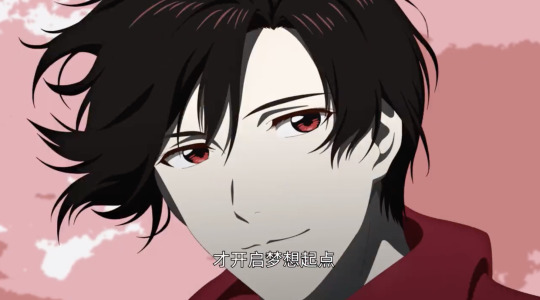
Last time we covered just up to around the halfway point of this OP. We’re picking up again right at the start of the second verse, where a new singing voice kicks in.

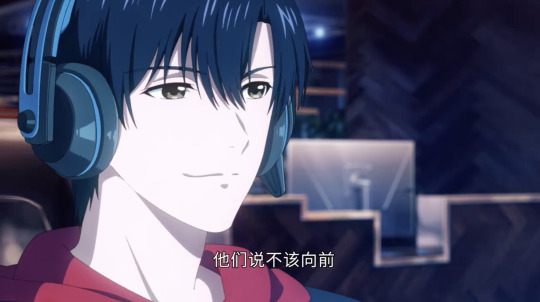
After reminiscing on the past, we come to Ye Xiu again as he puts on his headphones - he’s smiling, he’s doing what he loves, he’s ready to go forward. His smile here is an act of defiance against those who tell him that he should be stopping in his tracks.
The change of singer here is very noticeable, as they have very different-sounding voices. However, this is something we’ll talk about more later.

In this section, we cut smoothly between the real and the virtual worlds. Lord Grim, too, faces forward resolutely, despite the naysayers referenced in the lyrics - “they say I shouldn’t go forward, they say I should just say goodbye, they say there’s no tomorrow, only night.”


Again, we focus on his hands - his left hand positioning on the keyboard in the real world, his right hand in the game world hoisting his weapon. They both extend from the upper left side of the screen, which allows our brains to follow the visual connection easily without being too overt about the parallel. Ye Xiu’s preparations for his comeback help to build our anticipation for the action that’s to come.

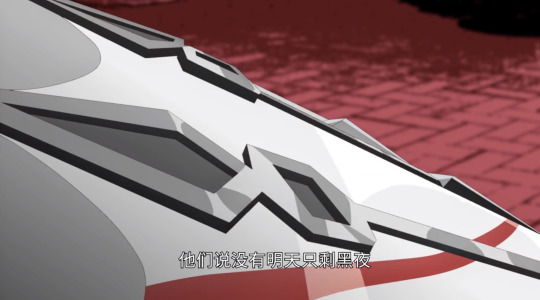
The red palette used for these in-game shots in this segment is an interesting stylistic choice. It’s a more nuanced version of the red-palette style used for the entirety of the OVA OP. Red is the color most commonly associated with Ye Xiu, it’s the color of both Team Happy and Team Excellent Era, it’s Lord Grim’s main color due to his scarf, and of course it’s associated with things like passion, fire, blood, etc. The red is also a nice contrast to the darkened, navy-blue setting of the real-world internet cafe - the lighting makes it seem like it’s nighttime again - and the red of Ye Xiu’s hoodie serves as a nice visual bridge between worlds.
Because this segment of the OP cuts between the game and real worlds so quickly, I think it’s good that they distinguish the game world here with these colors, as it makes the jumps easier to follow and understand.
“They say there is no tomorrow, only night,” as reflected light flashes across the umbrella. Maybe it’s night in the internet cafe right now, but certainly not for long. And even if it’s night for Su Muqiu, his creation will see the light of day.

“Crossing the frozen finish line” - Lord Grim steps out in a wide, battle-ready stance, emphasizing the sense of motion inherent to the word “crossing.” In the background of the music, you can hear the growing sound of what sounds like rushing wind, in time with the wind whipping Lord Grim’s scarf about, and it continues to build up the energy of this scene.
The “frozen finish line” here refers to his unwilling retirement on that snowy night; it’s an ending that he was forced into, not the goal that he was striving for. But the point that the lyrics make here is that this unwilling end merely becomes the new starting point for his dream.
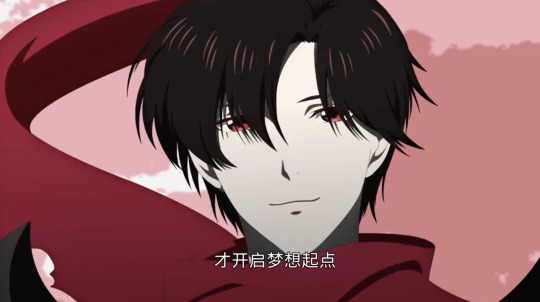
The animators are really milking his windswept bangs, but honestly the animation looks good, so I can’t complain.
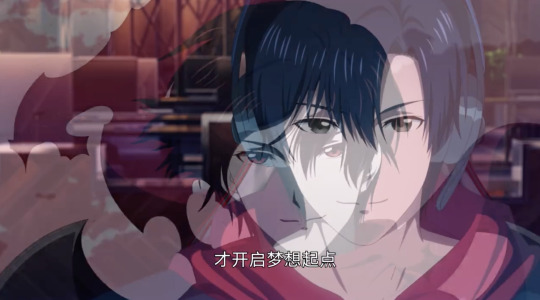
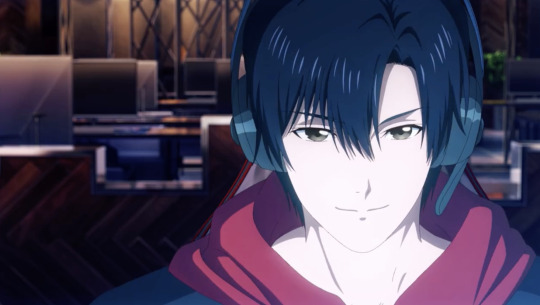
As Lord Grim narrows his (vibrantly red) eyes and tenses in preparation, we fade to Ye Xiu making the same motion, once again emphasizing the real-virtual parallel. Just this small motion is enough to make us, too, brace ourselves in anticipation. And as we mentioned earlier, you can really see here how the red hood of his sweatshirt is a nice connection to Lord Grim’s scarf, standing out against the colors of the rest of the image.
The music feels like it’s going to crest at its peak here, but it’s actually a fakeout - accompanied by a key change in the music, the intensity suddenly backs off. Instead of the climax we’re expecting, we’re instead shown a montage of mostly-still images.
This is actually a good demonstration of how this OP follows the effective “interest curve” fairly well. You can’t continuously build hype throughout a piece, because that quickly becomes exhausting and boring for the audience. Instead, you have to have your peaks and valleys. At the very beginning of the OP, we started off with a crescendo to the first peak where the beat kicks in. We had a fairly upbeat instrumental section, then we dropped off as we entered verse 1. The Happy player segment is relatively chill overall, with its own small ebbs and flows. Then when we enter verse 2 with the second voice, the excitement level is a step up from what it was before. The second half of this segment gradually builds up in intensity until suddenly, here, we drop off. We’ll come back to this curve later to see the fuller picture.
So we have this montage of the major pros, Ye Xiu’s closest friends and toughest opponents (note the first half of the lyric here is “even if it’s dangerous”). Although these are just still images, they still efficiently reveal information about the characters and teams in question - both when you consider them individually, and when you look at the patterns as a whole. Let’s take a look.

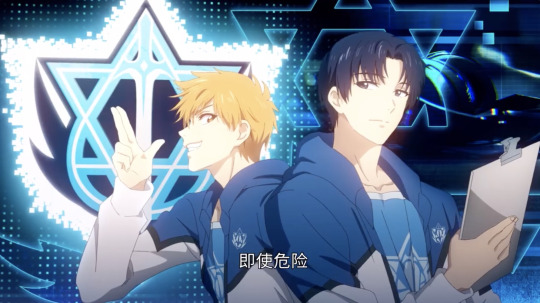
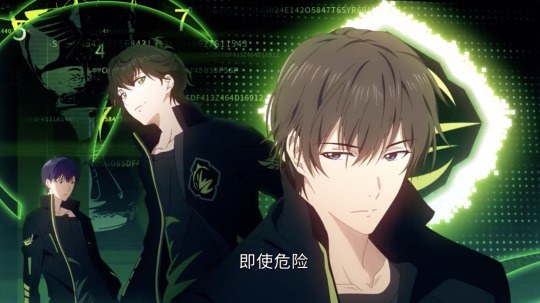

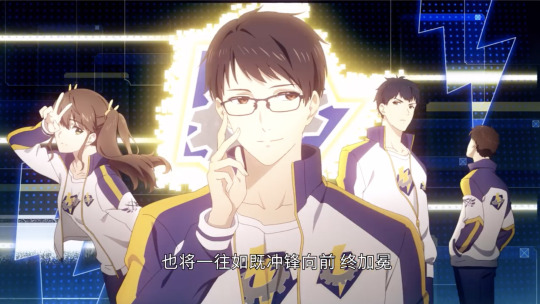
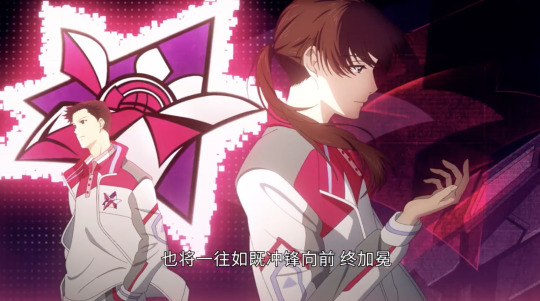
In all of these shots, the captain is the largest figure, and always on the center-right side of the screen. Even the last shot of Ye Xiu’s face before this montage places him at the center-right, giving us the exact starting-off point we need. This means that our eyes don’t have to do much work - we naturally trace a path to follow the most prominent figure in every image.
Tyranny’s Han Wenqing, of course, strikes the most intimidating pose. Just from how they’re positioned, you can get a sense of how the two of them work together as partners - Han Wenqing in front, aggressive, Zhang Xinjie only a step behind, more defensive. They appear to be the pair that’s second-closest to each other in terms of physical distance, as they have a fairly balanced partnership. They’re angled toward each other, implicitly acknowledging each other without actually overlapping.
Blue Rain is famed for their dual-core, and this image makes it abundantly clear, with captain and vice-captain featured equally prominently, standing right next to each other, back to back, almost the same size on screen. Looking closely, you can see that the two of them are moving together in the same direction as a unit. This is in contrast to the other teams’ characters, who are all sliding across the screen at slightly different speeds and directions from each other. Yu Wenzhou holds his clipboard, an instant clue toward his tactician style. Huang Shaotian is at a side profile, reflecting his unconventional, opportunistic, assassin-like style. And with his casual gesture and a wide grin, you can immediately get a sense of his personality.
In Tiny Herb, Wang Jiexi is king (pun intended). Out of all the team pictures, he is the largest figure. This reflects how he is the sole pillar of Tiny Herb as of now, and it hints at just how (unsustainably) deep the team’s reliance upon him runs. Behind Wang Jiexi, we see his successor Gao Yingjie. Although Gao Yingjie is smaller for now, the angle of the shot makes it seem as though he is rising above Wang Jiexi - and this, of course, is exactly what the captain is trying to make happen.
Behind these two is a third figure. At first I’d assumed it was Liu Xiaobie, but he doesn’t have the trademark headphones, so I think it makes more sense that this is actually Qiao Yifan, still in the team. With how he’s half-hidden in Gao Yingjie’s shadow and not even looking at the camera, you get the sense that even in this little picture, he doesn’t quite have a place here.
Samsara features Zhou Zekai and Jiang Botao. When these images were initially previewed during the live ED performance, there was a lot of backlash because a) Jiang Botao’s design had changed, b) their jackets spelled “samsaea”, and c) there was a coloring error on the collar of Zhou Zekai’s shirt. Fortunately, it seems all of these flaws were addressed.
Zhou Zekai is the second-largest out of all the featured characters, reflecting how Glory’s number one player always dominates the battlefield. Jiang Botao’s design here sweeps more hair out of his eyes, which suits his character well by giving him a more open, friendly, approachable appearance. Although he’s positioned far back from the camera relative to Zhou Zekai, he seems content where he is - he has a perfectly fine view of the camera and surroundings, and here he can serve as the tether connecting the powerful Zhou Zekai to the unseen rest of the team.
Next we see Thunderclap - I was actually somewhat surprised to see them featured now, but I suppose we need to establish Xiao Shiqin early on. I’m also surprised that they have four members here… I don’t think I could name four Season 8 Thunderclap members off the top of my head, I’m sorry ahaha. We have Xiao Shiqin and Dai Yanqi obviously, I assume the third is Fang Xuecai, but I don’t know who the player with his back turned is supposed to be. Maybe they included a lot of team members to emphasize how, more so than any other team, Thunderclap’s strength is when they’re playing together as a team. You can also see this in how, unlike all the other teams except Blue Rain, all four of the characters are sliding across the screen in the same direction (right), although the parallax makes their speeds appear slightly different.
That being said, with the hand adjusting his glasses and his thoughtful look to the side, Xiao Shiqin very much gives off the studious tactician vibe. Still, his smile is warm, not cold and calculating. Behind him, Dai Yanqi is just adorable.
Finally, we have Hundred Blossoms. Coming off of Xiao Shiqin’s smile, Zhang Jiale’s shadowed half-frown stands in sharp contrast, even though the viewer has only a fraction of a second to take it in. Angled at a full 90 degrees from the camera, Zhang Jiale stares at his right hand, a sort of frozen sadness on his face. What could he be thinking about? Reflecting on his continued inability to take the final step to the championship? Reflecting on the hand injury that tore his closest friend and partner away from him, leaving him to shoulder the burden alone? In this image, it seems as though it’s the Hundred Blossoms’ shining logo itself that is casting his face into shadow. He undoubtedly has many conflicted feelings about the team he gave six years of his life to, and ultimately abandoned.
Visually, Zhang Jiale appears to be facing a deep blackness; the design places no decorative accents on that corner of the screen. Perhaps he sees no way forward. Perhaps he sees the way forward, through to the team with black as its color, and the betrayal that choice would mean.
Behind him is Sun Zheping. Interestingly, he’s fully illuminated by the light of the Hundred Blossoms logo. In Zhang Jiale’s mind, perhaps he still is that light, a light now lost to him. Although Sun Zheping is also looking away, his body is angled more forward toward the camera, reflecting how he has a better sense than Zhang Jiale does of what it means to cast off doubts and charge forward into the future.
In a sharp contrast to every other team picture, note that neither person in this image is looking at the camera. Whereas the other teams are unified and focused in their pursuit of the championship, both Zhang Jiale and Sun Zheping are lost. In fact, neither is even currently a member of this team that they founded together. And, of course, there’s a distance between them, as they look off in opposite directions, and this distance only grows as Zhang Jiale slides toward the right and Sun Zheping toward the left. Overall, the mood this final team image conveys is drastically different from the rest.
I also found it interesting to note here that, although all of the teams’ uniforms got redesigned in the donghua (for instance, official novel art always portrayed them with collared polos, not t-shirts), the Hundred Blossoms uniform here appears to be unchanged from the original.
As a final thought, I do love the background designs in each of these shots, working in the team colors and the motifs of the logos. I wish they’d release these as desktop wallpapers, they’re really nice.
So that’s enough words about these three seconds of the opening. Let’s (finally) keep going.

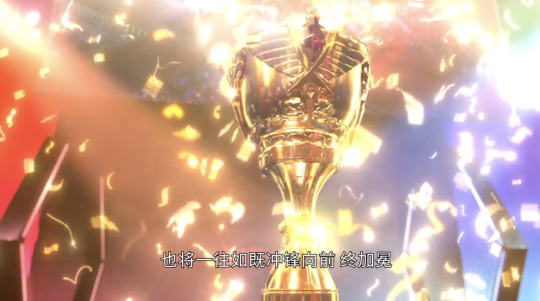
This is a good place in the OP to insert a reminder of the final goal we’re working toward - the championship. “As always we charge forward, we’ll ultimately be crowned,” here at the summit of glory.
Something about the faded filter over these two shots gives it an almost mystical, imaginative quality. Or maybe it’s the feeling of a memory long past. This stage, this place of legends, it’s still a ways off for our protagonists for now. But they’ll find their way here in the end.
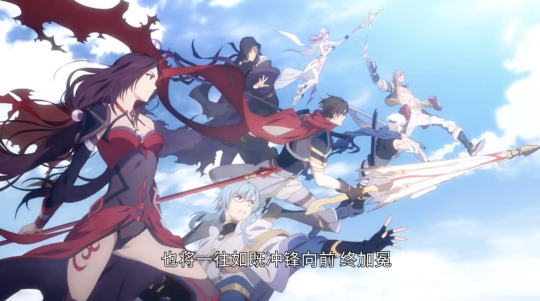
Team Happy! When it comes to illustrating Happy’s in-game characters in an action group picture, this sort of composition - side view, all of them leaping into action toward one direction - is fairly common, even just in official art. Still, it never gets old, and it’s nice to see it here, especially as the music crests. The lyric “we’ll be crowned,” which bridges us from verse 2 to the chorus, is timed with the very first large group picture we get in this OP. It’s a proud and triumphant declaration as we see our protagonists finally united for the first time, arrayed for battle.
With that, just before we enter the chorus section, we’ll pause here for now. Part 3, which will cover the last 20 seconds or so, will probably go up after the episode premieres. I’m also interested to see how they’ll work the credits into this OP; hopefully they do something interesting, or at least make it look nice.
Thanks for reading!
(part 1) (part 3)
19 notes
·
View notes
Text
Razeluxe’s Top Ten Male Characters
So I’ve been thinking about doing a particular list for my favorite characters across anime and games for quite a while and with some advice I decided to break it into my favorite male and favorite female characters. Most people that know me can probably guess at my top three favorites but if you don’t know me... well you ‘bout to learn lol. This was harder than I thought to compile...enjoy my fanboying of the boys lol.
By the by, I’ll do my best to keep spoilers to a minimum.
10) Apollo Justice (Phoenix Wright Series)
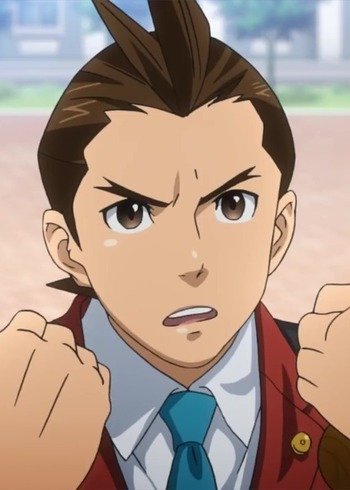
I’ve played only two games that this character was in (Apollo Justice and Dual Destinies, slowly working through Spirit of Justice) and this character particularly in Dual Destinies struck me even more than Edgeworth who is another amazing character. Apollo has an amazing spirit and it was only through playing Dual Destinies that I really got to understand Mr. ‘I’m Fine’ and his stupid ‘Here comes Justice’ puns. I feel his original game didn’t allow him to shine (still a great entry in the Ace Attorney series I don’t care what anyone says) and Dual Destinies allows him the development he deserves. He gets hurt during a trial and it allows a deep dive of his character even if his personality shifts for a while. Damn he’s savage. He’s considered the underdog in the Wright Anything Agency but he’s to me the hardest working person there who is also the most factual in court.
9) Gokudera (Katekyo Hitman Reborn)
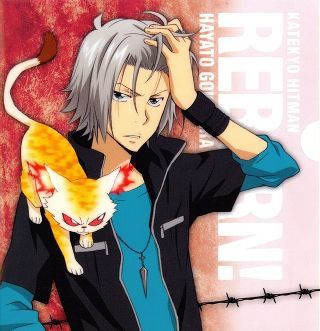
Or as I like to call him, Scowludera since he’s scowling like 90% of the time. This Ichigo ripoff’s character development is insane. And I think that trend follows most if not all the characters in this list. His relationship with his sister is interesting and he’s pretty explosive in terms of personality and intelligence. His fights are all really interesting too, he has some of my favorite interactions in the series thus far (haven’t read the post anime manga chapters yet sadly, but he’s more than earned this spot on this list). He butts heads with people a lot and he can be ignorant but he grows from his experience and you get to see it bit by bit. This dude is loyal to the bone. RIP if you aren’t Tsuna or Reborn. Also, I’d like to shout out this anime as one of the few to do the shounen genre proper justice. Go watch it. Also his sister Bianchi is <3. Oh wait. Male list. Oops. Can we also talk about his weapon? Not gonna say spoilers but that thing is dope and probably one of the best ever designed weapons. And his kitty Uri <3
8) Joshua Bright (Trails in the Sky)
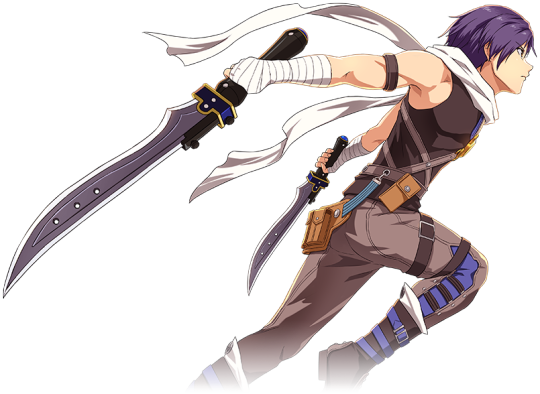
This will be short as I don’t want to spoil anything, but Joshua is a very easy character for me to connect to personally. His feelings, actions, development probably relates more to me than a lot of characters on this list. He’s got good people around him...I’m very happy for his ship and support it 120%. Also the Trails Series, both Sky and Cold Steel are probably my favorite series of anything period. Go play it. There is more to this character that meets the eye and has broken my heart more than once ;_;
7) Neku Sakuraba (The World Ends With You)
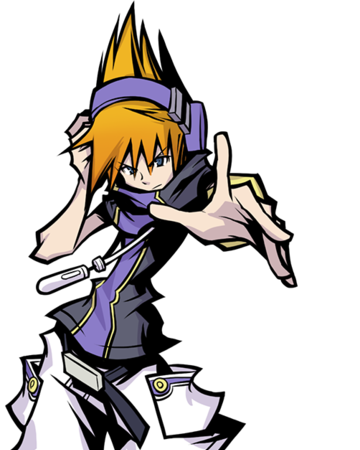
Neku Neku Neku. Another very relatable character for me (see the theme here? lol) He initially shuts out people and over time, through his experience in the Reapers Game, he starts to open up and bring people into his circle. He goes through some crap, like a lot of trauma. When you learn of him it’s no wonder he wound up disliking people and society. He’s extremely creative and that creativity manifests itself in different ways. Kinda like me. It’s worth mentioning I used to roleplay this character back in the day, the very first canon character I used to write for.
6) Shulk (Xenoblade Chronicles)
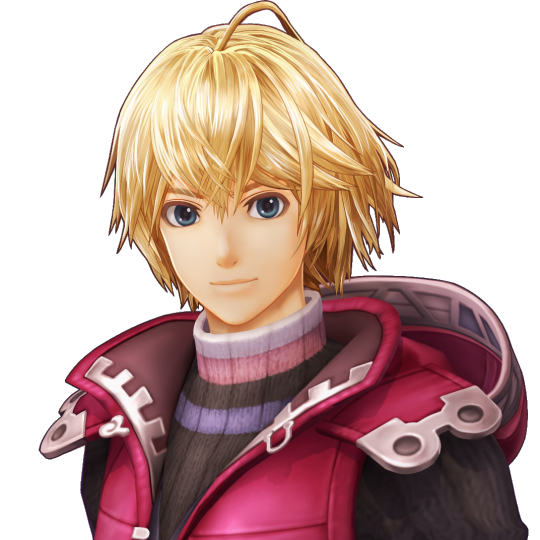
One of the only blonde’s on this list. Shulk is a character that is driven by revenge but eventually changes. He goes through some pretty traumatic stuff that I absolutely will not spoil. His personality when he encounters a certain characters shifts big time and it’s kind of scary considering how early you see this. Also he gets points for being a notably intelligent character. I mean, the dude has his own lab...and is able to fix and adjust stuff. He’s really a great and well balanced character despite all the crap he goes through. Also I used to make fun of this character and dislike him a little bit, but then I grew up.
The list gets real starting...now. Not that it was fake before. :o
5) Jaden Yuki (Yu-Gi-Oh! GX)

Anyone who has actually watched the entirety of GX might know why he’s here. His character development in the latter seasons so unreal and interesting. I’m not spoiling crap but there is a lot more to the character than meets the eye. Like a lot lot. Over the course of the series he loses his innocent eyes and his personality changes a lot...His character is probably one I can relate to in terms of the reasons for his actions, the way he gets down about himself, the way he acts in the final season...it hits me hard...he’s too dang relatable...just like..
4) Rean Schwarzer (Trails of Cold Steel)
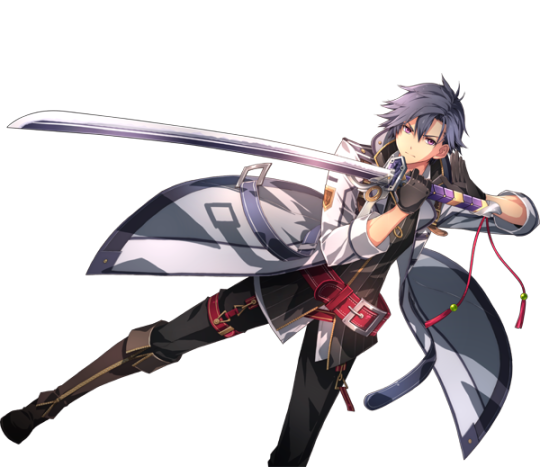
Surprise surprise. Rean is here. -hears crickets- Guess you’re not surprised. I wonder why. I think I relate to this character more than anyone else on this list. Except number one. Number one is in his own league. Rean is a character who generally carries a happy disposition...he has a unique power but you can see he is actively scared of it. It’s something I actively deal with...he’s so scared of himself that he puts distance between family and friends. He never feels he’s good enough. He’s made headway through this, but...
One thing that’s extremely interesting about this character is his selflessness. You may think this is driven to the ground in character stereotypes but for Rean it’s different...his selfless has been described as abnormal by characters in game, and it’s not for positive reasons...Rean deals with some real unhealthy stuff. This is getting long.
As of this post Cold Steel 4 comes out in one month and I’m extremely worried for his character. If you’ve played 3 then you’ll know why. Also if you haven’t played the Trails series, go play it. No buts. Heck I’ll even buy the game(s) for you if I can.
--
Oh look we’re at the top three. I want to say that while numbers two and three here are pretty interchangeable, these characters have been in my top three for over a decade and a half and I don’t see this changing anytime soon. Rean I love you but you have your work cut out if you ever want to breach the top 3. I wanna post a few honorable mentions here. They didn’t get into Smash but they do get Mii Costumes at least! -shot-
Davis Motomiya (Digimon Adventure 02)
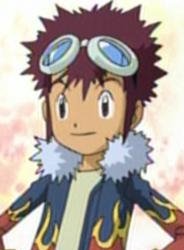
This character was everything I was when I was a kid. The way he tries everything to woo Kari is too cute. Also his unwavering faith in Ken. Also Davis Cries Veemon.
9S (Nier Automata)

Not mentioning any spoilers. Just watch this character and see how his vision of the world changes over time.
Okabe Rintaro (Steins; Gate)
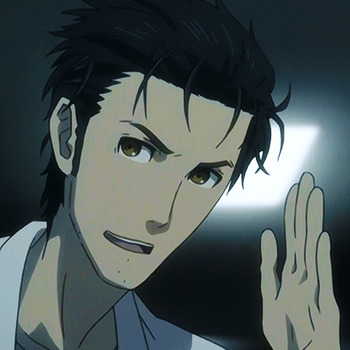
Okabe’s shift from his ‘persona’ as things get real and his efforts to fix everything is too relatable for me ;_;
Yosuke Hanamura (Persona 4)

No, I do not ship him with Yu. They’re great buddies for sure, and he’s pretty cool. Really likable character for me personally save for a few moments in the game...he’s also the main in the Arena games. “Let’s do this, Jiraiya!” He’s so cool lol.
Top 3 time. Fiercely dedicated to these guys.
3) Robin (Teen Titans Go! 2003)
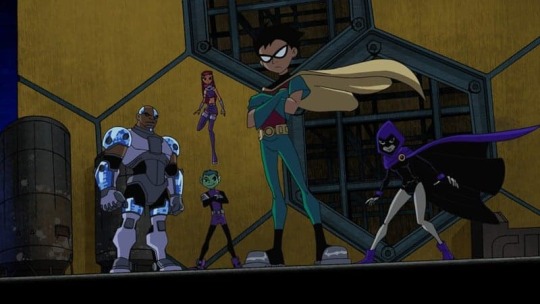
Robin is such a raw character that carries his past and tries so hard to move from it yet it embodies him to his core. He has since gained a softer side from forming a team, and has been doing normal teenager stuff...which is good for him. However at times that Batman side impacts him so hard that he can only concentrate on his mission, and starts shutting out everyone and everything to do things himself. It actively gets in the way of his interactions. He deals a lot with moving on from failure and acknowledging his friends more, which he does get better at over time. He is also represented by the color red. My favorite color. He’s badass and yet carries so much crap. I connect to this character a lot even now. Third canon character I ever wrote for.
2 Lloyd Irving (Tales of Symphonia)
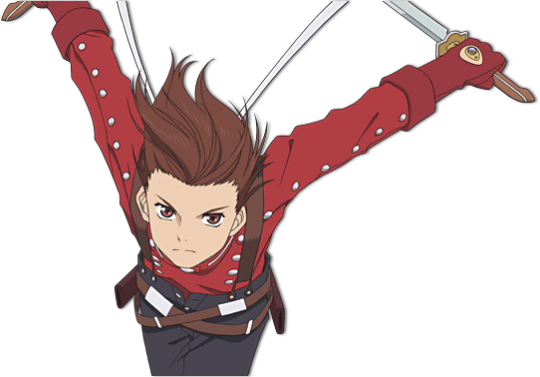
I love Lloyd. I love his voice, I love his attacks, I love his stupid double sword logic. He says wielding two swords makes him twice as powerful lol. I love his development. I love his idealism and how it matures over time. I love everything about Lloyd. It was legit love at first sight. I remember being 15-16 and seeing him on that Gamecube boxart and saying “I wanna play that guy” Most people I feel (guys in particular) probably looked up to certain characters growing up as a child/teen. Lloyd was mine.
1. Zidane Tribal (Final Fantasy IX)
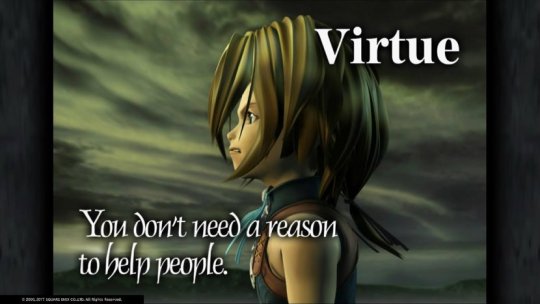
While it was love at first sight for Lloyd, that was not the case for number one on this list. I was 13 when I first played FFIX. Zidane upon encountering him, I always thought he was a cool character, but he was nothing special. Even at Zidane’s lowest point I thought he was an okay character at best. I had not finished the game.
Fast forward a few years and I decide to play FFIX again, this time determined to finish it. I had went through some things, grew up a bit before turning this game on. This damn bandit...I remember writing this bit years ago: “His infamous mantra labeled above describes him well, but under his ability to console others with a smile, to cheer people up and meet them at their point of need with his abundant optimism lies a blonde who masks his pain and keeps his issues to himself. Despite his many friends and buddies he harbors a deep loneliness that, like his problems, he keeps to himself. One would have to look carefully to notice his character flaws for Zidane does an impressive job of hiding these problems. Whether it be through his energy, his theatrics, or focusing on other people, Zidane can cover things up quite well.”
Zidane has an absurd amount of depth to his character that I was never able to comprehend as a kid, beneath his flirting, his playful attitude, he hides a lot of feelings, a lot of anger, a lot of sadness. It used to boggle me how he’s able to uphold his sense of virtue despite what goes on in his life and the end of disc 3 answers this for me. It goes without mentioning that this was the second canon character I’ve ever written for, and I still love writing him. I could and write walls of text about how Zidane is so amazing, a chivalrous thief, a lover and a flirt but I think I can let you go lol. Hit me up if you really want to hear me ramble about any these characters, also play FF9.
...So I wrote all of that and forgot to write about Zidane’s ship...have to give it its own paragraph because I love these two together and she does wonders for Zidane as a whole as does he to her. She’s a princess and he’s a thief, they take their time to show them together through different things, different ordeals...particularly the ordeals. Its interesting seeing them both at their worst moments and the many funny moments..Man, that boat scene gets me every time...If I ever write a top ten couples list this couple would no doubt be in the top two if not number one. And I’d probably write way more than this about them because they’re great. Also they’re canon. A healthy canon. Also Dagger’s hot. Oh wait wrong list.
Okay finally done. Not editing this anymore :P
#phew#this took ages#hope you guys enjoy#roze's ramblings#apollo justice#phoenix wright ace attorney#gokudera#katekyo hitman reborn#Joshua Bright#Trails in the Sky#Sora no Kiseki#Neku Sakuraba#the world ends with you#shulk#Xenoblade Chronicles#Jaden Yuki#Yu-Gi-Oh GX#Rean Schwarzer#Trails of Cold Steel#Sen no Kiseki#davis motomiya#9S#yosuke hanamura#okabe rintaro#Robin#Teen Titans#Lloyd Irving#Tales of Symphonia#Zidane Tribal#FFIX
11 notes
·
View notes
Text
Thoughts on Ivan Chapter 5
And so, here we are. I’m finally doing this.
As a disclaimer: I’m very very very very very very late, and I know that. But I also needed to finish the chapter before having official thoughts on it. (Because that makes sense.)
And now, I can.
I made a Google Doc to write down my reactions each day I played, as I am free 2 play and needed to keep track of this stuff. So here is the entirety of the mess that is my reacting to this chapter. (I’m putting all this under the cut so those who don’t care don’t gotta deal with this.)
TL;DR: Eloise and Ivan both fucked up. Eloise didn’t trust Ivan enough and ended up breaking Ivan’s trust. Now they’re at a bit of a stalemate because valid feeling vs. valid feeling = hella heated argument. [You’ll have to actually read to get the full story behind this.]
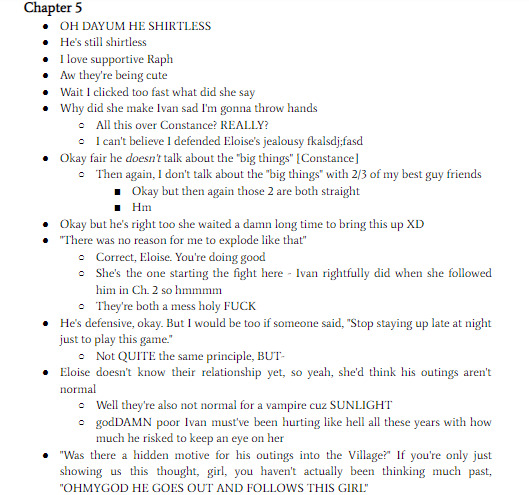
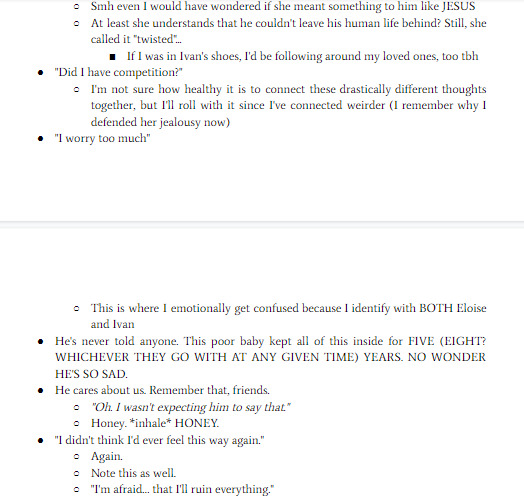
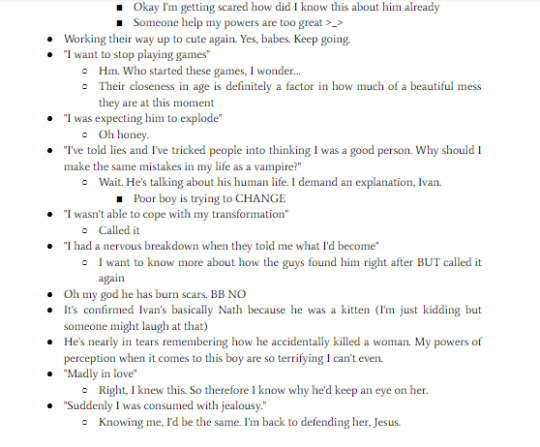
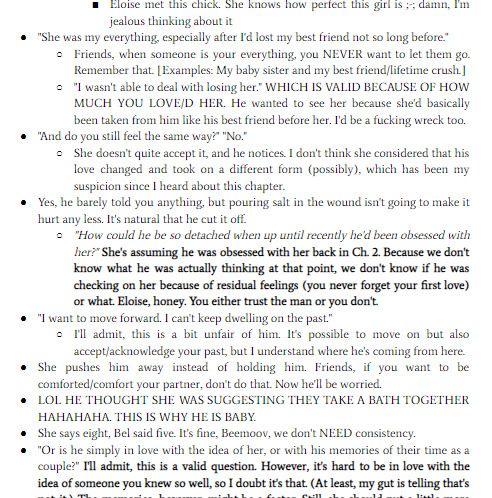
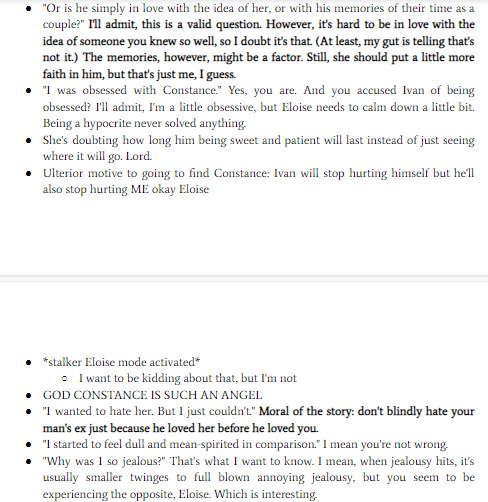
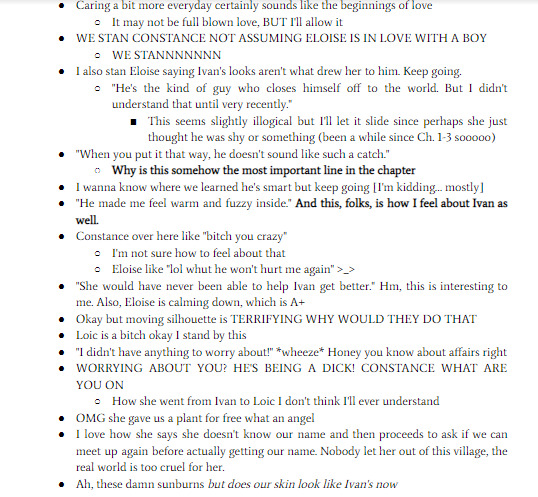
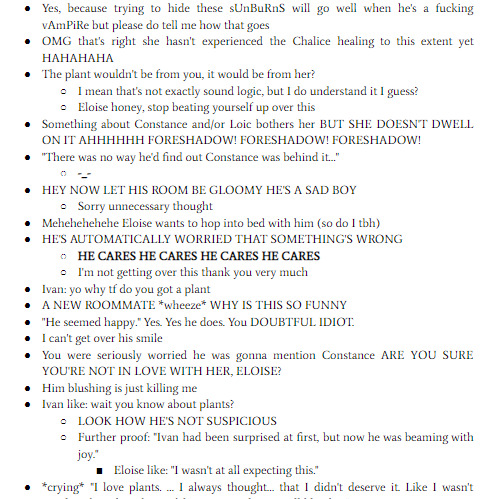
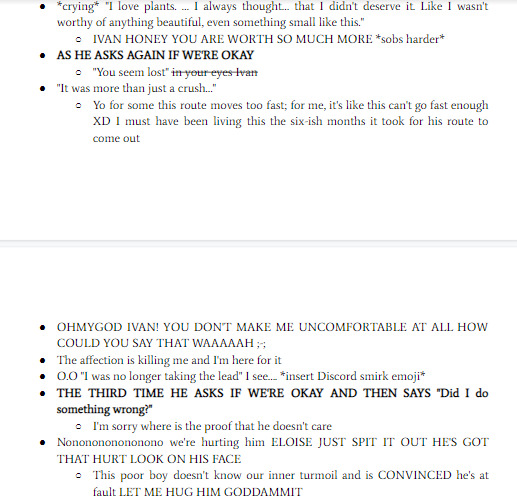
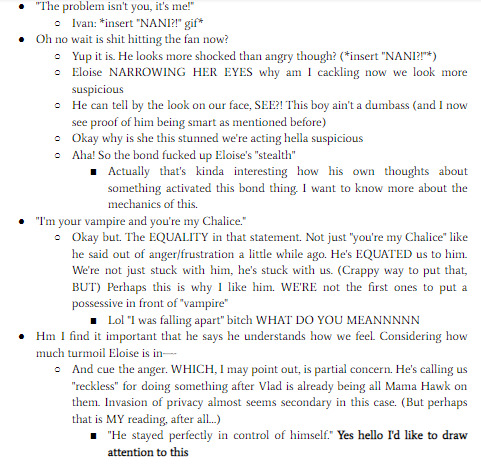
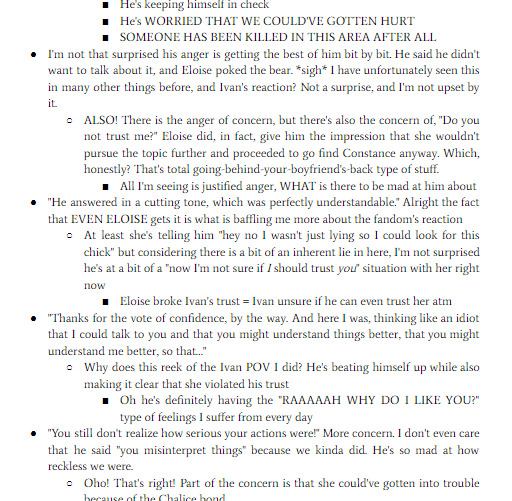
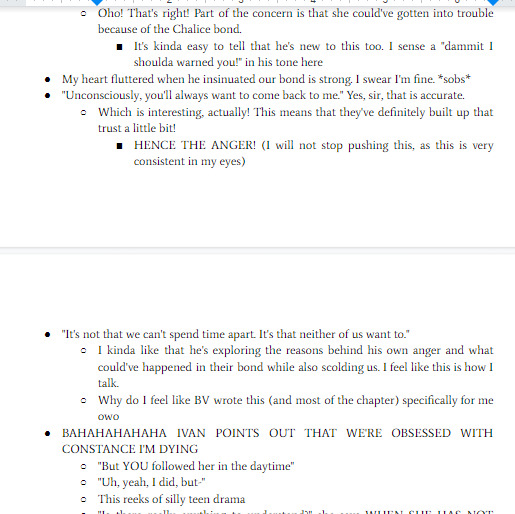

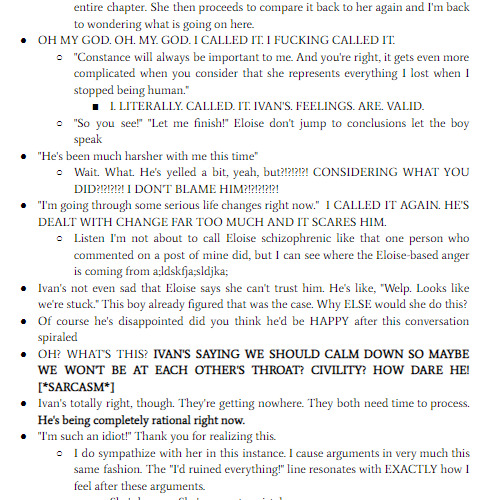
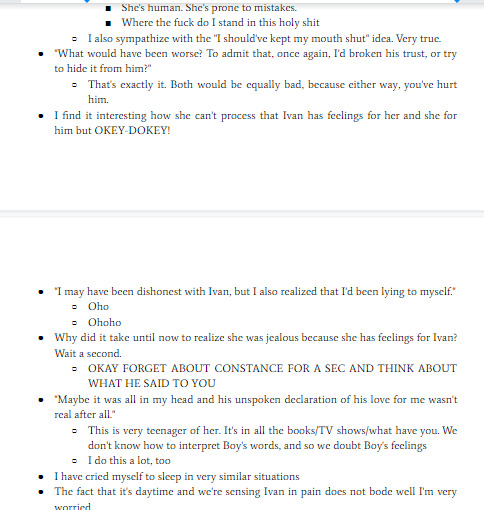
There we are. This was about 11 pages in Google Doc form. I had a lot of thoughts about this chapter.
I’m probably going to reference a couple things from this post I did where I dove into Ivan’s head a little bit. If you want to know more, take a read. I, uh... I ended up being really accurate, and I’m still freaked out.
To be clear, I bounced back and forth throughout this chapter on how I felt about Eloise and Ivan’s actions and words. And let me make a defining statement about my stance:
Eloise and Ivan both fucked up.
They did. Don’t try to convince me otherwise.
Eloise
I made a post once wondering why people were mad about Eloise being jealous. Because let’s face it: jealousy exists. I can tell you a story of a coworker of mine whose ex-girlfriend would consistently harangue him about our other coworker simply because she existed in the same room as him. Jealousy is some powerful shit.
Fans of otome games may not like it or want to deal with the past lovers/jealousy trope, but honestly it’s necessary. Romance ain’t a perfect science, and the more obstacles you have to go through to be with the one you love, the better it’ll be. But this post isn’t about that.
I understand Eloise a lot here. She’s met this Constance, who meant the WORLD to Ivan, and she knows how (seemingly) perfect she is. HELL, I WOULD BE INSECURE TOO. Eloise is insecure; she wonders if perhaps she can ever measure up to this past lover that Ivan had. She’s starting to experience feelings she may not quite understand, and that’s perfectly okay.
However, she kinda went about it all wrong.
Okay, sure. If I heard about my crush going and seeing his past lover during the day (risking life and limb to do so), I’d be a little suspicious. Maybe the “stalker” or “obsessed” thought would cross my mind. BUT if I remembered that Ivan was clinging to humanity AND realized that letting someone go who means the world to you is incredibly difficult, I would probably be more rational than Eloise. Honestly, Ivan’s big mistake here is letting Eloise find out about this outings because they poisoned her mind a bit.
Now, she could have asked him, “Okay, but why follow her?” Because that would have made more sense than doing the exact thing she was (mentally) calling him out for. But no. She did the same thing. And she found she was unable to hate this woman who, now remarried, used to completely hold Ivan’s heart.
What really ticks me off is that she did this because she didn’t believe him when he said he doesn’t feel the same way about Constance as he used to. She didn’t trust him enough to take him at his word. I mean, he’s a vampire, so I guess fully trusting him is off the table, even though she was fully admiring his shirtless form like 6 seconds ago (I mean, so was I), but anyway.
In the end, Ivan gets mad (UNDERSTANDABLY), and they argue because Eloise has somehow become a little obsessed with this Constance idea. Do you remember what I said about my coworker? His ex was ALSO obsessed with the idea of someone else in his life. It’s a pretty valid concern, and honestly, considering the way I argue with people, I don’t think Eloise’s freak out during the argument is completely unjustified. When you’re insecure, you are trying your DAMNEDEST to prove that there is merit to your worries.
I really sympathized with Eloise at the end of the chapter. She was convinced she’d ruined whatever it is she has with Ivan and that she should’ve kept her big mouth shut. This is exactly how I feel at the end of really bad arguments.
Poor Eloise. She’s never been in a relationship, right? So of course things would go wrong in the first one. But that doesn’t mean she needs to lose hope!
Ivan
I might get rant-y here. Only because some things people have said have PISSED. ME. OFF. Especially in relation to what I now know. (I’m not about to address the claim that Ivan needs a straitjacket now, but it might come in the future, if my newly-acquired knowledge of the definition of psychopathy has anything to say about it.)
Okay, so. Ivan definitely could have been a little clearer when he explained his relationship with Constance. He certainly could have clarified his exact reasons for going to the Village during the day. But with the bits and pieces I gathered, it was... I don’t know, obvious? When you care for someone as much as Ivan cared for Constance, you’re going to wonder how they’re faring after your sudden disappearance. It’s a thing in fiction where if X Character disappears, they wonder how life back home is going.
That might just be me over analyzing character motivations again. Sorry. (It’s an English/Creative Writing major thing.)
Still, this boy trusted that Eloise would give him space after he dug into this painful wound of his. He trusted that she wouldn’t ask anymore until he was ready to go back to poking it. But instead, she went and investigated on her own. Not only does that speak of her not trusting him, but now, how can he trust her when she did this?
I wanna note that before shit hit the fan (i.e. the argument), Ivan was perfectly content with Eloise visiting him. He was ecstatic that she would come to him so early in the night. When she gave him the plant, he BEAMED! He told her that he didn’t think he deserved to care for something like a plant! HE TOLD HER THAT THE FACT THAT SHE GAVE IT TO HIM MADE IT MORE BEAUTIFUL!
Have I mentioned I was sobbing at this part?
I’m not about to go into the nuances of the Chalice-vampire bond, because not much has been explained about it. However, Eloise did, in fact, say something that was very like Constance (all flower-knowledgeable and such), and the fact that that BRIEF tidbit clued her in to Eloise’s actions is interesting. So, yeah. He gets mad that Eloise went to see Constance in person, because that is, in fact, an invasion of his privacy in many ways. It’s like if I went to see my boyfriend’s ex in person just because he gave me a name. (I don’t have a boyfriend, and I wouldn’t do that. Just by the way.) But before that...
You know what I didn’t see in people’s reactions to Chapter 5? How worried Ivan was about us. He saw that Eloise wasn’t acting like herself. And he asked THREE TIMES (count ‘em in my reactions above, he asked THREE TIMES) if she was okay. The THIRD time, he said, “Did I do something wrong?”
I want someone to explain to me how in the fucking world this clues us in to him not caring about us. But anyway.
This concern, in fact, comes up when Ivan starts yelling at Eloise about being reckless. Because she was. Going too far from Ivan fucks with the Chalice bond, AND she did it during the day (and nearly got burnt real bad), AND there’s a murderer on the loose, AND Vlad could’ve found out. What I think a lot of people looked past was that there was concern behind Ivan’s anger. Anger based on concern is a helluva drug, and Ivan was high on that.
So, Eloise broke Ivan’s trust and endangered herself while doing it. And people are mad at Ivan? Okay. Cool. Good to know.
You know what was really crazy about all of this? A lot of the things Ivan said in this chapter really resonated with the post I linked above. I didn’t actually know Ivan didn’t take change (which had fucked him over in the past) well, but he directly said so. I didn’t actually know for sure that Ivan saw Constance as the embodiment of what he’d lost when he turned vamp, BUT HE ACTUALLY SAID IT (the part labeled, “OH MY GOD. OH. MY. GOD.”). I only vaguely understood that Ivan had a hard time coping with his transformation and feared that he was gonna ruin his relationship with Eloise. And yet! I ended up hitting the nail right on the head! I can’t tell if this means I’m magical or that I’m too good at diving into character’s heads.
The best part is that Ivan is the one to call an end to the shouting match. I’m kinda glad he kissed her, first of all, because there were some logical fallacies and circular arguing going on PLUS all of the emotions both were feeling PLUS the Chalice bond fucking them up a bit, SO it kinda served to tell him, “We gotta stop.” He basically says (and this is a paraphrase), “Okay, you go chill, and I’ll stay here and chill, because we’re both very angry and should probably calm down.” RATIONAL IVAN.
I’m really, REALLY confused why people are bashing him left and right (and I WOULD bring up the straitjacket thing again BUT).
[Side Note: I think at the beginning of Chapter 6, he ended up going out anyway because after an argument like THAT, how do you NOT get stuck in your own head and need to leave?]
Final Thoughts
This could all be bullshit. Even the parts where I directly quote what the English version of this chapter gave me. I could be going in too deep for the sake of defending Ivan. But what the Moonlight Lovers fandom needs to remember is that nobody ever said Ivan’s route was going to be easy. I got my fluff. I got some damn good fluff in this chapter, too. I NEVER expected things to NOT go to shit for the sake of the overarching plot. I expected it. That’s the point of this game, for God’s sake: things go to shit because of [PLOT].
There are two main things I think some people may have forgotten.
1. Eloise is allowed to be jealous. I’m sorry the past-lover-jealousy trope isn’t everybody’s cup of tea, but I, personally, find it realistic. Maybe she went about it in the wrong way (although we got some hefty dramarama), but I empathize. I’m hecka insecure; I would be acting very similarly to her.
2. Ivan does, in fact, have a point. He has multiple, actually. I don’t blame him for going further into the “so I would go out to see her-” thing, because how does one properly explain something like that to someone who doesn’t know them that well?!?! Plus, his concern is very clear throughout this chapter, so treating him like he has no emotions/doesn’t give a damn about Eloise is pretty fucking stupid. Perhaps he’s acting rather selfishly most of the time, but do you think Vlad and Bel were entirely selfless 24/7? HELL, I’D BE SELFISH TOO. LOOK HOW FUCKED UP HIS LIFE HAS GOTTEN SINCE HE BECAME A VAMP.
I didn’t really ever plan on doing this post, not until I saw people giving Ivan a lot of shit. Frankly, I’m giving him some shit as well. Considering how close in age Eloise and Ivan are, I’m really not surprised shit hit the fan in this chapter, especially with the decisions both of them made.
But then, I still enjoyed it.
So, yeah. I actually enjoyed this chapter. I was tossed back and forth between empathizing with Eloise and Ivan so much that my conclusion - that both of them had a point and both of them had valid feelings and reactions - was not one I thought I’d make when I went in.
And if anybody else actually happened to find merit in this chapter, don’t be afraid to say so. Hell, you can DM me and tell me EXACTLY why you found merit with it. I don’t mind.
Final Final Thoughts
This is a stupid random thought, but. When did Eloise and Ivan become parts of my psyche incarnate??? Like I empathized with them WAYYYYYY too much. Was this chapter written specifically for me? For a real person who’s felt many of these things before?
Beemoov, did you specifically write Ivan’s route for me? As flattered as I am, this is kinda weird. I didn’t expect to see myself so much in the MC of this game, but here we are.
I’m just bullshitting please no one roast me for having a huge ego it’s just that the coincidence was too uncanny
#moonlight lovers#ml ivan#ml ivan chapter 5#ml eloise#they both fucked up and i stand by this statement#i'm back on my bullshit sorry#but also not sorry#i stand by everything i said#ivan stans unite#gen rambling again#but not really#this is not rambling in the least#i'm tired now#i crawled into too many character's heads the past few days
10 notes
·
View notes
Text
AOS 30 Day Challenge
Since I'm late to the party, I will be using this post to catch up.
Day 1: Favorite Season: S4 had the tightest story-telling with the pod structure. For a 22 episode season not to have a filler episode is quite a feat. Aida/Ophelia/Madame Hydra is my favorite Marvel - not just AOS - villian. Mallory Hansen's ability to play 4 different characters in one season in one show (sometimes multiple characters in the same scene) should have won her an Emmy hands-down. All of the cast should have won Emmy's for the performance in Self-Control (Everybody was on their A-game). My love for Robbie Reyes knows no bounds, and Gabriel Luna has mad chemistry with everyone (I pretty much ship Robbie with everybody he's not related to).
Day 3: Favorite story-line: Maveth. When I told my niece the story of FitzSimmons, she declared it "too much!" when I got to Maveth, specifically Hive and we stopped there. In a lot of ways it was the writers dipping their toes in adding more focus to Fitz and Simmons, who are portrayed by the show's strongest actors. I know a lot of people don't like the Will Daniels twist, but other than some hand-waveable plot holes, it really wasn't that bad. It was literally a "only two people on a planet" situation, and they thought that they would never see another human being again and that they were effectively dead to anyone on Earth; so their actions were understandable. Jemma didn't show interest in Will until she gave up seeing Fitz again, and Will initially did not act on his attraction because he respected and even appreciated Jemma's feelings for Fitz; he knew - even if Jemma didn't - that if given the opportunity to choose she would ultimately choose to Fitz ("No wonder Jemma loves you" was Hive channeling Will). If he survived and wasn't a villain I would ship him with either Joey or FitzSimmons (Fitz is canonically bi, Jemma deserves all the love, and the way Will talked about Fitz could be interpreted as romantic interest. He couldn't help falling for Fitz with the way Jemma talked about him), but I never submit prompt requests because I know how people feel about the character.
Also the planet of Maveth was a character unto itself, which is so cool. I really want to know what the light under its surface is; I don't but that it was a only heat source. Since sandstorms turned out not to be one of Hive's powers, Maveth or the cloaked figure (the personification of the planet a la Ego?) Jemma saw had to be the source of those. I suspect the civilization they saw evidence of were tied to the Confederation in season 5. Did they try to settle down and it backfired due to their culture? It very likely was how they knew there were Hydra leaders on Earth for them to manipulate. Will they ever confirm this? Doubtful. Finally, the mystery of Hive and what he was worked and exceeded expectations (his power set of terrifying!).
Day 2: Favorite episode: Inescapable. I was so excited for this episode I paid for it because Hulu was taking its time posting the episode. Of course a FitzSimmons episode would be amazing. The mind prison forced FitzSimmons to deal with issues they've avoided and together to boot. Seeing the turning point in their friendship at the academy and Coulson Recruiting them prior to season 1 was a hoot. I love how they revealed the other Fitz's death to him; he needed to see how the team mourned for him, to understand how much they loved him. Of course the whole scene was painful from him opening the bodybag to seeing the wedding ring to learning of Coulson's passing, but it was necessary and reflected how everything happens at once irl. Seeing their trust and loyalty in their bffs was heartening. And there is no doubt how much they are meant for eachother than when their darksides fall for and on eachother. They certainly learned some things there.
Honorable mention to Self-Control. That was the first episode I have ever purchased. It felt like a movie, and the story is insulated enough I think I may suggest it as the episode to watch when trying to get people to watch the show (either this or Orientation). The entire episode was so gripping I held a pillow to my chest the whole time once it was revealed that either Jemma or Fitz was an LMD. It was such a good Daisy and Jemma episode team-up and jump-started a whole arc of them supporting eachother. It was also a phenomenal Daisy episode. She showcased her powers, and Chloe knocked it out of the park. The scenes between May and Coulson's LMD-selves were so very moving. Ming did such a good job of portraying how May's LMD differed from the others. The episode also revealed what Fitz and Coulson would change if given a choice (not that AIDA gave Fitz such courtesy).
I just realized I switched Days 2 and 3, but don't want to bother with copying/pasting on my phone
Day 4: Favorite male character: Leopold James Fitz. Fitz was my favorite early on and hands-down my favorite character after FZZT. I saw myself in his mannerisms and could relate to his hesitancy to throw himself in the field but doing so because it is the right thing to do. His passion and loyalty to his friends is unparalleled. I also wanted to give Ward a chance. And it's interesting that Fitz was the first of the bus kids to understand how "No one is born evil." It took the Framework arc for Daisy to really understand that. He even has a leg up on Mack here since Mack's first instinct with anything alien is to kill it ("I'm the guy that kills Gordon" is not something someone who values all life, whether he views it as human or not.), which is understandable given his experiences. Fitz was the first person to show Daisy acceptance after terrigenesis, even if he was mistaken to hide it. I didn't realize it the time season 2 aired, but I get a similar aphasia during migraines (it's actually the first and last symptom when it happens). Seeing any appearance by the Doctor makes me feel sick to my stomach because I know how frightened and sick Fitz feels to have that as a part of himself. Fitz loves with his whole heart and he is always driven to do what he believes is the right thing, which is unfortunately what made the Doctor such a formidable villian. He also is always willing to give second chances but not third. He was the first person to joke around with Daisy after the Miles fiasco: he forgave Mack and Bobbi for the real Shield thing; he accepted Daisy back into the fold in seasons 2 & 4 despite how much her abandoning the team felt like betrayal; he formed a father-son relationship with Radcliffe after what he did for Hive; he trusted and befriended Enoch, knowing he kidnapped and sent his closest friends to a freakin future hellscape. Fitz is such a good person. Of course, all my love for Fitz doesn't mean I don't love the rest of Shield's men + Robbie Reyes.
Day 5: Favorite female character: Jemma Anne Simmons. Jemma is a close second for all around favorite (I just don't relate to her as much as Fitz). On a superficial note, Elizabeth Henstridge is so beautiful and hilarious, I have a giant girl crush on her (her smile is dang radiant). I love how they flipped gender stereotypes by making Fitz the emotional one who wears his heart on his sleeve and Jemma the practical one, who shoves her feelings in a box rather than express them. Jemma's cockiness is more real than Fitz's cocky front, too. I wish I had her confidence. Jemma also loves with her whole heart, as much as she has to hide it to function sometimes, and does what she believes is the right thing. She even revealed herself in the future dystopia because she could not stand aside when a stranger was hurt and she knew how to help/save him. Jemma jumped out of the Bus to save her team and jumped at a grenade to help them not thinking she would survive either occasion. She blamed Lash's murdering of inhumans on herself as she has the tendency to hold herself accountable for things that aren't her fault (she shares this trait with both Fitz and Daisy). She doesn't get lost exploring the details within the big picture, which is why she's so good at problem solving. She learned to kickass physically and has always done so mentally. She knows how to let her foes know to fear her. She has the self-awareness to know what traits she needs to work on to complete any mission. She does and would do anything for her team. She's also an incredible leader whether in the field, in the lab, or for the entirety of Shield. She is incredible.
Daisy Johnson is a very close second. And I can't rank May, Bobbi, and Elena. I also have girl crushes on all four of these ladies.
Day 6: Favorite relationship: S3 Shield Team (Coulson, May, Daisy, Fitz, Simmons, Mack, Bobbi, Hunter, Yoyo, Joey, Lincoln and Andrew). OK so I cheated here; we didn't even see everyone be in the same episode. So what? Season 3 had some of the best dynamics from the main team to Daisy's Secret Warriors it's no wonder people love season 3 so much. How can I pick just one? You have Coulson interacting with everyone (except for Joey), Lincoln's fear of May, Her mentorship of him, Fitz and Bobbi, Fitz and Hunter, FITZSIMMONS, Jemma and Andrew, Daisy and Mack, Mack and Huntingbird, MACKELENA, Doug, Fitz meeting his dad Holden Radcliffe, Radcliffe and Hive's "children"...Now I'm getting into characters that weren't on a Shield team. The characters and their relationships with eachother is what this show does best and what makes it such a good and beloved show, not the action or plot twists.
#aos 30 day challenge#leo fitz#jemma simmons#daisy johnson#aida#madame hydra#phil coulson#melinda may#bobbi morse#lance hunter#alphonso mackenzie#aos s4#maveth#aos s3#shield team#team as family#found family#inescapable#self control#aos#agents of shield#yoyo rodriguez#huntingbird#fitzsimmons#too many tags#30aos
21 notes
·
View notes
Text
The Last of Us part 2
Okay so, not having played the game (and not being able to for the near future) I don’t know how much can I tlak of the game without it being unfair.
because I do recognize a lot of what I have read might be something that sounds worse out of context than it actually is or I can be missreading it entirely. So I have tried to inform myself on the game before saying anything.
Okay so, first of all, let’s clarify some misconceptions.
No, Ellie does not Die. Ellie survives. The claim you were forced to kill Ellie was wrong, probably a missreading of the leaked content.
No, Abby is not trans. she is a Cis Woman who just happens to be muscular (I mention the muscles because the claims that she was trans seem to have been based around them). There IS a trans character with Lev, who is a Trans Man. But that is an entirely different character.
I mention this, because the early controversy surrounding the game had them at the front. Since they were inaccurate, it IS important to clarify it because of how it impact the discussion of the game. Got that? Okay.
Even though the game doesn’t kill Ellie, from what I have seen, the ending showcases Ellie losing everything dear to her. Losing her father, her love and their child leaving her and even the small joy of being able to play the guitar.
Ellie loses everything. And it is her fault for letting her desire of revenge consume her. Which is the message of the game, of how anger, hatred and the desire of vengeance can destroy you and everything you love.
So............. a few things.
First of all, boy did this game came out at the absolutely worst possible time. What with the riots and absolute hatred for the police and white supremacy at it’s more palpable. It’s SO hard to not read the classic “hatred of being oppressed makes you as oppressive” and “hating is the same all the time no matter what.” narrative all over the game. Wether or not it was intentional, I can’t say I am not surprised it made people angry.
Second, yes, please, tell me how your violent game has a message against hatred and Violence as you tell me to kill nameless goons. Because that’s the thing with these stories who want to make a message about moral superiority by not killing the person who wronged them: the hero spends the entire time killing goons who do not matter (who do not have a name or pupose other than obstacles. who are closer to a lamp or a wall than actual characters as far as the narrative is concerned) and who most likely are less guilty than the villain, then when confronted with the villain, who IS guilty and who SHOULD receive some sort of karmic punishment, they spare him out of some platitude about morality. F*** OFF.
It doesn’t feel like the hero is “noble” or make a meaningful point, it just means the villain gets to get away scott-free and the hero is still a heartless murderer because the second you brought this point up, every other death in the story suddenly has the weight of making them a hypocrite or worse.
You CAN make this story work, but there are two ways to go abotu it: The John Wick way or the Dishonored way.
John Wick doesn’t pretend he is “above” revenge. Wether or not he is a hero, he doesn’t back down from his quest. He does try to avoid needless bloodshed in the first movie. But he makes it clear: He WILL kill the guy who murdered his dog. And he does so, not with a grand gesture nor a speech, but with a bullet in the head.
And then we are shown John Wick basically has nothing left to live and is practically a dead man whom revenge gave nothing. What gave him something to live was rescuing his second dog.
Dishonored, on the other hand, makes it so killing and taking revenge are entirely up to the decision of the player. Killing in it’s entirety is discouraged but allowed. The best ending is the one where no one dies. it doesn’t say that killing this one person in specific is wrong, it says that killing even one life is wrong and makes up to it's theme by giving the player the choice of not doing so.
So no, even not counting what I am going to say next, I don’t think the ending of The Last of Us Part II works. Ellie could be the straightest girl in the world, it would still fail. Joel could have replaced Ellie, it would still fail.
Okay so, now my final point.
Ellie doesn’t die. The game avoided the “bury your gays” trope. Hooray, bullet dodged.
The reason why “Bury your Gays” trope is a problem. Aside from the fact queer people already barely get any representation and getting whatever little they have be killed off is something miserable to experience. the core of the problem is the misery porn aspect of it.
There was a post a long time ago about this. Of how a lot of LGBT+ made by CisHet creators seem to consistently focus on the tragedy of it and how sad it is that LGBT+ people are victims of hatred and discrimination. And how CisHet audiences seek that tragedy and love to feel sad and the “beauty” in tragedy like there is beauty in the tragedy or Romeo and Juliet.
Do I think The Last of Us Part II does that? that it follows that “love” for misery porn of queer characters? No. I think they made the story how they would have made it if the main character was Cis and Straight. They tried to tell a tragedy the same way if the game had a white cis straight man as the lead and, in that sense, I do think they tried to be “progressive”.
Here is the thing though. Writing a queer character is both the same, and VERY different than writing a Cis Straight character.
It’s the same that, at the end of the day, you just have to be aware of whom they might feel attracted to but otherwise you should simply try to make them complex the sameway you would a straight character. This might be a simplification, but I do think that, while you can tell when an LGBT+ character is written by a CisHet writer, you can also tell when the CisHet writer actually made an effort and put thought into making the character.
It’s different because, like it or not, them being queer WILL completely change the story you are making. Stories strike different depending on the characters’s identity, may it be gender, orientation or ethnicity. And with Queer stories, the pain of loss strikes even harder.
It WILL be a queer story, like it or not, and WILL be judged as such.
To have Ellie lose everything hits a very sensitive topic that LGBT+ audiences have made VERY clear over the years, is a VERY sensitive topic. Worse yet, it has been done before over and over to the point people are sick of it.
Yes, it can be done well, Portrait of a Lady of Fire did it well. Stop THINKING you are the one who will do it well, that you found the take that will make the audience who have made it very clear how much they HATE happy and, instead, focus on breaking the mold.
Part of me wonder if the intention was for this to be part of a trilogy. the “tragic second act before the happy ending in the third” sort of thing. That by breaking down Ellie the way they did, they intend set up things for chapter 3 to give her the happiness she deserves. That, no matter how much they make her suffer, the ending will make up for it if it is happy enough.
Honestly? I don’t know. I only know that Part II ends with Ellie miserable and being told it was her own damn fault.
#the last of us part 2#spoilers#the last of us#the last of us 2#tlou#tlou2#my stuff#my thoughts#random thoughts#lgbt+#lgbtq+#lgbt#representation#ellie
10 notes
·
View notes
Text
Joyous Saintsrise, and Happy Lizard Kissin’. It just seemed like fate that the last day of the decade is a Tuesday, and this idea popped into my head and i wrote the whole damn thing yesterday so forgive if it is a little bit sloppy. I love you, I love you, I love you.
Thus Unfurled
[ao3]
[Fandom: The Penumbra Podcast
Relationship: Lord Arum/Sir Damien/Rilla, (also everyone is friends everyone loves each other i love all of them HECK)
Characters: Lord Arum, Sir Damien, Rilla, The Keep, Sir Marc, Talfryn, Sir Angelo, Olala, (Sir Caroline mentioned but not present)
Additional Tags: Second Citadel, Lizard Kissin’ Tuesday, Holidays, Saintsrise, Party, (just a lot of gentle... yes), Found Family, (hey how was that not already a recognized tag)
Summary: The last day of Saintsrise, and two present have never celebrated before.
Notes: Happy New Years! Happy Lizard Kissin'! I'm emotional and sappy and hey, y'all? I really, really love you. Thank you for being so kind to me this year, and I hope next year is even better. Also, Olala is here? Don't question it. Her stuff got resolved, probably. It's not important right now. Now? It's about food and fun and loving each other. The title is from the Saintsrise carol Sir Angelo sings at the beginning of Frozen King Of Flame. 💖]
~
Arum does not mind the celebratory aspect of this particular human holiday. There is food to be had, and drink and song and revelry, and Damien especially seems charmed by the symbolism of the year turning over, of the demarcation of time, though Arum cannot help but think of it as somewhat arbitrary. Every day they are a year from the same day the year previous, are they not? He supposes such things can be useful, in their way. He has half his mind on the next human Festival of the Three, since it will mark a much more personally meaningful unit of time; a full year he has known his honeysuckle, and near to that for his Amaryllis as well.
Saintsrise is near triple the length of that festival, though. The humans do not intrude upon his space for the entirety of their celebrations, but he has seen more of Sir Marc and Talfryn in the last week than he had in the three months previous. Of course, Sir Marc had been gone for much of that time, and the child has made his visits more frequent since his return, so perhaps that is unfair.
This last day of the festivities, Sir Damien and Amaryllis have convinced him to allow the lot of them to come spend the evening in the Keep. All of them. Together.
It is, perhaps, the loudest it has been inside of his Keep since the assault. Arum believes that Sir Marc is a distinct factor in the creation of noise, he and Damien’s little rival with the booming voice and proclivity for running shoulder-first into doorframes and breaking chairs. They seem to egg each other on, even, and Arum rolls his eyes as they set to arm wrestling for perhaps the third time tonight (Sir Marc has not, as yet, managed to win).
It does grow too much for him, eventually, too overwhelming in brightness and sound, and Arum retreats to darker parts of the Keep to unclench his fists and breathe in the quiet for a long moment or two. The Keep lilts gently, and it drapes vines around his shoulders, and Arum can feel its mellow pleasure, that he and it have been included in this enthusiastic revelry, that there is so much joy and life within its walls, tonight, and Arum is glad for that, if nothing else. His Keep deserves a little joy, deserves to feel such love. The Keep preens at these thoughts, and reminds Arum that he, too, deserves love, deserves joy.
Amaryllis and Damien come to find him after a time. They know him enough, now, to understand that he would grow overwhelmed in such an environment, and they come only gently, only smiling, and Arum holds them to his chest, squeezing tight and nuzzling his snout against their hair and feeling them as a steadying presence. Rilla presses a kiss to his cheek, then, and Damien gazes up at him with so much joy, and then he allows them to take his hands and lead him back to the party proper.
Olala, clinging to Sir Angelo’s leg, asks about the celebration, about why this Ferdinand gets a day less than his brothers merely for being small, her voice full to bursting with a fierce and childish sense of injustice, and Arum and Amaryllis smile in tandem as Damien’s eyes brighten, as he stands and begins to tell the tale. Arum tunes out the words, but only because Damien gave him the same story only days before, and Arum remembers well enough. He would rather spend his attention watching Damien instead, eyes sharp on the enthusiastic gesturing of his hands, on the curve of his smile, the way his curls bounce as he grows more animated in his excitement. Amaryllis comes to sit beside him with a mug of mead to share, and he curls around her and they both watch their poet delight in his tale as the little changeling watches with eyes shining just as bright.
The feast is rather decadent, larger on this last night than on the nights previous, and besides the main meal, everyone has brought something special to share. Even Olala, who spent the day baking beside Marc. This, apparently, is the third of their attempted cakes, and though it looks slightly lopsided it smells delightfully like honey and cinnamon and ginger, and the decoration is colorful and enthusiastic, if childish. Arum wonders which of the two is more responsible for that part of it. Angelo brought a bright, fragrant curry, and Talfryn came with enough of his mother’s blend of spiced tea to make an entire pot, and then another when the first is drained.
Arum, Damien, and Amaryllis spent their day poring over a recipe from one of her fathers. Arum does not typically take well to recipes, but- for this one, he held his tongue. The resulting rasgulla are soft and sweet and perfect, if the ones sacrificed to their taste-tests are any indication, and Talfryn in particular lights up when he sees them, making Rilla grin with an infectious sort of pride.
They eat their fill, and there is so much left that Arum does not know what they will do with it all when the celebrations are finished.
There are games, then. Nothing that requires much movement, they are all far too full for that, but Sir Marc leads them in some word games, and Sir Angelo seems to know a rather ridiculous number of guessing games and the like, and eventually when those scatter off to inattention Damien recites a poem that seems more word-game than anything, itself. A sort of verbal play, a tongue twister that bounces and lilts and rhymes through nonsense and even Sir Marc applauds when Damien careens through to the end.
Olala yawns wide, her little voice squeaking as she leans into Marc’s side, and the knight looks overwhelmingly fond as he ruffles her hair.
“Well, looks like we’re all pretty ready to wind it down, don’t you think?”
“Yeah, probably. It’s been- really fun, actually,” Tal says brightly, through a yawn of his own.
“Quite a boisterous evening! It is merely a shame that Captain Sir Caroline could not join in the festivities as well.”
Perhaps half the room winces in tandem at the suggestion, but no one disabuses Angelo of the notion that Caroline would rather be here with a monster (and possibly worse- Sir Damien) rather than South for her own holiday. Arum saw her briefly on the second day of Saintsrise, when they had been clustered all in Rilla’s front room eating sweets and playing games, and she had very politely pretended that Arum did not exist. Arum was relieved to return the favor, and she had excused herself rather early.
“The celebration is- is over, then?” Olala says, tilting her head and clutching her tail and looking both sleepy and disappointed that the evening may not continue.
“Not just yet,” Damien says warmly, his arm curled around Rilla’s waist. “The celebration may not end until the final words are said.”
Olala blinks, clearly confused, and Arum narrows his eyes for much the same reason.
“The person in attendance who has seen the fewest Saintsrises,” Angelo says dutifully, eager as a schoolboy, “must say “may we love one another as family until the Saints rise again,” to call the festivities to an end.”
Damien smiles in Arum's direction, and Amaryllis does the same with a playfully quirked eyebrow, and Marc is wearing an expression that Arum believes could be called a leer. The remaining few follow suit in the staring, after that.
Arum blinks, and then when the implication hits him his frill flares wide and he leaps to standing, defensive immediately.
“N-no, certainly- do not look at me, that is ridiculous, certainly the child-”
“How many Saintsrises have you celebrated, exactly, Scales?” Marc asks with a less-than-sly grin. “Ten? Twelve?”
“None, obviously, takatakataka. I don’t believe in your ridiculous ghosts,” he snarls, and Marc’s grin widens with a gleeful laugh.
“So you’ve celebrated exactly as many - as few, excuse me - Saintsrises as the kid,” he says, and Arum growls lightly before Damien stands as well and puts a hand on his shoulder, and the noise in Arum’s throat tapers off.
“We will not make you do anything you do not wish to, my lily,” he says gently. “If little Olala would be so kind as to say the words, I am sure we would be delighted. That would work precisely as well.”
Olala perks up, and she stands as well. She nods, and grins, but-
Arum can see that she is nervous. The corners of her mouth do not turn so high as they usually do, and her tail is curling around her own ankle. It is a nervous tic Arum recognizes, one that the little changeling must have picked up from Arum himself.
Arum feels his frill still flaring, embarrassment at both the idea that he would say something so ridiculous as well as the knowledge of all these assembled mammals seeing him so agitated by the idea. He- he does not wish to be the one to close this ceremony. He holds no stock in tradition, he acknowledges no Saints, he is only included in such revelry out of deference to his lovers, surely-
But Olala is sleepy and burying her nervousness in a dutiful sort of excitement, and for Arum, it is always easier to stand when he needs not stand alone.
So Arum sighs, and he reaches out a hand. Olala doesn’t even hesitate to slot her own tiny fingers between his own (tipped with claws at the moment, she has grown claws to match his own, clever little creature) and the sigh fades into a smile when she blinks up at him.
“May we… may we love one another as family,” he says, and Olala echoes a half-second behind, and then fits into a unison on the second half with her gentle lisp bouncing the words chipper and high, “until the Saints rise again.”
The humans cheer and the Keep sings for the sake of joining in the noise, and it is possible that Sir Marc is still laughing at him, but Arum has ceased to care. Olala is looking up at him again, grinning with sharp teeth, enthusiastic and not even remotely shy, and Arum barely feels foolish as he smiles back. He chuckles, then lifts the child into the air, letting her scream a laugh before he arranges her to sit upon his shoulders, her tiny hands gripping his horns for purchase, and that would be worth the ridiculousness just for her bouncing laughter, though the utterly charmed look that Sir Damien is giving him is certainly pleasant as well.
May we love one another as family.
He does. Already, Arum does.
Sir Angelo throws an arm around Sir Marc’s shoulders and another around Talfryn’s, and both burst into their own laughter at Angelo’s pink-cheeked delight and his enthusiastic but scratchy-voiced caroling. Amaryllis is embracing Sir Damien, pressing a kiss to his flushing cheek, and Olala’s tiny hands grip Arum's horns with clumsy care.
Arum does not give any credence to the human Saints, though he attempts not to mock them quite so loudly for Damien’s sake, but-
There is something to the idea of this holiday, he thinks. Olala laughs above him and Rilla has joined Angelo’s song, now, softening and supporting, and Arum loves her, and loves Damien joining in beside her, loves his Keep, loves very gently this strange child on his shoulders as she attempts to hum where she does not know the words, as she winds a soft tail like a scarf around his neck. He has affection enough, even, for the brothers, for Sir Angelo, and not only for how they love and are loved by those beloved to him. He cares for them each in their own right, as well.
Love one another as family.
He hopes the Saints do not deign to rise again so long as he lives. Arum finds he would much prefer no condition upon which this feeling will end. He would much prefer it, if he may to continue to love every one of these baffling, charming creatures as his family for the rest of his life.
#elle's fanfic#the penumbra podcast#second citadel#rad bouquet#lizard kissin' tuesday#nearly the full ensemble so like... too lazy to tag *all* of them#saintsrise#food mention
43 notes
·
View notes
Text
Summer Weebwatch #1 and #2
So this one was delayed not really because I didn’t have time for it, but rather because one of the shows I elected to review was God of High-School, and I’m just ... it’s not that I’m not interested, as such, I’m just not interested enough to actually seek it out and watch it when I have other things to do.
Since yesterday saw its third episode air (and I haven’t even seen the first two), I think we can safely declare God of High-School the first casualty of this season of Weebwatch, because I’m just -- I’m not going to watch it until I really have nothing else to do, guys. I’m just not.
So that leaves us with Digimon AUdventure/Digimon Adventure Psi and Yu-Gi-Oh! SEVENS carrying on from the Spring, and joining them, Deca-Dence and Mr. Love: Queen’s Choice, right now.
Deca-Dence.

★★★★☆
So, Deca-Dence definitely has to win some kind of prize for setting up a solid if somewhat by the numbers premise in its first episode, and then completely stamping that premise to death with its hooves in the opening minutes of its second episode.
Deca-Dence Episode 1 follows Natsume, a ‘Tanker,’ a lower-class citizen in the mobile city of Deca-Dence, who dreams of joining the ‘Gears,’ the upper-class warriors of the city who battle Gadolls, creatures which have seemingly wiped out most of humanity. Relegated to the maintenance crew, Natsume ends up striking up a daughterly relationship with fellow maintenance worker Kaburagi, only to discover that Kaburagi is actually a Gear.
Decadence Episode 2 follows Kaburagi, a robot who regularly plays Deca-Dence, the hit real-action entertainment game where robots can download their consciousness into human avatars in a massive entertainment facility (which seems to take up the entirety of Eurasia), and live out the life of an elite monster-fighting warrior in what amounts to a theme-park-slash-MMO-video-game built entirely for their enjoyment.
It’s such a baffling one-two punch of ‘here’s our premise, no here’s our premise’ that it kind of overshadows everything else, establishing straight out of the gate that we’re never really going to know what to expect with this show. After all, if it’ll throw its entire premise out the window moments into its second episode, what’s to stop it from doing the same thing with its third episode, or fourth, or fifth?
I kind of like that uncertainty aspect.
Yu-Gi-Oh! SEVENS.

★★★☆☆
Since Sevens went on break this week, there’s actually only one episode to review here, and it’s honestly more of the same.
That’s not a problem, I still find this series absolutely hilarious, and this episode, wherein the gang enthusiastically takes up a search for a dinosaur (only to eventually discover it’s one of Yuga’s inventions gone wrong) is a lot of fun.
I am hitting the point where I maybe want to see something more from the show, though. Some kind of arc, a little bit more of an ongoing storyline, some upping of the stakes. Something to mix things up a little from the admittedly very funny antics.
Mr. Love: Queen’s Choice.

★★☆☆☆
Mr. Love: Queen’s Choice is a pretty popular dating sim mobile game that seems to be suffering from a (hopefully temporary) case of adaptation sickness here.
Some of that is difficulties translating over the animation style -- all the characters have really huge eyes, which works fine for the (literally) wider-eyed characters like Kiro, Gavin, and the protagonist, but when it tries to render narrower-eyed characters like Victor and Lucien, looks really jarring, as their eyes are now inhumanly wide.
Most of it, though, is that the story is trying to juggle a lot of plates, introducing its lead character and her four potential love interests (of which Gavin is the best, don’t @ me), introducing the setting and premise, and setting up two entirely separate plot threads -- the main character’s television show, Miracle Finder, which is rapidly losing viewership and needs to be revitalised, and the conspiracy involving superpowered humans. It ... does not manage to successfully juggle all of said plates, leading to an episode which somehow manages to drag as it trudges its way through a laundry list of obligations.
So this was kind of an uninspiring episode, but I think it will improve once we’re a few episodes in and the series has a little more breathing room.
Digimon Adventure 2020.

★★★☆☆
So the last two episodes were largely focus episodes to introduce (or re-introduce, really) Mimi and Jyou, and in that regard they’re largely good and fine and good. Not a lot happens, the episodes are pretty squarely focused on just introducing those characters and nothing else, but they do their jobs effectively.
All of which means I don’t have a whole lot to say about these episodes. They’re very Early Digimon sort of episodes, following the rigid formula of ‘introduce character, introduce problem, resolve problem, evolution scene.’
So the most I can say about them is that they’re, you know, fine. Good, even. And Yamato is returning next episode, so that’s nice.
5 notes
·
View notes
Link
UFC 257 is around the bend. For the die-hard fans of MMA, the UFC 257 is one of the most anticipated occasions on the planet. There’s an extraordinary explanation that you would prefer not to miss to watch UFC 257. It is because this battle card will include the headliner that includes Poirier vs McGregor.
The Ultimate Fighting Champion creates the UFC: McGregor versus Poirier 2. It will happen on November 21, 2020, in Abu Dhabi, Dubai, Joined Middle Easterner Emirates. It is not exactly a month until you will observe the critical point in time that will happen when the two best lightweight warriors meet inside the octagon.
UFC 257 Main Card
The significant card on the occasion is the battle between Dustin Poirier against Conor McGregor. The other battle in the principle card is between Jessica Eye against Joanne Calderwood. The third principle card occasion of UFC 257 is the battle between Michelle Waterson against Amanda Ribas. The other battle which is on the principle card is the battle between Shane Burgos against Hakeem Dawodu.
UFC 257 Prelims
The starter battle of UFC 257 is the experience between Brad Tavares against Antonio Carlos Junior and the battle will be a middleweight occasion overall occasion. The other primer experience under that card is the middleweight battle between Andrew Sanchez against Andre Muniz. As said before this experience is a middleweight occasion.
Joanne Calderwood vs. Jessica Eye
Amanda Ribas vs. Michelle Waterson
Ottman Azaitar vs. Matt Frevola
Antonio Carlos Junior vs. Brad Tavares
Nasrat Haqparast vs. Arman Tsarukyan
Early prelim event
The early primer occasion of that card incorporates the experience between Arman Tsarukyan against Nasrat Haqparast and the battle is a lightweight occasion around the world. The other early starter occasion is the experience between Ottman Azaitar against Matt Frevola and it is a lightweight occasion. Moreover, there is the bantamweight occasion occurring at that scene and it is the experience between Umar Nurmagomedov against Sergey Morozov who is of Russian birthplace. Under a similar card is the battle between Amir Albazi against Zhalgas Zhumagulov.
Everything You Need To Know About UFC 257
Where is the UFC 257?
The impending battle will occur at the Streak Gathering on the UFC Summit office in Las Vegas, Nevada, US.
What time is the UFC 257 Start?
Remember that the authorities would declare the time in neighborhood timing. It happens at 10:00 PM neighborhood time in Abu Dhabi. Convert to your time region with the goal that you won’t miss the exhibition.
How can I bypass ESPN blackout Restrictions?
Truly, you can. Utilize dependable and solid VPN administration and associate with the US worker to open the administration.
How to Order UFC 257 PPV on ESPN?
You simply need to go to the ESPN site, click “purchase now” and adhere to the directions until complete.
How much is the UFC 257 PPV?
The UFC 257 PPV costs $64.99.
How to Watch UFC 257 Live Stream?
Viewing UFC 257 Live online as a result of the pandemic? Have no concern since you can watch UFC 257 through your #1 medium with no issue. ESPN+ has maintained all authority to communicate the full occasion.
On the off chance that you are up to watch the starter battles, you could tune into the UFC Battle Pass, FOX Sports, just like ESPN. For both of the alternatives endorsers, you could tune into your number one channel to watch the starter battles that will shock you. In any case, for the headliner, you need to buy the PPV ahead of time.
On the off chance that you have bought into ESPN+, you simply need to buy the PPV. If you are not an endorser, you should buy into the ESPN+ administration or pick the group that can profit you the most.
Visit the official site of ESPN. Discover the ESPN+ and hit the “Purchase Presently” Catch. You should make an ESPN account if you haven’t bought in.
At that point, you can adhere to the on-screen directions to save your alternative to watching the impending UFC 257. ESPN+ will stream the session in the market region. Along these lines, ensure that your territory is inside the region inclusion first before continuing.
The PPV cost is $64.99. Yet, with regards to buying from ESPN+, it very well may be somewhat befuddling for both the supporters and non-endorsers. Here is the way the estimating will go basically.
The PPV cost in the US is $64.99. UFC 257 is accessible through PPV on ESPN+.
You should be the supporter first before continuing. You can pick either being the month to month supporter or yearly endorser.
For non-registrants, you could pick a month to month membership, or yearly membership. Yet, there is one much better choice you could consider. The group cost of the UFC 257 is $84.98. This group comprises of the UFC 257 PPV + Yearly Membership. You can set aside a great deal of cash on the off chance that you pick the group.
How to watch UFC 257 in the USA?
Know that the UFC 257 is accessible through the PPV. In the US, you will need to tune into ESPN and buy the PPV through ESPN+. ESPN+ endorsers simply need to continue with the PPV buy. If you are non-supporters, you should buy into either a month to month or yearly membership.
ESPN+ additionally accompanies an incredible arrangement. With UFC 257 Pack that costs $84.98, you will achieve the UFC 257 PPV, in addition to yearly membership of ESPN+. ESPN+ is accessible in various stages. However long you have a fair web association and viable gadget, you won’t have any issue in getting to the administration. Request the UFC 257 through the ESPN+ site. Adhere to the on-screen guidelines to finish your request.
UFC 257 Live Streaming in the UK
The authorities have affirmed that BT Game will direct the transmission for the impending UFC 257. BT Game is accessible on numerous gadgets including the PC, PC, Cell phone, Tablet, Online player, and so forth If you are in the UK, have confidence that you will consistently have the choice to watch your #1 UFC warriors in real life.
Consider getting BT Game Month to month Pass first at that point buying the PPV for UFC 257 and you are all set by at that point. BT Game Application is likewise accessible for cell phone clients. If you are up to watch the session while in a hurry, consider downloading and introduce the application on your gadget. Also, Presto, the alternative is held for you.
How to watch UFC 257 Online in Canada?
People in Canada shouldn’t stress since you will have a lot of alternatives to get the PPV for the UFC 257. You can get the PPV from Telus, Roger, UFC Battle Pass, Videotron, Shaw, or Eastlink. On the off chance that you are a supporter of one of the administrations, you simply need to continue with the PPV.
For the UFC Battle Pass supporter, you can stream the entirety of the occasions, including the PPV. Yet, through this stage, you will even now have to address the PPV at full cost. The beneficial thing here is that you can watch different occasions for nothing including prelim card, early prelims, and UFC Battle Night.
Where to Watch UFC 257 in Australia
The authorities of Australia have affirmed the accessible alternatives for the UFC fans to watch the forthcoming UFC 257 battle. You can pick one of these: Headliner, Bring television, UFC Battle Pass
Battle Pass undoubtedly accompany such incredible substance. You could take this alternative if your attention is just on the UFC occasions including the prelim card, early prelims, and UFC Battle Night. The UFC Battle Pass likewise conveys to you the phenomenal experience of the UFC fans. You will get the notices and updates continuously about what’s happening before the UFC 257 happens.
How to watch UFC 257 Online from anywhere?
If you are posing this inquiry, the appropriate response is YES and NO. The NO answer arises if you are outside the zone of the inclusion of your administration. For example, you are utilizing ESPN+ administration that is just accessible in the US. You won’t have the option to utilize the administration in Asian nations because of the geo-limitation strategy.
It won’t be astounding on the off chance that you are encountering the power outage on the off chance that you are utilizing your ESPN+ account outside the nation. Yet, it isn’t generally an impasse. You can at present outfox the framework and gain admittance to your administration.
Here is the place where the VPN administration enters to help. VPN – Virtual Private Organization administration permits you to associate with the alluring nation worker which you can use to open the homegrown help in the other nation. Along these lines, for example, you can interface with the US worker to open the ESPN+ administration on the off chance that you are in the Asian nations.
Seeing how the VPN functions are exceptionally simple. Every one of the VPN suppliers has their advisers for telling you the best way to utilize their administrations to unblock the live real time features in different nations. Zero in on top quality VPN administrations and you’re all set.
ExpressVPN
ExpressVPN is one of the famous VPN. You can use this VPN in various operating systems like Windows, Mac, iOS, Android, Linux, etc. You can connect your device to over 100 locations by 2000 servers through ExpressVPN. If you want to subscribe to a monthly plan, you have to pay $8.32 which is very costly. By using a random server of CANADA, you can also access the DAZN app through ExpressVPN. You can use it to enjoy UFC 257 Live.
ExpressVPN has three subscription options: $12.95 billed each month, $59.95 billed every six months, and $99.95 billed annually. Like most services, the only difference is for how long you commit. The company accepts payment by all major credit cards, PayPal, and other services such as Alipay and WebMoney.
1 note
·
View note
Note
If the MC from rmd was more mature and if rmd wasn't a love choice story with less episodes, would it be better? Or is there more stuff that needs changes?
yeah i do think so! so i think they tried to emulate hlitf (and mpd maybe? i’m not familiar enough with mpd to be able to say). in thinking about rmd and its future (in response to another ask which i’m still working on bc i lost my whole essay the other day lmao), i kind of theorise that they wanted rmd to be the next Big Title with a full lineup of “ensemble cast” type characters, instructor-student type dynamic (which can then ‘progress’ to colleague level), lots of lore/backstory, potential for lots of substories. the backlash against love choice has been strong in both japanese and international fandom as far as i know so i really think that was a big hindrance in terms of drumming up success for a title that is set up to have a LOT of content. hlitf has always had a leg up bc from the start, it rode off the success of msb and the demand for more public safety content, which is why right from the very start, they tried to push crossovers with hlitf/mpd. the very first rmd substory is a takado/kirisawa crossover, and then they had that extremely gratuitous cameo in ayumu (aka voltage’s king) season 3 in both the ms AND his pov. they keep pushing these crossovers, like with the vip room event which just came to love 365.
ANYWAY, the more i think about it, the more i’m convinced that they’re trying to emulate some of the successes of hlitf, so i find it a pretty useful point of comparison to see the things which i find are lacking in rmd.
so yes i definitely think that i wish the rmd mc was more vulnerable and maybe more romantically inclined and just generally more emotionally mature? i’ve said i wish she made more mistakes but i when i think about it more, i do see some parallels between dr mc and hlitf season 1 mc in that they go into a new learning environment with a certain set of values that get challenged. so i am willing to acquiesce on that point i’ve made before about her errors, since i do think that her values and the choices she makes because of those values get called into question (coming off the back of reading matsunaga’s routes, i do see this happen). also i’ve said this before but just to reiterate, i do also think that there’s a tone shift in the translation that to my perception (re-?)characterises the mc as being blase which i feel comes at the expense of genuine emotional connection between the reader and the heroine. however, i do also think that this tone perception thing is very subjective bc it reads as being quite american to me which is something that (1) is foreign to me as a non-american and (2) gives me a feeling of incongruence bc i’m very aware that this is japanese media. either way, i think in a long form title, there is potential for her to grow/develop when it comes to emotional maturity and romantic development, which leads me to my second point...
ANYWAY, the biggest (writing) issue that i find with rmd is its lack of romance FOR SUCH A LONG ROUTE. generally the main point of otome games is the romantic aspect, which i find to be super lacking in a game where romance is literally right there in the title. so one of my favourite things about hlitf is that we have the whole “meeting him” route before the “falling in love” route, and that generally each season is split into two halves in which the first half feels complete as a route on its own, but its strengths in setting up plot and character/relationship development become highlighted in the second half of the season (i know i talk about this a lot but kaga’s season 2 is the PRIME example of this). hlitf’s “meeting him” stories all tend to have abysmal ratings (which.... i pretend i do not see it) because of people not getting that they’re just introducing the characters and setting up their dynamic first. because of this, we essentially get a (relatively) slow burn romance that takes 20 chapters (or in tsugaru’s case.... 60 chapters lmao, or we’ll say 30 bc he has shorter chapters) to get to fruition.
so romance md has 30 chapters to get the job done, which SHOULD mean that there should be better pacing to get to the relationship stage, right? rmd does a similar thing to hlitf’s split routes where there’s generally one “introductory” case which introduces a moral dilemma, which then ties into a second case. in hlitf, the introductory case in ms1 serves to introduce us to the love interest’s personality and way of working as well as helping the two characters become closer by spending more time together. then it links to ms2 in that it tends to lead into wider criminal activity that may or may not be related to the love interest’s primary negative characteristics, and most importantly, the mc is instrumental in helping the LI overcome that issue (e.g. goto’s paranoia about losing colleagues/partners, kaga’s problems with internal corruption within the NPA, soma’s trust issues and devaluing of those around him, ayumu’s unrequited love). so let’s say that a full rmd route is equivalent to ms1+ms2 in hlitf.
rmd does a very similar thing in terms of plot structure with the main difference being that the medical cases tend to align explicitly with the LIs’ traumatic pasts, where in hlitf it’s a bit more indirect (only goto and soma have had their primary vengeance arcs complete). so why does the pacing feel so off? i think that the reason for that is that there is just so little energy put into romantic development. one thing to note is that the mc has already fallen by episode 10 of ms1, i.e. halfway through the ‘full’ route. the only rmd route that i’ve read where the mc has already caught feelings at that point is hosho’s route, where she realises in chapter 15 (which is why i did write in my review that i thought the pacing was better). secondly, it’s a LOT harder in rmd to see not just the mc’s feelings developing, but the progression of the love interest’s feelings. imo this is because they basically treat her uhhhh the same from start to finish??? she runs her mouth from day one and even during very intimate conversations, so i feel like there is no sense of increasing emotional closeness - it’s more just that we (the third person reader) get to know more about the love interest’s past and i guess we see them becoming friends? rather than seeing two people growing closer with romantic attraction. contrast this with hlitf, where they were never ‘friendly’ and the relationship that starts blossoming between them was always overtly special and romantic relationship and the way in which the love interest softens for his mc is already evident by the end of ms1. this means that we get a whole 10 more chapters for this development to really take its time to get to where it needs to go. this also means that we actually see obvious burgeoning attraction (or special treatment) before we get to any sort of climax confession scene. i feel like the mc’s lack of manners/impertinence familiarity with the LIs from the very start means that it’s a lot harder to see the dynamic between the two of them changing. just compare the way that dr mc and takado talk to each other in ch1 and ch29 vs the way that hlitf mc and kaga talk to each other in ms1 ch 1 and ms2 ch 8. i would argue that the action scene in the collapsing building in takado’s chapter TWENTY SEVEN is about equivalent to the action climax scenes that happen in hlitf ms1 chapter NINE.
(oh and i also think that the whole talking about how physically beautifully they are to their faces from day one also hinders the sense of growing mutual attraction.)
another GIANT hindrance is that a lot of the key bonding moments are actually paywalled behind heart scenes so you really don’t get anything if you don’t dish out THANKS LOVE CHOICE.
anyway, long story short is that romance md spends waaay too long and focusses way too much on plot stuff and character backstory (if you can even unlock it lmao) and leaves maybe 5% at the very end for romance rather than having a romantic element integrated throughout the story. if i were to try and compare it to hlitf again, i would say that to me, rmd routes feel like if hlitf ms1 was as it is but then there was one extra chapter at the end where it just goes straight to confession without the entirety of ms2′s development. but also like at least 2x longer. like imagine if we had ms1 and ms2 but there was no romantic engagement or indication of any romantic interest from the love interest in 20 whole chapters except you suddenly get one confession but only in the happy ending. actually matsunaga’s doctor ending literally FLOORED me like ???????? it’s literally like imagine if you only got through namba’s ms1 and half of ms2 (to that scene outside the dorms when you know what happens) and THAT’S WHERE IT ENDS LASKDJFLKSJ they finally had some early emotional awareness on the part of the mc and then they had to go and make it ENTIRELY one sided with not just zero but actually NEGATIVE romantic intention from the love interest i’m screaming
tl;dr: my biggest problem with romance md is that it’s literally SO LONG but there’s no romance
#wow i promise i did not intend to write this much but it all just came out#this took me a whole day to write too lmao thanks adhd!!!!#romance md: always on call#rmadoc#romance md#her love in the force#hlitf#voltage inc#otome romance#love choice#love 365#meta#Anonymous#snow answers
3 notes
·
View notes
Text
My dog was lost for three days. What came back wasn't my dog.
As a kid, I was raised in a small fishing community on the Eastern side of Canada, surrounded by the gulf of Saint Lawrence and the Boreal Forest. The entirety of the land was close to 4000 foot square with an even smaller number of residents sprawled out over "main street", the main road running straight through our little town, and farming houses spread widely between areas of trees that were changed to domestic residential homes when agriculture stopped being profitable. In total, our community is surrounded by a vast expanse of ocean, and a seemingly endless barrage of trees that's spread over 55% of Canada's entire country. I spent most of my life hunting in those woods, so you can imagine my joy when my parents got me a "hunting dog".
Sandy was a Shetland Sheepdog, and while they were more fit to be herding and tracking sheep over grassy plains rather than rabbits and deer through dense forest, it didn't stop me from taking him with me on every excursion I possibly could. Sandy had been by my side for enough hunting trips that he'd grown accustomed to waking up just before breaking daylight, and on a few occasions helped track down small game like squirrels and rabbits through considerably large areas of forest.
Sandy wasn't my property, and wasn't treated like he "belonged" to me. Sandy was a member of the family, my best companion, and my truest friend. I think fondly back on all the times he'd sit in the front seat of the truck without being told, ready to go for a walk in whatever part of the forest I took him to. I can honestly say that there will never be a dog that will fill the void Sandy left in my life. I find that dog lovers relate to that sentiment more than others.
It was October 30th, the first day of deer hunting season. I had been talking with my family about taking Sandy, my hunting gear, and some essentials to one of the cabins my Grandfather owned in his heyday off an unmarked road a few hundred miles into the wilderness for a few days. This was met with a lot of protesting, but nothing could stop me from getting in some time looking for wild game in an area that wasn't already picked clean by illegal hunters earlier on in the month. Everything was packed into the old blue ford, Sandy included, and a few hours of driving later we were setting up camp in one of my Grandfather's secluded old cabins.
Here's where things got fucked up. Sandy, I'm so, so sorry.
I had spent most of the time of my life being in the wilderness. There were only a handful of times that things had gotten weird for me, but usually everything can be explained with scientific reason. That's why I brushed off Sandy's weirdness on the first few nights, chalking it up to the nervousness of a dog that's capable of hearing the far off noises of various coyotes, wolves, bears, and moose. This was untouched territory, of course. There had been plenty of time for wildlife to set up camp here, too.
The first night was fairly normal. I had set up Sandy's bed in the corner of the living room, next to the T.V. that looked like it came out of the early 90's. I figured I'd give Sandy the option to have someplace to lay down for a while, despite the fact that he slept curled up with me nine times out of ten. Close to 10 at night, Sandy looked straight at the wooden door and whined. I figured he needed to piss, and opened the door to let him out, not worried about having my best friend stray too far from me. Instead he sat just inside the door, looking out at the forests edge beyond the path. I too stood and looked for a few minutes before deciding he had just heard an errant critter close to the cabin. The rest of the night was fairly normal, and Sandy slept with me fine.
The second night, I chalked the weirdness up to Sandy's stress. Earlier in the day, we had been walking a few miles through the woods beyond the house, and I thought I heard the sound of twigs cracking under something heavy. I hoped it wasn't a moose, because my shotgun wouldn't have stood a chance, but something changed in Sandy that I didn't pay close attention to at the time. He hunched himself on his hind legs, his front pressed close to the ground. His mouth pulled up over his teeth, and he growled towards nothingness. I figured we'd try hunting again later, if whatever it was had left and should he be feeling up to it, but once we were inside he didn't want to move. Even when I tried to get him to go outside and do his business, he sat at the door and cried, wailing at me to let me know he didn't want to go out there. I didn't pressure him. If he pissed on the floor, so be it. Sandy never acted up before. I could excuse an accident or two, if he really didn't want to be out there. It must've been a bear, I thought, before locking the door and calling it a night.
The third night is where things went to hell, /nosleep/, and I still don't fully understand what happened.
Sandy didn't eat all day. I managed to shoot a rabbit in the early morning, when Sandy decided he didn't want to be outside any longer than he had to, and retired inside for the day. I cooked it up, threw a little gravy on it, and gave it to my dog. I didn't do this all the time, but I figured now was a special occasion, and maybe a treat would put him in a better mood for another walk the next day.
Sandy didn't touch it. He didn't so much as sniff it. Instead, he sat at my side on the couch, watching the doorway intently. I tucked him under one of my arms, and he laid his head on my lap, eyes still locked on that door. Close to three hours of watching grainy VHS tapes on an outdated television set, Sandy started crying, hugging himself close to my body. This is where my judgement took me down the wrong path for the first time of many.
It must sound silly, being my dogs protector rather than my dog being mine, but this was my family. I figured if there was something out there that was scaring Sandy so bad, then it was my job to do something about it. I loaded my 4.10, opened the door, stood in the doorway and waited.
I must've waited at least a half hour, staring into nothing. There was barely any sound, save for the faint buzz of insects and leaves rustling in the cold autumn wind. Moose aren't elegant creatures, and if it were a moose, I would've heard it coming. Around the 40 minute mark, Sandy took off like a shot, into the darkness of the trees beyond the path, barking wildly. I started to get worried, despite my knowledge that my dog isn't entirely helpless in the wilderness. There were still bigger animals that would've liked to take a bite out of him if there wasn't a lot of food for the winter.
I heard Sandy's bark fade away in the distance, and then stop altogether.
I waited hours standing in the doorway with my shotgun cocked and ready to put down whatever it was that was waiting in the woods. I waited hours for Sandy to come back to the house. I waited until the sun was cracking through the trees, and then I waited until that night, sitting on my porch step, feigning off sleep deprivation to see my dog come back.
Sandy did come back, but not for another three days.
Fog had rolled in at that point, and it was getting darker, the night painting the sky a navy blue. Tracking over the last few days proved futile, and I started to get worried that I'd need to leave and find more provisions to last me the next few nights. I couldn't leave Sandy up there, lost in the woods, cold and probably hungry. The thought that he might be waiting out there for me to find him and bring him back home was distressing enough. I was packing the bag that hung on the coat rack next to the door with what I'd need for the next day's trip. I figured tomorrow would be the last day before I'd go into town and see if my Father would help me find Sandy. He was a retired, graying man, but I was sure if I brought up Sandy's name he'd be more than willing to help me search for him. Thankfully, Sandy came back before I'd even finished that train of thought.
I saw him from the window, on the path that lead down to the main road, a few dozen feet away from the house. Normally I'd hear him scamper to the doorway and paw at the door a few times, eager to come in, but this was different. I could see the reflection of his eyes as green pearls in the murky fog that had swamped the house. For a moment I thought it might be an animal, but the outline of his body in the wisps of thick low-lying clouds was unmistakable. Still, despite myself, I hesitated. There was something different about his body language. I stared out the window for a few more moments before reason overcame my gut instinct. Sandy could be hurt, I thought. Or worse.
I flung the doorway open, but he didn't come right away. Instead he stood there, watching me intently, and when he didn't move I whistled to him. "Here, Sandy," I coaxed him towards the house. "here, boy".
The way he moved was... different. It was as though his hips had been dislocated, and the angle of his paws changed direction with every step, as though he'd forgotten how to walk properly. His head was bowed to the ground, but his teeth weren't bared. He didn't seem aggressive. The only way I could describe the look he gave me was "sheepish", like he'd just gotten into something he wasn't supposed to and I yelled at him for it.
I thought he might hurt himself hopping up onto the elevated step if he'd dislocated his hips, but he did just fine. His back half swung a little, oddly enough, and his paws almost folded underneath himself, but he didn't go sprawling. He sat on the step and didn't take his look off me. It wasn't until I had moved from the doorway completely, opened the door wide and waited for him to walk in that he moved.
Straight to his bed. He didn't stop at my hand and sniff at me. He didn't wait for pets or jump up on me like used to. It was straight to his bed, where he sat and watched me for quite some time afterwards.
I returned to the movie at hand. I called to him a few times, but he didn't respond. His ears didn't so much as raise to the sound of his voice, or the pat of my hand on the worn out couch beside me. I had missed my buddy, but I wasn't about to move him physically towards me. There was something about him that said I shouldn't have let him in, but I chalked it up to silliness, and a few hours later I went to bed. The more I think back on it, I don't recall him blinking once. He sat there like a statue, and when I turned off the light, I could still see the reflection of jade green following me as I went into my room and shut the door.
I could have sworn I heard him walk in the night, the sound of nails clicking against the wooden floor coming up to the door of my room, but they were slow and deliberate. They weren't like the quickness of Sandy realizing I'd gone to bed and coming to curl up. I heard the noises stop outside of my bedroom, but I didn't hear his whine. I thought nothing of it and fell into a deep sleep.
When I woke in the morning, I figured it must've been a dream. Sandy was still sitting in the upright position I left him in when I went to bed. It was as though he didn't move a muscle the entire night, and when I said good morning, he didn't so much as wag his tail.
He did follow me into the kitchen, but he paused at the doorway when I put his bowl down on the floor and filled it up with supermarket dog food. Once again, his back half moved weirdly as he slowly made his way towards me. There was a nagging feeling that something was off putting about the way he looked that day. It was like he had gotten a little longer overnight.
Sandy hunched down again, like when he was walking to the door the night before. He didn't come into the kitchen. I figured he must've been hungry being out in the wild for so long, but he eyed me like he was waiting for me to come a little closer rather than touch the food. It goes without saying, but after a few moments of a staring contest between me and my unblinking dog, I called off that foolishness and called his name out loudly. Not even a flinch. I didn't want to move closer to my dog to leave the kitchen door, but this was my Sandy, and the most damage he'd ever done was eat flies. Sure enough, as I passed him, he turned and his body swayed unnaturally, but he didn't move towards me.
When I left that day, I couldn't find anything. The deer tracks in the mud were made a few days prior and went cold off naturally made trails through the woods. I couldn't hear bugs, or birds, or even the howl of a nearby coyote. The only sounds for miles away from the campsite were my own breathing, and the sound of crunching leaves underneath my feet. When the sun started to set, I started making my way back, but I should've just packed my shit and left.
Just behind a cluster of trees, with the house just visible beyond the rise, I figured I found out the reason why the animals had abandoned this place.
Generally, when there are mass animal deaths, that usually means that something is wrong in the area of the slaughter, and wildlife are usually smart enough to get the hell out of dodge. Even cats are bred instinctively not to like drinking from water that is close to where their food is, because if you saw a dead animal close to a stream, you'd figure the stream was tainted and find another source of water.
Hundreds of squirrels were disemboweled and strewn across the grass in an almost perfect circle. Most of them were skinned alive, but when I turned to heave up all the contents in my stomach, there were a few dozen that were inside out. I couldn't help but vomit repeatedly as I tried my best to walk around the circle of tiny organs and mashed up bodies, not just over the sight, but because the smell was ungodly. I don't know how long they'd been out there, but if I'd stumbled across this sooner, I'd have left with Sandy in tow immediately after. Gradually, the bodies stopped, and delved off into a random dead squirrel here and there. The biggest thing I managed to find, just a few feet off the unholy feeding ground, was a deer.
It looked as though something had decided to skin it alive from hide to neck, and draped some of the skin over a branch like someone was tanning the hide. I don't know how long it had been there, but it smelled like it had been dead for quite some time, despite the fact that there wasn't a single fucking fly. The head had been cut off clean just above the shoulders, and when I realized the organs had been removed, I moved from a walking pace through the forest to a jog. Thankfully the cabin wasn't too far off. I heaved one final time, wiped my mouth off on the back of my sleeve, and looked up to the house to see Sandy watching me from the window.
I tried to reason with myself, and tell myself Sandy's odd behavior could've been trauma. I know it's stupid to think of it now, but at the time, it was the only reasonable explanation I had to keep myself from going insane. The elongating body could've just been the loneliness getting to me. Sandy had realized there was something up with this place, and the second he noticed it I should've taken this warning and taken off back into town.
Once the door was shut behind me, I started packing the food and essentials back into boxes, moving quickly to try and get my things into the truck before night came. It'd be dangerous to try and maneuver my way through the trails at night, as the hills off Kelly's Mountain were steep, and in pitch darkness with my only companion being my headlights, it would've been easy to slide off a ravine and never be heard from again. I didn't want to stay one more night, but I had no choice. I had gotten back to the house just moments before the sun finally receded past the horizon, and we were bathed in a navy blue sky once again. I didn't pay attention to Sandy. He just sat at his bed and watched me pack. I figured no harm no foul, I'd throw his stuff in the truck in the morning and we'd be back in town before night the next day. Glancing at him for just a moment, it was a passing thought that he was looking a little longer today, and when I went to bed, it was a hard time getting to sleep for the next few hours.
It must've been close to 4 or 5 in the morning when I heard it.
The sound of whistling. The same whistle I used to call my dog. I broke out into a cold sweat when I realized that whoever slaughtered those squirrels, hung the skin up, left what he didn't need, could've very well broken into my house.
The door to my room didn't make a sound as I opened it slowly, thankfully. I waited a moment, listening to someone call my dog for a few more seconds before I dared poke my head out from the door frame to get a good look and whoever it was that could've hurt Sandy.
The outside door was open. All I saw was the back half of Sandy, too long and lanky, almost coiled around the back of the door. His front half was outside. Whatever it was that had impersonated my dog, it was whistling slowly, calling for Sandy.
When I could've sworn that it had hunched down to the ground again, and said "Saaaannn-deeee" in the most ungodly voice I'd ever fucking heard, I closed the door just as softly as I'd opened it.
I don't know how long I waited with my back pressed up against the door. I knew I left my gun in the bag on the coat rack. I know I didn't sleep. I waited until I saw the sun break over the horizon, and then I waited some more, until it must've been mid-day and I finally got the balls to open the door again and make a break for the truck. I wouldn't die in that place.
"Sandy" was gone, and the door was open. His food was untouched, but the fridge was open, and all the meat was gone. I didn't bother packing his stuff. I just threw my bag over my shoulder, made my way to the ford as fast as I could, and turned on the ignition. I can't describe the feeling that overcame me as I realized that I'd have to leave Sandy in this place. The thought that he could be dead was never a thought in my mind. I don't think I could cope with the knowledge that whatever I allowed in my house, whatever disemboweled those animals, could've done the same with him.
I made my way down the winding paths and roads as fast as I possibly could without veering off the cliffs. I felt like I was turning in circles down this labyrinth that would take me back to that house, but when I reached the pavement on the stretch of road back to town, I felt relief wash over me, thinking I was safe.
Just as I was pulling off onto the cement, I felt something hard hit the back windshield, sending broken glass into the passengers seat. I only got a glimpse of the deer's decapitated head catching on unbroken glass and tumbling into the back seat. I cried for most of the way home, hands clenching the steering wheel so hard my knuckles were white.
I wish I could leave this off with a positive note, /nosleep/. I wish I could tell you that I found Sandy at home, waiting for me. I wish I could tell you that was the end of it, a traumatizing experience in the woods that I'll get over with time.
Last night, I found it hard to sleep. I kept replaying the entirety of my trip to Kelly's Mountain in my head. I figured I wouldn't be sleeping for a while, and laid there, listening to the wind through my open window.
I could've sworn I heard the whistle I used to call my dog with, coming from the forests edge.
3 notes
·
View notes